- Privacy Policy
Buy Me a Coffee

Home » 500+ Qualitative Research Titles and Topics

500+ Qualitative Research Titles and Topics
Table of Contents

Qualitative research is a methodological approach that involves gathering and analyzing non-numerical data to understand and interpret social phenomena. Unlike quantitative research , which emphasizes the collection of numerical data through surveys and experiments, qualitative research is concerned with exploring the subjective experiences, perspectives, and meanings of individuals and groups. As such, qualitative research topics can be diverse and encompass a wide range of social issues and phenomena. From exploring the impact of culture on identity formation to examining the experiences of marginalized communities, qualitative research offers a rich and nuanced perspective on complex social issues. In this post, we will explore some of the most compelling qualitative research topics and provide some tips on how to conduct effective qualitative research.
Qualitative Research Titles
Qualitative research titles often reflect the study’s focus on understanding the depth and complexity of human behavior, experiences, or social phenomena. Here are some examples across various fields:
- “Understanding the Impact of Project-Based Learning on Student Engagement in High School Classrooms: A Qualitative Study”
- “Navigating the Transition: Experiences of International Students in American Universities”
- “The Role of Parental Involvement in Early Childhood Education: Perspectives from Teachers and Parents”
- “Exploring the Effects of Teacher Feedback on Student Motivation and Self-Efficacy in Middle Schools”
- “Digital Literacy in the Classroom: Teacher Strategies for Integrating Technology in Elementary Education”
- “Culturally Responsive Teaching Practices: A Case Study in Diverse Urban Schools”
- “The Influence of Extracurricular Activities on Academic Achievement: Student Perspectives”
- “Barriers to Implementing Inclusive Education in Public Schools: A Qualitative Inquiry”
- “Teacher Professional Development and Its Impact on Classroom Practice: A Qualitative Exploration”
- “Student-Centered Learning Environments: A Qualitative Study of Classroom Dynamics and Outcomes”
- “The Experience of First-Year Teachers: Challenges, Support Systems, and Professional Growth”
- “Exploring the Role of School Leadership in Fostering a Positive School Culture”
- “Peer Relationships and Learning Outcomes in Cooperative Learning Settings: A Qualitative Analysis”
- “The Impact of Social Media on Student Learning and Engagement: Teacher and Student Perspectives”
- “Understanding Special Education Needs: Parent and Teacher Perceptions of Support Services in Schools
Health Science
- “Living with Chronic Pain: Patient Narratives and Coping Strategies in Managing Daily Life”
- “Healthcare Professionals’ Perspectives on the Challenges of Rural Healthcare Delivery”
- “Exploring the Mental Health Impacts of COVID-19 on Frontline Healthcare Workers: A Qualitative Study”
- “Patient and Family Experiences of Palliative Care: Understanding Needs and Preferences”
- “The Role of Community Health Workers in Improving Access to Maternal Healthcare in Rural Areas”
- “Barriers to Mental Health Services Among Ethnic Minorities: A Qualitative Exploration”
- “Understanding Patient Satisfaction in Telemedicine Services: A Qualitative Study of User Experiences”
- “The Impact of Cultural Competence Training on Healthcare Provider-Patient Communication”
- “Navigating the Transition to Adult Healthcare Services: Experiences of Adolescents with Chronic Conditions”
- “Exploring the Use of Alternative Medicine Among Patients with Chronic Diseases: A Qualitative Inquiry”
- “The Role of Social Support in the Rehabilitation Process of Stroke Survivors”
- “Healthcare Decision-Making Among Elderly Patients: A Qualitative Study of Preferences and Influences”
- “Nurse Perceptions of Patient Safety Culture in Hospital Settings: A Qualitative Analysis”
- “Experiences of Women with Postpartum Depression: Barriers to Seeking Help”
- “The Impact of Nutrition Education on Eating Behaviors Among College Students: A Qualitative Approach”
- “Understanding Resilience in Survivors of Childhood Trauma: A Narrative Inquiry”
- “The Role of Mindfulness in Managing Work-Related Stress Among Corporate Employees: A Qualitative Study”
- “Coping Mechanisms Among Parents of Children with Autism Spectrum Disorder”
- “Exploring the Psychological Impact of Social Isolation in the Elderly: A Phenomenological Study”
- “Identity Formation in Adolescence: The Influence of Social Media and Peer Groups”
- “The Experience of Forgiveness in Interpersonal Relationships: A Qualitative Exploration”
- “Perceptions of Happiness and Well-Being Among University Students: A Cultural Perspective”
- “The Impact of Art Therapy on Anxiety and Depression in Adult Cancer Patients”
- “Narratives of Recovery: A Qualitative Study on the Journey Through Addiction Rehabilitation”
- “Exploring the Psychological Effects of Long-Term Unemployment: A Grounded Theory Approach”
- “Attachment Styles and Their Influence on Adult Romantic Relationships: A Qualitative Analysis”
- “The Role of Personal Values in Career Decision-Making Among Young Adults”
- “Understanding the Stigma of Mental Illness in Rural Communities: A Qualitative Inquiry”
- “Exploring the Use of Digital Mental Health Interventions Among Adolescents: A Qualitative Study”
- “The Psychological Impact of Climate Change on Young Adults: An Exploration of Anxiety and Action”
- “Navigating Identity: The Role of Social Media in Shaping Youth Culture and Self-Perception”
- “Community Resilience in the Face of Urban Gentrification: A Case Study of Neighborhood Change”
- “The Dynamics of Intergenerational Relationships in Immigrant Families: A Qualitative Analysis”
- “Social Capital and Economic Mobility in Low-Income Neighborhoods: An Ethnographic Approach”
- “Gender Roles and Career Aspirations Among Young Adults in Conservative Societies”
- “The Stigma of Mental Health in the Workplace: Employee Narratives and Organizational Culture”
- “Exploring the Intersection of Race, Class, and Education in Urban School Systems”
- “The Impact of Digital Divide on Access to Healthcare Information in Rural Communities”
- “Social Movements and Political Engagement Among Millennials: A Qualitative Study”
- “Cultural Adaptation and Identity Among Second-Generation Immigrants: A Phenomenological Inquiry”
- “The Role of Religious Institutions in Providing Community Support and Social Services”
- “Negotiating Public Space: Experiences of LGBTQ+ Individuals in Urban Environments”
- “The Sociology of Food: Exploring Eating Habits and Food Practices Across Cultures”
- “Work-Life Balance Challenges Among Dual-Career Couples: A Qualitative Exploration”
- “The Influence of Peer Networks on Substance Use Among Adolescents: A Community Study”
Business and Management
- “Navigating Organizational Change: Employee Perceptions and Adaptation Strategies in Mergers and Acquisitions”
- “Corporate Social Responsibility: Consumer Perceptions and Brand Loyalty in the Retail Sector”
- “Leadership Styles and Organizational Culture: A Comparative Study of Tech Startups”
- “Workplace Diversity and Inclusion: Best Practices and Challenges in Multinational Corporations”
- “Consumer Trust in E-commerce: A Qualitative Study of Online Shopping Behaviors”
- “The Gig Economy and Worker Satisfaction: Exploring the Experiences of Freelance Professionals”
- “Entrepreneurial Resilience: Success Stories and Lessons Learned from Failed Startups”
- “Employee Engagement and Productivity in Remote Work Settings: A Post-Pandemic Analysis”
- “Brand Storytelling: How Narrative Strategies Influence Consumer Engagement”
- “Sustainable Business Practices: Stakeholder Perspectives in the Fashion Industry”
- “Cross-Cultural Communication Challenges in Global Teams: Strategies for Effective Collaboration”
- “Innovative Workspaces: The Impact of Office Design on Creativity and Collaboration”
- “Consumer Perceptions of Artificial Intelligence in Customer Service: A Qualitative Exploration”
- “The Role of Mentoring in Career Development: Insights from Women in Leadership Positions”
- “Agile Management Practices: Adoption and Impact in Traditional Industries”
Environmental Studies
- “Community-Based Conservation Efforts in Tropical Rainforests: A Qualitative Study of Local Perspectives and Practices”
- “Urban Sustainability Initiatives: Exploring Resident Participation and Impact in Green City Projects”
- “Perceptions of Climate Change Among Indigenous Populations: Insights from Traditional Ecological Knowledge”
- “Environmental Justice and Industrial Pollution: A Case Study of Community Advocacy and Response”
- “The Role of Eco-Tourism in Promoting Conservation Awareness: Perspectives from Tour Operators and Visitors”
- “Sustainable Agriculture Practices Among Smallholder Farmers: Challenges and Opportunities”
- “Youth Engagement in Climate Action Movements: Motivations, Perceptions, and Outcomes”
- “Corporate Environmental Responsibility: A Qualitative Analysis of Stakeholder Expectations and Company Practices”
- “The Impact of Plastic Pollution on Marine Ecosystems: Community Awareness and Behavioral Change”
- “Renewable Energy Adoption in Rural Communities: Barriers, Facilitators, and Social Implications”
- “Water Scarcity and Community Adaptation Strategies in Arid Regions: A Grounded Theory Approach”
- “Urban Green Spaces: Public Perceptions and Use Patterns in Megacities”
- “Environmental Education in Schools: Teachers’ Perspectives on Integrating Sustainability into Curricula”
- “The Influence of Environmental Activism on Policy Change: Case Studies of Grassroots Campaigns”
- “Cultural Practices and Natural Resource Management: A Qualitative Study of Indigenous Stewardship Models”
Anthropology
- “Kinship and Social Organization in Matrilineal Societies: An Ethnographic Study”
- “Rituals and Beliefs Surrounding Death and Mourning in Diverse Cultures: A Comparative Analysis”
- “The Impact of Globalization on Indigenous Languages and Cultural Identity”
- “Food Sovereignty and Traditional Agricultural Practices Among Indigenous Communities”
- “Navigating Modernity: The Integration of Traditional Healing Practices in Contemporary Healthcare Systems”
- “Gender Roles and Equality in Hunter-Gatherer Societies: An Anthropological Perspective”
- “Sacred Spaces and Religious Practices: An Ethnographic Study of Pilgrimage Sites”
- “Youth Subcultures and Resistance: An Exploration of Identity and Expression in Urban Environments”
- “Cultural Constructions of Disability and Inclusion: A Cross-Cultural Analysis”
- “Interethnic Marriages and Cultural Syncretism: Case Studies from Multicultural Societies”
- “The Role of Folklore and Storytelling in Preserving Cultural Heritage”
- “Economic Anthropology of Gift-Giving and Reciprocity in Tribal Communities”
- “Digital Anthropology: The Role of Social Media in Shaping Political Movements”
- “Migration and Diaspora: Maintaining Cultural Identity in Transnational Communities”
- “Cultural Adaptations to Climate Change Among Coastal Fishing Communities”
Communication Studies
- “The Dynamics of Family Communication in the Digital Age: A Qualitative Inquiry”
- “Narratives of Identity and Belonging in Diaspora Communities Through Social Media”
- “Organizational Communication and Employee Engagement: A Case Study in the Non-Profit Sector”
- “Cultural Influences on Communication Styles in Multinational Teams: An Ethnographic Approach”
- “Media Representation of Women in Politics: A Content Analysis and Audience Perception Study”
- “The Role of Communication in Building Sustainable Community Development Projects”
- “Interpersonal Communication in Online Dating: Strategies, Challenges, and Outcomes”
- “Public Health Messaging During Pandemics: A Qualitative Study of Community Responses”
- “The Impact of Mobile Technology on Parent-Child Communication in the Digital Era”
- “Crisis Communication Strategies in the Hospitality Industry: A Case Study of Reputation Management”
- “Narrative Analysis of Personal Stories Shared on Mental Health Blogs”
- “The Influence of Podcasts on Political Engagement Among Young Adults”
- “Visual Communication and Brand Identity: A Qualitative Study of Consumer Interpretations”
- “Communication Barriers in Cross-Cultural Healthcare Settings: Patient and Provider Perspectives”
- “The Role of Internal Communication in Managing Organizational Change: Employee Experiences”
Information Technology
- “User Experience Design in Augmented Reality Applications: A Qualitative Study of Best Practices”
- “The Human Factor in Cybersecurity: Understanding Employee Behaviors and Attitudes Towards Phishing”
- “Adoption of Cloud Computing in Small and Medium Enterprises: Challenges and Success Factors”
- “Blockchain Technology in Supply Chain Management: A Qualitative Exploration of Potential Impacts”
- “The Role of Artificial Intelligence in Personalizing User Experiences on E-commerce Platforms”
- “Digital Transformation in Traditional Industries: A Case Study of Technology Adoption Challenges”
- “Ethical Considerations in the Development of Smart Home Technologies: A Stakeholder Analysis”
- “The Impact of Social Media Algorithms on News Consumption and Public Opinion”
- “Collaborative Software Development: Practices and Challenges in Open Source Projects”
- “Understanding the Digital Divide: Access to Information Technology in Rural Communities”
- “Data Privacy Concerns and User Trust in Internet of Things (IoT) Devices”
- “The Effectiveness of Gamification in Educational Software: A Qualitative Study of Engagement and Motivation”
- “Virtual Teams and Remote Work: Communication Strategies and Tools for Effectiveness”
- “User-Centered Design in Mobile Health Applications: Evaluating Usability and Accessibility”
- “The Influence of Technology on Work-Life Balance: Perspectives from IT Professionals”
Tourism and Hospitality
- “Exploring the Authenticity of Cultural Heritage Tourism in Indigenous Communities”
- “Sustainable Tourism Practices: Perceptions and Implementations in Small Island Destinations”
- “The Impact of Social Media Influencers on Destination Choice Among Millennials”
- “Gastronomy Tourism: Exploring the Culinary Experiences of International Visitors in Rural Regions”
- “Eco-Tourism and Conservation: Stakeholder Perspectives on Balancing Tourism and Environmental Protection”
- “The Role of Hospitality in Enhancing the Cultural Exchange Experience of Exchange Students”
- “Dark Tourism: Visitor Motivations and Experiences at Historical Conflict Sites”
- “Customer Satisfaction in Luxury Hotels: A Qualitative Study of Service Excellence and Personalization”
- “Adventure Tourism: Understanding the Risk Perception and Safety Measures Among Thrill-Seekers”
- “The Influence of Local Communities on Tourist Experiences in Ecotourism Sites”
- “Event Tourism: Economic Impacts and Community Perspectives on Large-Scale Music Festivals”
- “Heritage Tourism and Identity: Exploring the Connections Between Historic Sites and National Identity”
- “Tourist Perceptions of Sustainable Accommodation Practices: A Study of Green Hotels”
- “The Role of Language in Shaping the Tourist Experience in Multilingual Destinations”
- “Health and Wellness Tourism: Motivations and Experiences of Visitors to Spa and Retreat Centers”
Qualitative Research Topics
Qualitative Research Topics are as follows:
- Understanding the lived experiences of first-generation college students
- Exploring the impact of social media on self-esteem among adolescents
- Investigating the effects of mindfulness meditation on stress reduction
- Analyzing the perceptions of employees regarding organizational culture
- Examining the impact of parental involvement on academic achievement of elementary school students
- Investigating the role of music therapy in managing symptoms of depression
- Understanding the experience of women in male-dominated industries
- Exploring the factors that contribute to successful leadership in non-profit organizations
- Analyzing the effects of peer pressure on substance abuse among adolescents
- Investigating the experiences of individuals with disabilities in the workplace
- Understanding the factors that contribute to burnout among healthcare professionals
- Examining the impact of social support on mental health outcomes
- Analyzing the perceptions of parents regarding sex education in schools
- Investigating the experiences of immigrant families in the education system
- Understanding the impact of trauma on mental health outcomes
- Exploring the effectiveness of animal-assisted therapy for individuals with anxiety
- Analyzing the factors that contribute to successful intergenerational relationships
- Investigating the experiences of LGBTQ+ individuals in the workplace
- Understanding the impact of online gaming on social skills development among adolescents
- Examining the perceptions of teachers regarding technology integration in the classroom
- Analyzing the experiences of women in leadership positions
- Investigating the factors that contribute to successful marriage and long-term relationships
- Understanding the impact of social media on political participation
- Exploring the experiences of individuals with mental health disorders in the criminal justice system
- Analyzing the factors that contribute to successful community-based programs for youth development
- Investigating the experiences of veterans in accessing mental health services
- Understanding the impact of the COVID-19 pandemic on mental health outcomes
- Examining the perceptions of parents regarding childhood obesity prevention
- Analyzing the factors that contribute to successful multicultural education programs
- Investigating the experiences of individuals with chronic illnesses in the workplace
- Understanding the impact of poverty on academic achievement
- Exploring the experiences of individuals with autism spectrum disorder in the workplace
- Analyzing the factors that contribute to successful employee retention strategies
- Investigating the experiences of caregivers of individuals with Alzheimer’s disease
- Understanding the impact of parent-child communication on adolescent sexual behavior
- Examining the perceptions of college students regarding mental health services on campus
- Analyzing the factors that contribute to successful team building in the workplace
- Investigating the experiences of individuals with eating disorders in treatment programs
- Understanding the impact of mentorship on career success
- Exploring the experiences of individuals with physical disabilities in the workplace
- Analyzing the factors that contribute to successful community-based programs for mental health
- Investigating the experiences of individuals with substance use disorders in treatment programs
- Understanding the impact of social media on romantic relationships
- Examining the perceptions of parents regarding child discipline strategies
- Analyzing the factors that contribute to successful cross-cultural communication in the workplace
- Investigating the experiences of individuals with anxiety disorders in treatment programs
- Understanding the impact of cultural differences on healthcare delivery
- Exploring the experiences of individuals with hearing loss in the workplace
- Analyzing the factors that contribute to successful parent-teacher communication
- Investigating the experiences of individuals with depression in treatment programs
- Understanding the impact of childhood trauma on adult mental health outcomes
- Examining the perceptions of college students regarding alcohol and drug use on campus
- Analyzing the factors that contribute to successful mentor-mentee relationships
- Investigating the experiences of individuals with intellectual disabilities in the workplace
- Understanding the impact of work-family balance on employee satisfaction and well-being
- Exploring the experiences of individuals with autism spectrum disorder in vocational rehabilitation programs
- Analyzing the factors that contribute to successful project management in the construction industry
- Investigating the experiences of individuals with substance use disorders in peer support groups
- Understanding the impact of mindfulness meditation on stress reduction and mental health
- Examining the perceptions of parents regarding childhood nutrition
- Analyzing the factors that contribute to successful environmental sustainability initiatives in organizations
- Investigating the experiences of individuals with bipolar disorder in treatment programs
- Understanding the impact of job stress on employee burnout and turnover
- Exploring the experiences of individuals with physical disabilities in recreational activities
- Analyzing the factors that contribute to successful strategic planning in nonprofit organizations
- Investigating the experiences of individuals with hoarding disorder in treatment programs
- Understanding the impact of culture on leadership styles and effectiveness
- Examining the perceptions of college students regarding sexual health education on campus
- Analyzing the factors that contribute to successful supply chain management in the retail industry
- Investigating the experiences of individuals with personality disorders in treatment programs
- Understanding the impact of multiculturalism on group dynamics in the workplace
- Exploring the experiences of individuals with chronic pain in mindfulness-based pain management programs
- Analyzing the factors that contribute to successful employee engagement strategies in organizations
- Investigating the experiences of individuals with internet addiction disorder in treatment programs
- Understanding the impact of social comparison on body dissatisfaction and self-esteem
- Examining the perceptions of parents regarding childhood sleep habits
- Analyzing the factors that contribute to successful diversity and inclusion initiatives in organizations
- Investigating the experiences of individuals with schizophrenia in treatment programs
- Understanding the impact of job crafting on employee motivation and job satisfaction
- Exploring the experiences of individuals with vision impairments in navigating public spaces
- Analyzing the factors that contribute to successful customer relationship management strategies in the service industry
- Investigating the experiences of individuals with dissociative amnesia in treatment programs
- Understanding the impact of cultural intelligence on intercultural communication and collaboration
- Examining the perceptions of college students regarding campus diversity and inclusion efforts
- Analyzing the factors that contribute to successful supply chain sustainability initiatives in organizations
- Investigating the experiences of individuals with obsessive-compulsive disorder in treatment programs
- Understanding the impact of transformational leadership on organizational performance and employee well-being
- Exploring the experiences of individuals with mobility impairments in public transportation
- Analyzing the factors that contribute to successful talent management strategies in organizations
- Investigating the experiences of individuals with substance use disorders in harm reduction programs
- Understanding the impact of gratitude practices on well-being and resilience
- Examining the perceptions of parents regarding childhood mental health and well-being
- Analyzing the factors that contribute to successful corporate social responsibility initiatives in organizations
- Investigating the experiences of individuals with borderline personality disorder in treatment programs
- Understanding the impact of emotional labor on job stress and burnout
- Exploring the experiences of individuals with hearing impairments in healthcare settings
- Analyzing the factors that contribute to successful customer experience strategies in the hospitality industry
- Investigating the experiences of individuals with gender dysphoria in gender-affirming healthcare
- Understanding the impact of cultural differences on cross-cultural negotiation in the global marketplace
- Examining the perceptions of college students regarding academic stress and mental health
- Analyzing the factors that contribute to successful supply chain agility in organizations
- Understanding the impact of music therapy on mental health and well-being
- Exploring the experiences of individuals with dyslexia in educational settings
- Analyzing the factors that contribute to successful leadership in nonprofit organizations
- Investigating the experiences of individuals with chronic illnesses in online support groups
- Understanding the impact of exercise on mental health and well-being
- Examining the perceptions of parents regarding childhood screen time
- Analyzing the factors that contribute to successful change management strategies in organizations
- Understanding the impact of cultural differences on international business negotiations
- Exploring the experiences of individuals with hearing impairments in the workplace
- Analyzing the factors that contribute to successful team building in corporate settings
- Understanding the impact of technology on communication in romantic relationships
- Analyzing the factors that contribute to successful community engagement strategies for local governments
- Investigating the experiences of individuals with attention deficit hyperactivity disorder (ADHD) in treatment programs
- Understanding the impact of financial stress on mental health and well-being
- Analyzing the factors that contribute to successful mentorship programs in organizations
- Investigating the experiences of individuals with gambling addictions in treatment programs
- Understanding the impact of social media on body image and self-esteem
- Examining the perceptions of parents regarding childhood education
- Analyzing the factors that contribute to successful virtual team management strategies
- Investigating the experiences of individuals with dissociative identity disorder in treatment programs
- Understanding the impact of cultural differences on cross-cultural communication in healthcare settings
- Exploring the experiences of individuals with chronic pain in cognitive-behavioral therapy programs
- Analyzing the factors that contribute to successful community-building strategies in urban neighborhoods
- Investigating the experiences of individuals with alcohol use disorders in treatment programs
- Understanding the impact of personality traits on romantic relationships
- Examining the perceptions of college students regarding mental health stigma on campus
- Analyzing the factors that contribute to successful fundraising strategies for political campaigns
- Investigating the experiences of individuals with traumatic brain injuries in rehabilitation programs
- Understanding the impact of social support on mental health and well-being among the elderly
- Exploring the experiences of individuals with chronic illnesses in medical treatment decision-making processes
- Analyzing the factors that contribute to successful innovation strategies in organizations
- Investigating the experiences of individuals with dissociative disorders in treatment programs
- Understanding the impact of cultural differences on cross-cultural communication in education settings
- Examining the perceptions of parents regarding childhood physical activity
- Analyzing the factors that contribute to successful conflict resolution in family relationships
- Investigating the experiences of individuals with opioid use disorders in treatment programs
- Understanding the impact of emotional intelligence on leadership effectiveness
- Exploring the experiences of individuals with learning disabilities in the workplace
- Analyzing the factors that contribute to successful change management in educational institutions
- Investigating the experiences of individuals with eating disorders in recovery support groups
- Understanding the impact of self-compassion on mental health and well-being
- Examining the perceptions of college students regarding campus safety and security measures
- Analyzing the factors that contribute to successful marketing strategies for nonprofit organizations
- Investigating the experiences of individuals with postpartum depression in treatment programs
- Understanding the impact of ageism in the workplace
- Exploring the experiences of individuals with dyslexia in the education system
- Investigating the experiences of individuals with anxiety disorders in cognitive-behavioral therapy programs
- Understanding the impact of socioeconomic status on access to healthcare
- Examining the perceptions of parents regarding childhood screen time usage
- Analyzing the factors that contribute to successful supply chain management strategies
- Understanding the impact of parenting styles on child development
- Exploring the experiences of individuals with addiction in harm reduction programs
- Analyzing the factors that contribute to successful crisis management strategies in organizations
- Investigating the experiences of individuals with trauma in trauma-focused therapy programs
- Examining the perceptions of healthcare providers regarding patient-centered care
- Analyzing the factors that contribute to successful product development strategies
- Investigating the experiences of individuals with autism spectrum disorder in employment programs
- Understanding the impact of cultural competence on healthcare outcomes
- Exploring the experiences of individuals with chronic illnesses in healthcare navigation
- Analyzing the factors that contribute to successful community engagement strategies for non-profit organizations
- Investigating the experiences of individuals with physical disabilities in the workplace
- Understanding the impact of childhood trauma on adult mental health
- Analyzing the factors that contribute to successful supply chain sustainability strategies
- Investigating the experiences of individuals with personality disorders in dialectical behavior therapy programs
- Understanding the impact of gender identity on mental health treatment seeking behaviors
- Exploring the experiences of individuals with schizophrenia in community-based treatment programs
- Analyzing the factors that contribute to successful project team management strategies
- Investigating the experiences of individuals with obsessive-compulsive disorder in exposure and response prevention therapy programs
- Understanding the impact of cultural competence on academic achievement and success
- Examining the perceptions of college students regarding academic integrity
- Analyzing the factors that contribute to successful social media marketing strategies
- Investigating the experiences of individuals with bipolar disorder in community-based treatment programs
- Understanding the impact of mindfulness on academic achievement and success
- Exploring the experiences of individuals with substance use disorders in medication-assisted treatment programs
- Investigating the experiences of individuals with anxiety disorders in exposure therapy programs
- Understanding the impact of healthcare disparities on health outcomes
- Analyzing the factors that contribute to successful supply chain optimization strategies
- Investigating the experiences of individuals with borderline personality disorder in schema therapy programs
- Understanding the impact of culture on perceptions of mental health stigma
- Exploring the experiences of individuals with trauma in art therapy programs
- Analyzing the factors that contribute to successful digital marketing strategies
- Investigating the experiences of individuals with eating disorders in online support groups
- Understanding the impact of workplace bullying on job satisfaction and performance
- Examining the perceptions of college students regarding mental health resources on campus
- Analyzing the factors that contribute to successful supply chain risk management strategies
- Investigating the experiences of individuals with chronic pain in mindfulness-based pain management programs
- Understanding the impact of cognitive-behavioral therapy on social anxiety disorder
- Understanding the impact of COVID-19 on mental health and well-being
- Exploring the experiences of individuals with eating disorders in treatment programs
- Analyzing the factors that contribute to successful leadership in business organizations
- Investigating the experiences of individuals with chronic pain in cognitive-behavioral therapy programs
- Understanding the impact of cultural differences on intercultural communication
- Examining the perceptions of teachers regarding inclusive education for students with disabilities
- Investigating the experiences of individuals with depression in therapy programs
- Understanding the impact of workplace culture on employee retention and turnover
- Exploring the experiences of individuals with traumatic brain injuries in rehabilitation programs
- Analyzing the factors that contribute to successful crisis communication strategies in organizations
- Investigating the experiences of individuals with anxiety disorders in mindfulness-based interventions
- Investigating the experiences of individuals with chronic illnesses in healthcare settings
- Understanding the impact of technology on work-life balance
- Exploring the experiences of individuals with learning disabilities in academic settings
- Analyzing the factors that contribute to successful entrepreneurship in small businesses
- Understanding the impact of gender identity on mental health and well-being
- Examining the perceptions of individuals with disabilities regarding accessibility in public spaces
- Understanding the impact of religion on coping strategies for stress and anxiety
- Exploring the experiences of individuals with chronic illnesses in complementary and alternative medicine treatments
- Analyzing the factors that contribute to successful customer retention strategies in business organizations
- Investigating the experiences of individuals with postpartum depression in therapy programs
- Understanding the impact of ageism on older adults in healthcare settings
- Examining the perceptions of students regarding online learning during the COVID-19 pandemic
- Analyzing the factors that contribute to successful team building in virtual work environments
- Investigating the experiences of individuals with gambling disorders in treatment programs
- Exploring the experiences of individuals with chronic illnesses in peer support groups
- Analyzing the factors that contribute to successful social media marketing strategies for businesses
- Investigating the experiences of individuals with ADHD in treatment programs
- Understanding the impact of sleep on cognitive and emotional functioning
- Examining the perceptions of individuals with chronic illnesses regarding healthcare access and affordability
- Investigating the experiences of individuals with borderline personality disorder in dialectical behavior therapy programs
- Understanding the impact of social support on caregiver well-being
- Exploring the experiences of individuals with chronic illnesses in disability activism
- Analyzing the factors that contribute to successful cultural competency training programs in healthcare settings
- Understanding the impact of personality disorders on interpersonal relationships
- Examining the perceptions of healthcare providers regarding the use of telehealth services
- Investigating the experiences of individuals with dissociative disorders in therapy programs
- Understanding the impact of gender bias in hiring practices
- Exploring the experiences of individuals with visual impairments in the workplace
- Analyzing the factors that contribute to successful diversity and inclusion programs in the workplace
- Understanding the impact of online dating on romantic relationships
- Examining the perceptions of parents regarding childhood vaccination
- Analyzing the factors that contribute to successful communication in healthcare settings
- Understanding the impact of cultural stereotypes on academic achievement
- Exploring the experiences of individuals with substance use disorders in sober living programs
- Analyzing the factors that contribute to successful classroom management strategies
- Understanding the impact of social support on addiction recovery
- Examining the perceptions of college students regarding mental health stigma
- Analyzing the factors that contribute to successful conflict resolution in the workplace
- Understanding the impact of race and ethnicity on healthcare access and outcomes
- Exploring the experiences of individuals with post-traumatic stress disorder in treatment programs
- Analyzing the factors that contribute to successful project management strategies
- Understanding the impact of teacher-student relationships on academic achievement
- Analyzing the factors that contribute to successful customer service strategies
- Investigating the experiences of individuals with social anxiety disorder in treatment programs
- Understanding the impact of workplace stress on job satisfaction and performance
- Exploring the experiences of individuals with disabilities in sports and recreation
- Analyzing the factors that contribute to successful marketing strategies for small businesses
- Investigating the experiences of individuals with phobias in treatment programs
- Understanding the impact of culture on attitudes towards mental health and illness
- Examining the perceptions of college students regarding sexual assault prevention
- Analyzing the factors that contribute to successful time management strategies
- Investigating the experiences of individuals with addiction in recovery support groups
- Understanding the impact of mindfulness on emotional regulation and well-being
- Exploring the experiences of individuals with chronic pain in treatment programs
- Analyzing the factors that contribute to successful conflict resolution in romantic relationships
- Investigating the experiences of individuals with autism spectrum disorder in social skills training programs
- Understanding the impact of parent-child communication on adolescent substance use
- Examining the perceptions of parents regarding childhood mental health services
- Analyzing the factors that contribute to successful fundraising strategies for non-profit organizations
- Investigating the experiences of individuals with chronic illnesses in support groups
- Understanding the impact of personality traits on career success and satisfaction
- Exploring the experiences of individuals with disabilities in accessing public transportation
- Analyzing the factors that contribute to successful team building in sports teams
- Investigating the experiences of individuals with chronic pain in alternative medicine treatments
- Understanding the impact of stigma on mental health treatment seeking behaviors
- Examining the perceptions of college students regarding diversity and inclusion on campus.
About the author
Muhammad Hassan
Researcher, Academic Writer, Web developer
You may also like

200+ Funny Research Topics

500+ Sports Research Topics

300+ American History Research Paper Topics

500+ Cyber Security Research Topics

500+ Environmental Research Topics

500+ Economics Research Topics

189+ Most Exciting Qualitative Research Topics For Students
Researchers conduct qualitative studies to gain a holistic understanding of the topic under investigation. Analyzing qualitative? Looking for the best qualitative research topics?
If yes, you are here at the right place. We are discussing here all the topics in every field. Basically, qualitative research is the most valuable approach within the fields of social sciences, humanities, and various other fields.
Qualitative research uses a wide array of methods such as interviews, focus groups, participant observation, content analysis, and case studies. Even among others, to gather and analyze non-numerical data.
In this blog, we will explore the diverse, most interesting qualitative research topics, highlighting their importance. Whether you are a student, a scholar, or a practitioner in your field, these best qualitative research ideas are most helpful for you.
Must Read: 21 Ways To Get Good Grades In College
What Is Qualitative Research
Table of Contents
Qualitative research is a systematic and exploratory approach to research that focuses on understanding and interpreting the complexities of human experiences, behaviors, and phenomena. It aims to provide in-depth insights into the “how” and “why” of various issues by examining them in their natural settings and contexts. Unlike quantitative research, which primarily deals with numerical data and statistical analysis, qualitative research relies on non-numerical data such as interviews, observations, textual analysis, and participant narratives to uncover deeper meanings and patterns.
Key Characteristics Of Qualitative Research
These are the main features of Qualitative research. It is such as;
1. Subjective Understanding
Qualitative research is concerned with subjective aspects of human experiences, such as beliefs, emotions, values, and perceptions. It seeks to understand the world from the perspectives of the individuals being studied.
2. Contextual Exploration
Researchers immerse themselves in the context or environment in which the phenomenon of interest occurs. This contextual understanding is crucial for interpreting the findings accurately.
3. Flexibility
Qualitative research methods are flexible and adaptive, allowing researchers to adjust their approaches as they gain insights during the research process.
4. Small Sample Sizes
Qualitative studies often involve smaller samples compared to quantitative research, but they prioritize depth over breadth, aiming to gain a profound understanding of a particular group or issue.
5. Data Collection Techniques
Qualitative data is gathered through various techniques, including interviews, focus groups, participant observations, document analysis, and open-ended surveys. Researchers often use a combination of these methods to triangulate their findings.
6. Inductive Approach
Qualitative research typically employs an inductive approach, meaning that researchers develop theories or concepts based on the data they collect, rather than testing pre-existing hypotheses.
7. Rich and Detailed Data
The data collected in qualitative research is rich and descriptive, often involving transcripts of interviews, field notes, or coded textual data. Researchers analyze this data to identify themes, patterns, and relationships.
8 Great Tips On How To Choose Good Qualitative Research Topics
Here are some tips to help you select strong qualitative research topics:

1. Personal Interest and Passion: Start by considering what genuinely interests and excites you. Your enthusiasm for the topic will sustain your motivation throughout the research process.
2. Relevance: Ensure that your chosen topic is relevant to your field of study or the discipline you are working within. It should contribute to existing knowledge or address a meaningful research gap.
3. Research Gap Identification: Review relevant literature and research to identify gaps or areas where there is limited qualitative research. Look for unanswered questions or underexplored aspects of a particular subject.
4. Feasibility: Assess whether the topic is feasible within the scope of your research project. Consider factors like available time, resources, and access to potential participants or data sources.
5. Clarity and Specificity: Your research topic should be clear, specific, and well-defined. Avoid overly broad topics that are difficult to explore in depth. Narrow it down to a manageable focus.
6. Significance: Ask yourself why your research topic matters. Consider the potential implications and applications of your findings. How might your research contribute to understanding, policy, or practice?
7. Originality: Aim for a unique angle or perspective on the topic. While you can build on existing research, strive to offer a fresh viewpoint or new insights.
8. Researchable : Ensure that your topic is researchable using qualitative methods. It should allow you to collect relevant data and answer research questions effectively.
137+ Most Exciting Qualitative Research Topics For All Students
These are The following best qualitative research topics are given below for the students.
Qualitative Research Topics In Health and Medicine
- Experiences of healthcare workers during the COVID-19 pandemic.
- Perceptions of alternative medicine among cancer patients.
- Coping mechanisms of individuals with chronic illnesses.
- The impact of telemedicine on patient-doctor relationships.
- Barriers to mental health treatment-seeking among minority populations.
- Qualitative analysis of patient experiences with organ transplantation.
- Decision-making processes of families regarding end-of-life care.
Qualitative Research Topics In Education
- The role of parental involvement in student academic achievement.
- Teacher perceptions of remote learning during a pandemic.
- Peer influence on academic motivation and performance.
- Exploring the experiences of homeschooling families.
- The impact of technology on the classroom environment.
- Factors influencing student dropout rates in higher education.
Qualitative Research Topics In Psychology and Mental Health
- Understanding the stigma associated with seeking therapy.
- Experiences of individuals living with anxiety disorders.
- Perceptions of body image among adolescents.
- Coping strategies of survivors of traumatic events.
- The impact of social support on mental health recovery.
- Narratives of individuals with eating disorders.
Qualitative Research Topics In Sociology and Culture
- Experiences of immigrants in adapting to a new culture.
- The role of social media in shaping cultural identities.
- Perceptions of police-community relations in marginalized communities.
- Gender dynamics in the workplace and career progression.
- Qualitative analysis of online dating experiences.
- Narratives of LGBTQ+ individuals coming out to their families.
Qualitative Research Topics In Technology and Society
- User experiences with augmented reality applications.
- Perceptions of online privacy and data security.
- The impact of social media on political activism.
- Ethical considerations in artificial intelligence development.
- Qualitative analysis of online gaming communities.
- Experiences of individuals participating in virtual reality environments.
Qualitative Research Topics In Environmental Studies
- Public perceptions of climate change and environmental policies.
- Experiences of individuals involved in sustainable living practices.
- Qualitative analysis of environmental activism movements.
- Community responses to natural disasters and climate change.
- Perspectives on wildlife conservation efforts.
Qualitative Research Topics In Business and Economics
- Qualitative analysis of consumer behavior and brand loyalty.
- Entrepreneurial experiences of women in male-dominated industries.
- Factors influencing small business success or failure.
- Corporate social responsibility and its impact on consumer trust.
- Experiences of employees in remote work settings.
Qualitative Research Topics In Politics and Governance
- Perceptions of voter suppression and electoral integrity.
- Experiences of political activists in grassroots movements.
- The role of social media in shaping political discourse.
- Narratives of individuals involved in civil rights movements.
- Qualitative analysis of government responses to crises.
Qualitative Research Topics In Family and Relationships
- Experiences of couples in long-distance relationships.
- Parenting styles and their impact on child development.
- Sibling dynamics and their influence on individual development.
- Narratives of individuals in arranged marriages.
- Experiences of single parents in raising their children.
Qualitative Research Topics In Art and Culture
- Qualitative analysis of the impact of art therapy on mental health.
- Experiences of artists in exploring social and political themes.
- Perceptions of cultural appropriation in the arts.
- Narratives of individuals involved in the hip-hop culture.
- The role of art in preserving cultural heritage.
Qualitative Research Topics In Crime and Justice
- Experiences of formerly incarcerated individuals reentering society.
- Perceptions of racial profiling and police violence.
- Qualitative analysis of restorative justice programs.
- Narratives of victims of cyberbullying.
- Perspectives on juvenile justice reform.
Qualitative Research Topics In Sports and Recreation
- Experiences of athletes in overcoming career-threatening injuries.
- The role of sports in building resilience among youth.
- Perceptions of performance-enhancing drugs in professional sports.
- Qualitative analysis of sports fandom and its impact on identity.
- Narratives of individuals involved in adaptive sports.
Qualitative Research Topics In History and Heritage
- Experiences of descendants of historical events or figures.
- Perceptions of cultural preservation and heritage conservation.
- Narratives of individuals connected to indigenous cultures.
- The impact of oral history on preserving traditions.
- Qualitative analysis of historical reenactment communities.
Qualitative Research Topics In Religion and Spirituality
- Experiences of individuals who have undergone religious conversion.
- Perceptions of spirituality and well-being.
- The role of religion in shaping moral values and ethics.
- Narratives of individuals who have left religious communities.
- Qualitative analysis of interfaith dialogue and cooperation.
Qualitative Research Topics In Travel and Tourism
- Experiences of solo travelers in foreign countries.
- Perceptions of sustainable tourism practices.
- Qualitative analysis of cultural immersion through travel.
- Narratives of individuals on pilgrimages or spiritual journeys.
- Experiences of individuals living in tourist destinations.
Qualitative Research Topics In Human Rights and Social Justice
- Narratives of human rights activists in advocating for change.
- Experiences of refugees and asylum seekers.
- Perceptions of income inequality and wealth distribution.
- Qualitative analysis of anti-discrimination campaigns.
- Perspectives on global efforts to combat human trafficking.
Qualitative Research Topics In Aging and Gerontology
- Experiences of individuals in assisted living facilities.
- Perceptions of aging and quality of life in older adults.
- Narratives of caregivers for elderly family members.
- The impact of intergenerational relationships on well-being.
- Qualitative analysis of end-of-life decisions and hospice care.
Qualitative Research Topics In Language and Communication
- Experiences of individuals learning a second language.
- Perceptions of non-verbal communication in cross-cultural interactions.
- Narratives of people who communicate primarily through sign language.
- The role of language in shaping identity and belonging.
- Qualitative analysis of online communication in virtual communities.
Qualitative Research Topics In Media and Entertainment
- Experiences of content creators in the digital media industry.
- Perceptions of representation in the film and television industry.
- The impact of music on emotional well-being and identity.
- Narratives of individuals involved in fan communities.
- Qualitative analysis of the effects of binge-watching on mental health.
Qualitative Research Topics In Ethics and Morality
- Experiences of individuals faced with ethical dilemmas.
- Perceptions of moral relativism and cultural differences.
- Narratives of whistleblowers in exposing corporate misconduct.
- The role of empathy in ethical decision-making.
- Qualitative analysis of the ethics of artificial intelligence.
Qualitative Research Topics In Technology and Education
- Experiences of teachers integrating technology in the classroom.
- Perceptions of online learning and its effectiveness.
- The impact of educational apps on student engagement.
- Narratives of students with disabilities using assistive technology.
- Qualitative analysis of the digital divide in education.
Qualitative Research Topics In Gender and Sexuality
- Experiences of transgender individuals in transitioning.
- Perceptions of gender roles and expectations.
- Narratives of individuals in same-sex relationships.
- The impact of intersectionality on experiences of gender and sexuality.
- Qualitative analysis of gender-based violence and advocacy.
Qualitative Research Topics In Migration and Diaspora
- Experiences of immigrants in maintaining cultural ties to their home country.
- Perceptions of identity among second-generation immigrants.
- Narratives of refugees resettling in new countries.
- The role of diaspora communities in supporting homeland causes.
- Qualitative analysis of immigration policies and their impact on families.
Qualitative Research Topics In Food and Nutrition
- Experiences of individuals with specific dietary restrictions.
- Perceptions of food sustainability and ethical consumption.
- Narratives of people with eating disorders seeking recovery.
- The role of food in cultural identity and traditions.
- Qualitative analysis of food insecurity and hunger relief efforts.
Qualitative Research Topics In Urban Studies and Community Development
- Experiences of residents in gentrifying neighborhoods.
- Perceptions of community engagement and empowerment.
- Narratives of individuals involved in urban farming initiatives.
- The impact of housing policies on homelessness.
- Qualitative analysis of neighborhood safety and crime prevention.
Qualitative Research Topics In Science and Technology Ethics
- Experiences of scientists in navigating ethical dilemmas.
- Perceptions of scientific responsibility in climate change research.
- Narratives of whistleblowers in scientific misconduct cases.
- The role of ethics in emerging technology development.
- Qualitative analysis of the ethics of genetic engineering.
Qualitative Research Topics In Social Media and Online Communities
- Experiences of individuals in online support groups.
- Perceptions of social media’s influence on self-esteem.
- Narratives of social media influencers and their impact.
- The role of online communities in social and political movements.
- Qualitative analysis of cyberbullying and online harassment.
Qualitative Research Topics in Daily Life
- The Impact of Social Media on Personal Relationships and Well-being.
- Exploring the Experience of Remote Work during the COVID-19 Pandemic.
- Perceptions of Sustainable Living Practices Among Urban Dwellers.
- Qualitative Analysis of Food Choices and Eating Habits in a Fast-paced Society.
- Understanding the Motivations and Barriers to Physical Activity Among Adults.
Qualitative Research Topics for Students
- Student Perceptions of Online Learning: Challenges and Opportunities.
- Peer Pressure and Decision-making Among Adolescents.
- Exploring the Transition from High School to College: Student Experiences.
- The Role of Extracurricular Activities in Student Development.
- Motivations and Challenges of Student Entrepreneurs in Starting Their Businesses.
Qualitative Research Topics for STEM Students
- Qualitative Analysis of Ethical Dilemmas in Scientific Research.
- Women in STEM: Barriers, Challenges, and Strategies for Success.
- Understanding the Decision-making Process in Biomedical Research.
- Qualitative Exploration of Team Dynamics in Engineering Projects.
- Perceptions of Artificial Intelligence and Automation Among STEM Professionals.
Qualitative Research Titles Examples
- “Voices of Resilience: Narratives of Cancer Survivors.”
- “Exploring Cultural Identity Among Immigrant Communities.”
- “From Addiction to Recovery: Life Stories of Former Substance Abusers.”
- “Inside the Classroom: Student and Teacher Perspectives on Inclusive Education.”
- “Navigating Caregiving: Experiences of Family Members Caring for Alzheimer’s Patients.”
Qualitative Research Topics in Education
- Teacher Beliefs and Practices in Culturally Responsive Pedagogy.
- Qualitative Study of Bullying Incidents in Elementary Schools.
- Homeschooling: Parent and Student Perspectives on Alternative Education.
- Evaluating the Impact of Technology Integration in Classroom Learning.
- Parental Involvement in Early Childhood Education: A Qualitative Analysis.
Qualitative Research Topics for Nursing Students
- Patient Experiences of Chronic Illness Management.
- The Role of Empathy in Nursing Practice: A Qualitative Study.
- Qualitative Exploration of End-of-Life Care Decision-making.
- Perceptions of Nurse-Patient Communication in Intensive Care Units.
- Nursing Burnout: Causes, Consequences, and Coping Strategies.
Qualitative Research Topics for Human Studies
- Understanding the Impact of Climate Change on Vulnerable Communities.
- The Role of Social Support in Mental Health Recovery.
- Experiences of First-time Homebuyers in the Real Estate Market.
- Exploring the Motivations and Challenges of Volunteering.
- Narratives of Trauma Survivors: Coping and Resilience.
Qualitative Research Topics 2023
- Emerging Trends in Remote Work: Employee Perspectives.
- The Influence of Social Media on Political Engagement in the Post-COVID-19 Era.
- Qualitative Study of Mental Health Stigma Reduction Campaigns.
- Sustainability Practices in Business: Stakeholder Perceptions and Implementation.
- Narratives of Long COVID: The Lived Experience of Survivors.
10 Major Differences Between Qualitative And Quantitative Research
Here are the 10 best differences between qualitative and quantitative research:
Conclusion – Qualitative Research Topics
Consequently, the selection of qualitative research topics is a critical phase in the journey of any researcher or student pursuing qualitative inquiry. The process of choosing the right topic involves a delicate balance of personal passion, research significance, feasibility, and ethical considerations.
As we’ve discussed, it’s essential to choose a topic that not only resonates with your interests but also contributes to the broader academic or practical discourse. Qualitative research offers a unique lens through which to examine the complexities of human experiences, behaviors, and phenomena.
It provides the opportunity to delve deep into the “how” and “why” of various subjects, offering nuanced insights that quantitative methods may not capture. Whether you are investigating personal narratives, cultural dynamics, educational practices, or social phenomena, qualitative research allows you to uncover the rich tapestry of human existence.
What is a good topic for qualitative research?
Self-esteem among people from low socioeconomic backgrounds. The advantages of online learning over physical learning.
What are the five topics of qualitative research?
These are biography, ethnography, phenomenology, grounded theory, and case study.
What is the easiest type of qualitative research?
Content analysis is possibly the most common and straightforward QDA method. At the simplest level, content analysis.
What are the 4 R’s of qualitative research?
Qualitative social research, whether conducted as ethnography, participant observation, or in situ interviewing, fares poorly when examined by the criteria of representativeness, reactivity, reliability, and replicability.
Similar Articles

Top 19 Tips & Tricks On How To Improve Grades?
Do you want to improve your grades? If yes, then don’t worry! In this blog, I have provided 19 tips…

How To Study For Final Exam – 12 Proven Tips You Must Know
How To Study For Final Exam? Studying for the final exam is very important for academic success because they test…
Leave a Comment Cancel Reply
Your email address will not be published. Required fields are marked *
This site uses Akismet to reduce spam. Learn how your comment data is processed .
- Write my thesis
- Thesis writers
- Buy thesis papers
- Bachelor thesis
- Master's thesis
- Thesis editing services
- Thesis proofreading services
- Buy a thesis online
- Write my dissertation
- Dissertation proposal help
- Pay for dissertation
- Custom dissertation
- Dissertation help online
- Buy dissertation online
- Cheap dissertation
- Dissertation editing services
- Write my research paper
- Buy research paper online
- Pay for research paper
- Research paper help
- Order research paper
- Custom research paper
- Cheap research paper
- Research papers for sale
- Thesis subjects
- How It Works
Qualitative Research Topics & Ideas For Students
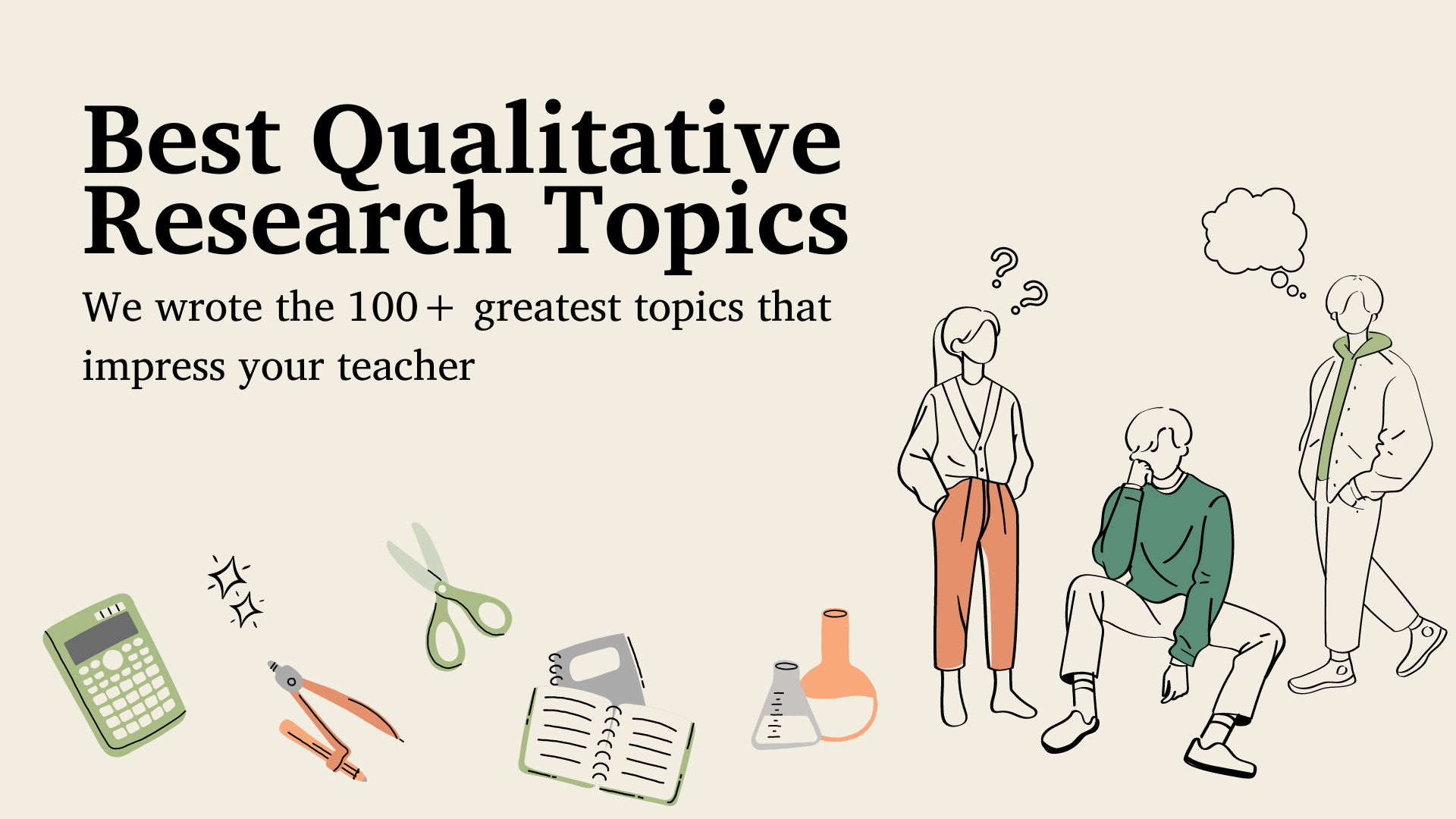
Do you have difficulty finding a qualitative research title for your project? If you are, you need not worry because you are not alone. However, there are many unique qualitative titles you can explore for your research. You just need a few qualitative research title examples to get you started. Qualitative research is focused on data obtained through a researcher’s first-hand observations, natural setting recording, artifacts, case studies, documents, questionnaires, and interviews. The findings in qualitative research are usually non-numerical. Also, it is common in humanities and social sciences. This post provides over 100 qualitative research topics you can consider.
- The Best Qualitative Research Topics That Impress the Teacher
Exceptional Qualitative Research Topics In Social Science
Qualitative research title examples for students, fantastic examples of qualitative research titles, good topics to start for qualitative research, qualitative research topics in education, quick examples of qualitative research topics, qualitative research topics in the philippines, qualitative researches topics about humanity & social science, great choices of qualitative research title examples, qualitative research topics for students to think about, our examples of the best qualitative research topics that impress the teacher.
An excellent research topic will help you earn a good grade. Consider any example of a qualitative research title from the following options:
- The impacts of social media on physical social engagement in society
- The benefits of treating mental disorders with medication
- The effects of Gender-Based Violence on women’s social lives in rural areas
- The decline of academic pursuit in third-world countries
- Sexual workers: the stigma they experience
- How has the promotion of feminist values influenced workplaces?
- Free education: its impact in third-world countries
- What is the correlation between education and success?
- Ableism: its effects on disabled people in society
- Food insecurity in third-world nations
The topic of your research paper can influence how easily you can conduct your study and draw conclusions.
Here are fantastic examples of qualitative research titles:
- Female harm: how it is influenced by culture
- The socioeconomic impacts of free education
- The link between food insecurity and poor performance in schools
- Alcoholism among college students: a critical study
- How to mitigate child labor in our society
- The root causes of child labor in Latin America
- The stigma of living with transmissive medical conditions
- The root cause of the stigma of people living with disabilities
- How to identify depression in small children
- Signs of autism in kids below two years old
Choosing a qualitative research topic is not a task you should take lightly because it can influence your performance. Here are some noteworthy qualitative research titles examples:
- Basic patient care policies in developing nations
- The impacts of alcoholism on education
- Adult learning: what does it entail?
- Homeschooling: Is it the latest trend after the pandemic?
- Does computer literacy influence the quality of education kids enjoy?
- How to effectively teach students with learning disabilities
- The relationship between poor education systems and crime rates in third-world countries
- Student bullying: the psychological impacts
- Should high school students go through university preparedness programs?
- research writing in high schools: its significance
Are you looking for qualitative research topic examples to start your study? Below are some creative examples to consider:
- Remote tests: are they as effective as in-class tests?
- The value of social activities in academic institutions
- Why should healthcare be free in all countries?
- The implications of racist laws on society
- The reception of COVID-19 vaccines and treatments
- What is the difference between foreign policies in first-world and third-world nations?
- Racism and Colorism: what is the difference?
- Dissecting the causes of low voter turnouts in the 21 st century
- The challenges of social media on kid’s brain development
- The inclusion of black women in American politics and its impacts
When competing with several brilliant minds, a good research topic can do you greatly. The following qualitative research examples titles are a great place to start:
- Should school uniforms be discarded for high schoolers?
- The need for equal representation in global politics
- The implications of police brutality on politics
- The role of parental care in foster kids
- The distinction between Islamic values and Christian values
- The correlation between political instability and migration
- Sex trafficking and violence against women: what is the link?
- How can global governments eradicate homelessness?
- Fraternities and sororities: are they still relevant?
- The role of literature in promoting societal changes
Qualitative research is popular in the education field and other social sciences. Choose a qualitative research title example on the subject of education from the following list:
- Effectively introducing foreign languages in the high school curriculum
- How can teachers help students with disabilities improve their learning?
- The link between social activities and comprehension among students
- Research writing in high schools: is it necessary?
- How has virtual learning influenced teacher-student relationships?
- The implications of allowing smartphones in classes
- Should all schools introduce sign language lessons in their curriculum?
- Student loans: their impacts on black students
- The impacts of race on college acceptance rates
- Poverty and education: what is the link?
- Ethnic and socioeconomic causes of poor school attendance in developing worlds
- Various teaching methods and their efficiency
- Efficient teaching methods for children below two years
- Why do students perform better in humanities than in sciences?
- The difference between college acceptance and completion in most nations
- Remote learning in developing countries
- What are the best ways of approaching bullying in schools?
- How do teachers promote inequality among students?
- Does social class influence academic performance negatively or positively?
- How do teachers shape their students’ personalities?
Coming up with a qualitative research title can be hard because of the numerous subject areas and the issue of uniqueness. Therefore, we have prepared the following qualitative title examples for you:
- How to promote oral learning in classrooms
- Political instability in developing countries: its economic impacts
- The impacts of weather on social activities
- Boredom and poor-decision making: the connection
- Exploring the connection between attachment types and love languages
- Socioeconomic impacts of instability on a country
- How does social media impact the perception of reality
- Reality TV shows: are they a true reflection of reality?
- How culture applies to different age groups
- Is social media influencing the loss of cultural values?
You can base your research topic on a specific region or nation, like the Philippines. A sample qualitative research title can get you started. You can pick a sample qualitative research title from the ideas below:
- Why are so many Philippines residents migrating to America?
- The impact of politics on migration in the Philippines
- How has violence led to food insecurity in rural areas in the Philippines?
- The Philippine education system: an overview
- How cultural norms influence social activities in the Philippines
- Gender roles in the Philippines society
- How popular Filipino cultures have served as agents of social change in the nation
- The link between male dominance and GBV in the Philippines
- Barriers to clean hygiene in health centers in the Philippines
- The spread of COVID in rural areas in the Philippines
Most top performers in research subjects attribute their success to choosing the best title for qualitative research. Here are some qualitative research topics about humanities and social science to promote good performance:
- The impact of poor market rivalry on supply and demand
- The role of parents in shaping kids’ morals
- Is social media the root cause of poor societal morals?
- How does alcohol impact a person’s normal behavior?
- How often should adults engage in sporting activities?
- Children’s eating habits and their influences
- Low socioeconomic backgrounds and their impacts on self-esteem
- The effect of the COVID-19 pandemic on the world’s views on viral diseases
- How can school-going kids manage depression
- Causes of mental challenges among school-going kids
Finding a good topic for qualitative research is a critical task that requires a lot of thought and research. However, we have simplified the process with the following qualitative topic ideas:
- Pop music and erratic youth behavior: is there a link?
- How do public figures influence cultures?
- Ideas for improving healthcare in developing nations
- Possible solutions for alleviating the food crisis in developing nations
- New ways of mitigating viral diseases
- Social media trends among the elderly
- Quarantine as a mitigation approach for infectious diseases
- Promoting social justice in patriarchal societies
- Worrying trends among the young population
- Emerging marketing trends in 2023
Qualitative research for college and high school students helps improve reading, writing, and intellectual skills. Here are some qualitative research examples and topic ideas for students :
- How to detect and prevent natural disasters beforehand
- Can the whole world have the same education system?
- What is the most effective therapy for patients recuperating from brain surgery?
- Possible solutions for promoting ethical practices in telehealth
- Can addicts overcome addiction without therapy?
- The latest technology trends and their impacts?
- How can global governments promote mental health awareness?
- Have smartphones caused reduced attention spans among users?
- Sexual violence in rural areas
- The introduction of Islam in African nations
We Are Here for You
Qualitative research is an investigative analysis of intangible or inexact data, mostly non-numerical. The title of qualitative research you choose will guide your entire research process and influence its conclusions. Do you need a paper or an example of a research title qualitative topic? Our expert team is ready to write it for you.
Leave a Reply Cancel reply
210 Qualitative Research Topics for Students To Consider
Table of Contents
Usually, while pursuing a course, you will be either asked to conduct qualitative or quantitative research and submit a detailed thesis or dissertation on a particular topic relevant to your subject or university guidelines. But no matter whether it is quantitative or qualitative research, a good topic is needed the most for academic paper preparation. In case, you are looking for the best qualitative research topics, then this blog will be more helpful to you. Here, we have presented an overview of qualitative research along with a list of 200+ unique qualitative research paper topics and ideas on different subjects.
Explore this blog to get an amazing idea.
What is a Qualitative Research?
Qualitative research is a type of research that involves non-numerical data collection and analysis for the understanding of certain concepts, experiences, or opinions. The ultimate aim of qualitative research is to get a deep understanding of an event or a situation through firsthand experience, reliable reporting, and quotations from actual conversations. Moreover, to collect raw data for your research process, you can conduct surveys, observations, interviews, or implement any other innovative methods on your topic of study.
Qualitative Research Topics and Ideas List
As said earlier, for the preparation of a qualitative research paper, a good topic is essential. In case, you are confused about what topic to choose for your qualitative research paper, feel free to go through the list of 200+ ideas shared below and pick any topic that is convenient for you to perform qualitative research and write about.
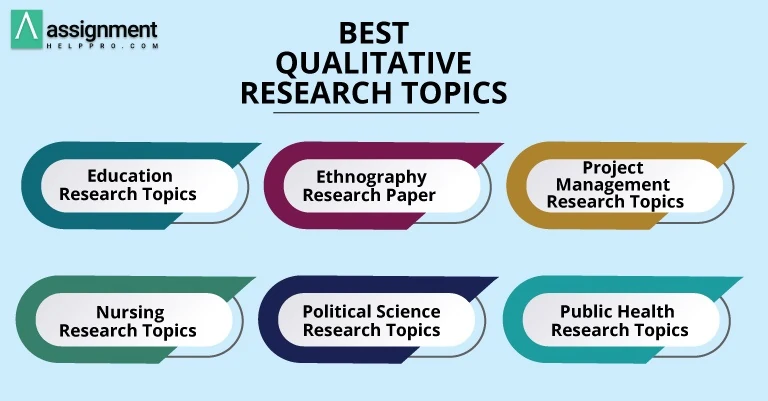
Educational Qualitative Research Topics
- Food insecurity and child education
- Understanding adult learning
- The efficient learning style for autistic children
- The importance of computer literacy
- The importance of mental health education in the school curriculum
- The effects of alcoholism on education
- How does virtual learning affect high school students?
- Disadvantages of homeschooling
- The need to encourage adult education
- The impacts of computer literacy on education
Extra Qualitative Research Topics on Education
- Significance of school uniform to learning
- The importance of guidance and counseling in schools
- The impacts of the poor educational system
- Psychological impacts of student bullying
- The importance of research writing in schools
- Easy ways to master foreign languages for students in high school.
- The importance of social activities in schools
- How do smartphones affect students’ academic performance in the academic system?
- How to teach and improve the learning abilities of ADHD students
- The negative impacts of student loans
- What is the level of academic preparedness of university students?
- Ethnic and socioeconomic reasons for poor school attendance in developing countries
- Discuss the role of teachers in multicultural education.
- How to improve oral learning in classrooms
- The importance of reading to preschoolers
- The importance of research writing in schools.
- The effects of alcoholism on education.
- Disadvantages of homeschooling.
- Discuss the essentialities of prayers in school
Ethnography Qualitative Research Paper Topics
- Discuss the challenges transgender people undergo within and outside the LGBTQ+ community.
- The relationship that exists between political instability and migration
- Evaluating the role of parental care and the lack of it thereof in the lives of some foster kids
- Analyze the socioeconomic impacts of instability on a nation.
- How does sexual violence in rural areas affect the psychological well-being of the women and girls in such a locality?
- An insight into the primary causes of the swift migration happening from Africa to Europe.
- Explore the link between violence against women and sex trafficking.
- An overview of the rise of oral literature study in literature.
- How do social media distort the perception of reality?
- Outline some of the challenges of Muslims in Africa.
- Understanding the effects of Gender-Based Violence (GBV) in rural areas and how this negatively impacts women in such areas
- Benefits of engaging in social activities for depressed people and those struggling with certain mental health challenges
- Displacement and its accompanying effects: a look into the mental health of homeless people
- How culture contributes to female harm in the society
A Few More Qualitative Research Ideas on Ethnography
- The impacts of Westernization on human perception.
- How does male dominance breed male violence?
- How does literature contribute to changing the world?
- Understanding the effects of female genitalia mutilation in girls
- The importance of books in the lives of children in rural areas.
- How does violence breed housing and food insecurity?
- The role of the smartphone in our deteriorating attention span
- Discuss the leniency of the practice of Islam in foreign spaces.
- A study into the ways through which government enables homelessness
- A study into the importance of fraternities and sororities.
- The role of capitalism in generating food insecurity
- The place of social and academic practices in uplifting a society
- Rethinking consumer appraisals and motivations
- Transforming virtual ethnography into a modernized form.
- Observing a group of children playing.
- Observing employees in a corporate office.
- Observing medical personnel in a high-volume hospital.
- Observing an Indigenous village
- What are the long-term planning methods for efficient project management?
- Why there is a huge significance of time management for the setting of goals?
- Evaluating the levels of nursing professionals’ satisfaction in private hospitals in the US.
- Long-term planning methods for better project management.
- How to deal with issues during a project implementation program.
Qualitative Project Management Research Topics
- The impacts of financial management in the country and how it benefits citizens.
- The root causes of the lack of medical insurance and possible ways to curb it.
- Dealing with a backlash during a project implementation program.
- The importance of developing healthy customer-client relationships
- Foreign policy and its impact on developing industrial complexes.
- How to ensure effective budget planning
- Why managers should be flexible and apt in their decisions
- The role of strategy in enhancing business management.
- The efficient ways of regulating revenue distribution.
- Various means of relieving pressure for tight project deadlines.
- Analysis of the cost-effectiveness of manufacturing learning centers in urban areas.
- An investigation into the current cost of living in society and how this is propagated by capitalism.
- Design process and management of geolocators.
- The assessment of the contributing factors that lead to failed healthcare systems in rural areas
- The need to create a more inclusive healthcare system
- Plausible ways through which food insecurity can be handled within a given society.
- Design a system for building an online regulated parking system.
- How to set up an operation pest control activity in a society
- The benefits of building communication masts in rural areas
- Understanding the essence of time management in goal setting
- The best way to carry out the facility life cycle costing.
- The contemporary approaches used in project management.
Nursing Qualitative Research Paper Topics
- How do social processes influence patient behavior?
- How to identify Alzheimer’s in older patients
- Basics of patient care
- The efficacy of a particular medication to a patient
- Unique attributes of a culture that determines a patient’s success rate
- The feminist empiricism perspective of the nursing profession
- How to help patients with mental disorders
- How nurses can handle cardiovascular challenges
- Difference between workloads of ICU nurses and OR nurses
- Environmental factors that necessitate quicker patient recover
Read more: Great Nursing Research Topics for Impressive Content
Additional Qualitative Research Topics on Nursing
- Understanding how to deal with pregnant women and emergencies
- Pros & cons of Nurses’ drug prescription
- The effective ways to carry out health outreach programs
- How to take care of the elderly
- How to assist rape survivors
- Bipolar symptoms in young adults
- The role of nurses and healthcare corporations
- The benefits of immunization in rural areas
- Care for hypertensive patients with diabetes
- Why are compassion and sensitivity important for nurses?
- Patient care in psychiatric units
- First aid treatments for gun victims
- Intensive care for visually and verbally impaired patients
- Signs of Depression and anxiety in patients
- How to curb drug abuse
Qualitative Research Topics on Political Science
- Racism as a dividing factor in America
- Understanding neoliberalism and how it impacts our activities in the society
- The negative impacts of peace war in affected countries
- Dissect the causes of the election crisis
- The negative impacts of misrepresentation
- The role of feminism in enhancing American politics
- The need for a free polling system to encourage free and fair voting practices
- The role of mass media in promoting and scrutinizing politics
- The distinction between Liberalism and Conservatism and the places where they merge
- Segregation and racist laws
- The effects of capitalism on America’s health system.
- The abortion regulation bill and its effects
- Address Police Brutality in America
- Discuss the effects of American incarceration.
- The inclusion of Black women in American politics.
Qualitative Research Paper Topics on Public Health
- Preventative methods for flu during cold seasons
- Ideas for quitting cigarettes and alcohol
- How to achieve affordable healthcare in low-income societies
- Ways to create awareness about breast cancer
- Programs for community-based sanitization
- Techniques of making eco-friendly facemasks
- Effective obesity management strategies for the young
- Causes of malnutrition in young children
- The need to properly manage the source of our waste products disposal
- Poorly maintained public hospitals and their effects
- The difference between an epidemic and a pandemic
- How to properly manage to live with diabetes type II
- Barriers to clean hygiene in health centers
- The importance of safe menstrual care for girls
- Factors generating health issues in pregnant women
- Understanding the health challenges of the lack of drinkable water in a community
- The importance of post-natal to nursing mothers
- The role of finance in propagating an inclusive and efficient healthcare system.
- Control of the prevalence of drug and substance abuse
- The benefits of exercise to obese people
Best Qualitative Research Ideas
- The advantages of online learning over physical learning
- Can we detect and prevent natural disasters before they occur?
- How often should one engage in sporting activities?
- How have businesses transitioned into online digital marketing?
- The influence of pop music on erratic youth behavior
- Is it possible to have the same education system throughout the whole world?
- The impact of unhealthy market completion on supply and demand
- Evaluate the performance of mixed schools over single-gender schools.
- The effects of developing introverted behavior
- Self-esteem among people from low socioeconomic backgrounds
- Management of depression among school-going children
- Approaches to improving maternal healthcare in developing countries
- Effective strategies that can help curb the problem of cyberbullying
- Worrying trends among the aging population
- The latest newsgathering technologies and their effectiveness
- Emerging trends in digital media
- Is preschool education necessary for children under the age of four years?
- Overcoming addictions through sharing with others
- Understanding the key roles of healthy eating habits
- Working government policies on protocol observance
Read more: Excellent Case Study Topics for College Students to Think About
Trending Qualitative Research Paper Topics
- The influence of pop music on erratic youth behavior.
- How does ableism affect disabled people in our society?
- Understanding the stigma of living with disabilities
- Discuss the rate at which the ozone layer is depleting.
- How virtual reality worlds are transforming society
- Understanding the effects of Gender-Based Violence (GBV) in rural areas
- Benefits of Pro Bono services to the less privileged
- Understanding the intricacies of food banks in low-income neighborhoods
- How culture contributes to female harm in society?
- Causes of the stigma that surrounds certain health challenges
- New strategies to reduce the spread of infectious illnesses
- Explain how startup companies use digital marketing in their operations.
- Trends among the aging population that are concerning
- Quarantine’s significance in the spread of infectious illnesses
- How may patriarchal societies advance social equity?
Miscellaneous Qualitative Research Paper Ideas
- Effective measures to combat the issue of cyberbullying
- How can teachers establish a personal connection with each of their students?
- The role of academic and social activities in improving a society
- employing resources at hand to establish a centralized community
- Opportunities to develop management strategies and skills
- Discuss the importance of palliative care and EBP (evidence-based practice) for adult patients with terminal diseases
- Analysis of the Role of substance abuse and Use of illicit drugs in Teenage and College student’s life
- Explain the religious norms, laws, boundaries, and religious crimes in terms of developed and developing countries
- Discuss the way there should be different strategies primary and secondary school teachers can apply to manage children with attention deficit hyperactivity disorder (ADHD)
- Discuss the barrier children with autism face in learning and how teachers should cater to the needs of such students in their class
- Discuss the kind of subjugation women experience in developed countries where gender-based domestic violence no longer exists
- Describe the ways to handle and manage a business by getting out of the challenges given by geographical variations in a nation
- Identify and analyze the importance of SCM (supply and chain management)and how it can be seen by applying the supply and demand theory
- Why there is an urgent need to undertake effective measures to check the growth of the emissions of CO2 and other GHG (greenhouse gas) in the environment?
- Psychology is a discipline that is very crucial for the proper development of a rational being: Explain with justifications
Engaging Qualitative Research Paper Topics
- Does free education have socioeconomic benefits?
- Explain the impact of Plato’s philosophy on mathematics.
- What are the main influences on eating habits in children?
- How to reduce violence in sports.
- Analyze the effectiveness of Apple and Windows products in the Globe.
- Write about sexual misconduct in colleges.
- What are the effective ways to resolve conflicts in the workplace?
- Discuss the application of AI in project management.
- How to eliminate corruption in developing countries.
- Why is job satisfaction important in brand management?
Final Words
The above-suggested list of topics will definitely help you to write an excellent qualitative research paper. If you find it difficult to write an academic essay or research paper, then contact us immediately. We have a team of professional research paper help experts on our platform to assist you in delivering a high-quality, original essay deserving of top grades. Without any hesitation, place your order by writing your requirements to us and receive instant academic assistance beyond your expectations at an affordable price.

Related Post

220 Amazing Religious Research Paper Topics and Ideas

Read and Understand How to Write a Research Proposal

100+ Controversial Research Topics and Ideas to Focus On
About author.
Jacob Smith
I am an Academic Writer and have affection to share my knowledge through posts’. I do not feel tiredness while research and analyzing the things. Sometime, I write down hundred of research topics as per the students requirements. I want to share solution oriented content to the students.
Leave a Reply Cancel reply
You must be logged in to post a comment.
- Featured Posts
140 Unique Geology Research Topics to Focus On
200+ outstanding world history topics and ideas 2023, 190 excellent ap research topics and ideas, 150+ trending group discussion topics and ideas, 170 funny speech topics to blow the minds of audience, who invented exams learn the history of examination, how to focus on reading 15 effective tips for better concentration, what is a rhetorical analysis essay and how to write it, primary school teacher in australia- eligibility, job role, career options, and salary, 4 steps to build a flawless business letter format, get help instantly.
Raise Your Grades with Assignment Help Pro

161+ Exciting Qualitative Research Topics For STEM Students

Are you doing Qualitative research? Looking for the best qualitative research topics for stem students? It is a most interesting and good field for research. Qualitative research allows STEM (Science, Technology, Engineering, and Mathematics) students to delve deeper into complex issues, explore human behavior, and understand the intricacies of the world around them.
In this article, we’ll provide you with an extensive list of 161+ qualitative research topics tailored to STEM students. We’ll also explore how to find and choose good qualitative research topics, and why these topics are particularly beneficial for students, including those in high school.
Also Like To Read: 171+ Brilliant Quantitative Research Topics For STEM Students
Table of Contents
What Are Qualitative Research Topics for STEM Students
Qualitative research topics for stem students are questions or issues that necessitate an in-depth exploration of people’s experiences, beliefs, and behaviors. STEM students can use this approach to investigate societal impacts, ethical dilemmas, and user experiences related to scientific advancements and innovations.
Unlike quantitative research, which focuses on numerical data and statistical analysis, qualitative research delves into the ‘whys’ and ‘hows’ of a particular phenomenon.
How to Find and Choose Good Qualitative Research Topics
Selecting qualitative research topics for stem students is a crucial step in the research process. Here are some tips to help you find and choose a suitable topic:
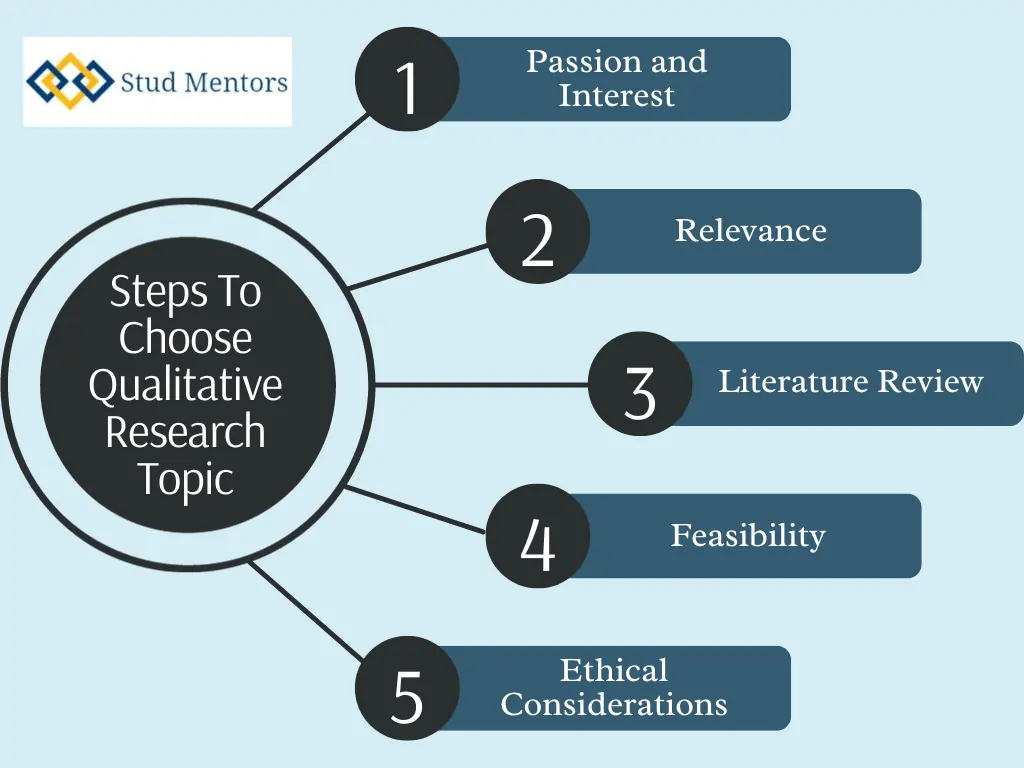
- Passion and Interest: Start by considering your personal interests and passions. What topics within STEM excite you? Research becomes more engaging when you’re genuinely interested in the subject.
- Relevance: Choose qualitative research topics for stem students. Look for gaps in the existing knowledge or unanswered questions.
- Literature Review: Conduct a thorough literature review to identify the latest trends and areas where qualitative research is lacking. This can guide you in selecting a topic that contributes to the field.
- Feasibility: Ensure that your chosen topic is feasible within the resources and time constraints available to you. Some research topics may require extensive resources and funding.
- Ethical Considerations: Be aware of ethical concerns related to your qualitative research topics for stem students, especially when dealing with human subjects or sensitive issues.
Here are the most exciting and very interesting Qualitative Research Topics For STEM Students, high school students, nursing students, college students, etc.
Biology Qualitative Research Topics
- Impact of Ecosystem Restoration on Biodiversity
- Ethical Considerations in Human Gene Editing
- Public Perceptions of Biotechnology in Agriculture
- Coping Mechanisms and Stress Responses in Marine Biologists
- Cultural Perspectives on Traditional Herbal Medicine
- Community Attitudes Toward Wildlife Conservation Efforts
- Ethical Issues in Animal Testing and Research
- Indigenous Knowledge and Ethnobotany
- Psychological Well-being of Conservation Biologists
- Attitudes Toward Endangered Species Protection
Chemistry Qualitative Research Topics For STEM Students
- Adoption of Green Chemistry Practices in the Pharmaceutical Industry
- Public Perception of Chemical Safety in Household Products
- Strategies for Improving Chemistry Education
- Art Conservation and Chemical Analysis
- Consumer Attitudes Toward Organic Chemistry in Everyday Life
- Ethical Considerations in Chemical Waste Disposal
- The Role of Chemistry in Sustainable Agriculture
- Perceptions of Nanomaterials and Their Applications
- Chemistry-Related Career Aspirations in High School Students
- Cultural Beliefs and Traditional Chemical Practices
Physics Qualitative Research Topics
- Gender Bias in Physics Education and Career Progression
- Philosophical Implications of Quantum Mechanics
- Public Understanding of Renewable Energy Technologies
- Influence of Science Fiction on Scientific Research
- Perceptions of Dark Matter and Dark Energy in the Universe
- Student Experiences in High School Physics Classes
- Physics Outreach Programs and Their Impact on Communities
- Cultural Variations in the Perception of Time and Space
- Role of Physics in Environmental Conservation
- Public Engagement with Science Through Astronomy Events
Engineering Qualitative Research Topics For STEM Students
- Ethics in Artificial Intelligence and Robotics
- Human-Centered Design in Engineering
- Innovation and Sustainability in Civil Engineering
- Public Perception of Self-Driving Cars
- Engineering Solutions for Climate Change Mitigation
- Experiences of Women in Male-Dominated Engineering Fields
- Role of Engineers in Disaster Response and Recovery
- Ethical Considerations in Technology Patents
- Perceptions of Engineering Education and Career Prospects
- Students Views on the Role of Engineers in Society
Computer Science Qualitative Research Topics
- Gender Diversity in Tech Companies
- Ethical Implications of AI-Powered Decision-Making
- User Experience and Interface Design
- Cybersecurity Awareness and Behaviors
- Digital Privacy Concerns and Practices
- Social Media Use and Mental Health in College Students
- Gaming Culture and its Impact on Social Interactions
- Student Attitudes Toward Coding and Programming
- Online Learning Platforms and Student Satisfaction
- Perceptions of Artificial Intelligence in Everyday Life
Mathematics Qualitative Research Topics For STEM Students
- Gender Stereotypes in Mathematics Education
- Cultural Variations in Problem-Solving Approaches
- Perception of Math in Everyday Life
- Math Anxiety and Coping Mechanisms
- Historical Development of Mathematical Concepts
- Attitudes Toward Mathematics Among Elementary School Students
- Role of Mathematics in Solving Real-World Problems
- Homeschooling Approaches to Teaching Mathematics
- Effectiveness of Math Tutoring Programs
- Math-Related Stereotypes in Society
Environmental Science Qualitative Research Topics
- Local Communities’ Responses to Climate Change
- Public Understanding of Conservation Practices
- Sustainable Agriculture and Farmer Perspectives
- Environmental Education and Behavior Change
- Indigenous Ecological Knowledge and Biodiversity Conservation
- Conservation Awareness and Behavior of Tourists
- Climate Change Perceptions Among Youth
- Perceptions of Water Scarcity and Resource Management
- Environmental Activism and Youth Engagement
- Community Responses to Environmental Disasters
Geology and Earth Sciences Qualitative Research Topics For STEM Students
- Geologists’ Risk Perception and Decision-Making
- Volcano Hazard Preparedness in At-Risk Communities
- Public Attitudes Toward Geological Hazards
- Environmental Consequences of Extractive Industries
- Perceptions of Geological Time and Deep Earth Processes
- Use of Geospatial Technology in Environmental Research
- Role of Geology in Disaster Preparedness and Response
- Geological Factors Influencing Urban Planning
- Community Engagement in Geoscience Education
- Climate Change Communication and Public Understanding
Astronomy and Space Science Qualitative Research Topics
- The Role of Science Communication in Astronomy Education
- Perceptions of Space Exploration and Colonization
- UFO and Extraterrestrial Life Beliefs
- Public Understanding of Black Holes and Neutron Stars
- Space Tourism and Future Space Travel
- Impact of Space Science Outreach Programs on Student Interest
- Cultural Beliefs and Rituals Related to Celestial Events
- Space Science in Indigenous Knowledge Systems
- Public Engagement with Astronomical Phenomena
- Space Exploration in Science Fiction and Popular Culture
Medicine and Health Sciences Qualitative Research Topics
- Patient-Physician Communication and Trust
- Ethical Considerations in Human Cloning and Genetic Modification
- Public Attitudes Toward Vaccination
- Coping Strategies for Healthcare Workers in Pandemics
- Cultural Beliefs and Health Practices
- Health Disparities Among Underserved Communities
- Medical Decision-Making and Informed Consent
- Mental Health Stigma and Help-Seeking Behavior
- Wellness Practices and Health-Related Beliefs
- Perceptions of Alternative and Complementary Medicine
Psychology Qualitative Research Topics
- Perceptions of Body Image in Different Cultures
- Workplace Stress and Coping Mechanisms
- LGBTQ+ Youth Experiences and Well-Being
- Cross-Cultural Differences in Parenting Styles and Outcomes
- Perceptions of Psychotherapy and Counseling
- Attitudes Toward Medication for Mental Health Conditions
- Psychological Well-being of Older Adults
- Role of Cultural and Social Factors in Psychological Well-being
- Technology Use and Its Impact on Mental Health
Social Sciences Qualitative Research Topics
- Political Polarization and Online Echo Chambers
- Immigration and Acculturation Experiences
- Educational Inequality and School Policy
- Youth Engagement in Environmental Activism
- Identity and Social Media in the Digital Age
- Social Media and Its Influence on Political Beliefs
- Family Dynamics and Conflict Resolution
- Social Support and Coping Strategies in College Students
- Perceptions of Cyberbullying Among Adolescents
- Impact of Social Movements on Societal Change
Interesting Sociology Qualitative Research Topics For STEM Students
- Perceptions of Racial Inequality and Discrimination
- Aging and Quality of Life in Elderly Populations
- Gender Roles and Expectations in Relationships
- Online Communities and Social Support
- Cultural Practices and Beliefs Related to Marriage
- Family Dynamics and Coping Mechanisms
- Perceptions of Community Safety and Policing
- Attitudes Toward Social Welfare Programs
- Influence of Media on Perceptions of Social Issues
- Youth Perspectives on Education and Career Aspirations
Anthropology Qualitative Research Topics
- Traditional Knowledge and Biodiversity Conservation
- Cultural Variation in Parenting Practices
- Indigenous Language Revitalization Efforts
- Social Impacts of Tourism on Indigenous Communities
- Rituals and Ceremonies in Different Cultural Contexts
- Food and Identity in Cultural Practices
- Traditional Healing and Healthcare Practices
- Indigenous Rights and Land Conservation
- Ethnographic Studies of Marginalized Communities
- Cultural Practices Surrounding Death and Mourning
Economics and Business Qualitative Research Topics
- Small Business Resilience in Times of Crisis
- Workplace Diversity and Inclusion
- Corporate Social Responsibility Perceptions
- International Trade and Cultural Perceptions
- Consumer Behavior and Decision-Making in E-Commerce
- Business Ethics and Ethical Decision-Making
- Innovation and Entrepreneurship in Startups
- Perceptions of Economic Inequality and Wealth Distribution
- Impact of Economic Policies on Communities
- Role of Economic Education in Financial Literacy
Good Education Qualitative Research Topics For STEM Students
- Homeschooling Experiences and Outcomes
- Teacher Burnout and Coping Strategies
- Inclusive Education and Special Needs Integration
- Student Perspectives on Online Learning
- High-Stakes Testing and Its Impact on Students
- Multilingual Education and Bilingualism
- Perceptions of Educational Technology in Classrooms
- School Climate and Student Well-being
- Teacher-Student Relationships and Their Effects on Learning
- Cultural Diversity in Education and Inclusion
Environmental Engineering Qualitative Research Topics
- Sustainable Transportation and Community Preferences
- Ethical Considerations in Waste Reduction and Recycling
- Public Attitudes Toward Renewable Energy Projects
- Environmental Impact Assessment and Community Engagement
- Sustainable Urban Planning and Neighborhood Perceptions
- Water Quality and Conservation Practices in Residential Areas
- Green Building Practices and User Experiences
- Community Resilience in the Face of Climate Change
- Role of Environmental Engineers in Disaster Preparedness
Why Qualitative Research Topics Are Good for STEM Students
- Deeper Understanding: Qualitative research encourages STEM students to explore complex issues from a human perspective. This deepens their understanding of the broader impact of scientific discoveries and technological advancements.
- Critical Thinking: Qualitative research fosters critical thinking skills by requiring students to analyze and interpret data, consider diverse viewpoints, and draw nuanced conclusions.
- Real-World Relevance: Many qualitative research topics have real-world applications. Students can address problems, inform policy, and contribute to society by investigating issues that matter.
- Interdisciplinary Learning: Qualitative research often transcends traditional STEM boundaries, allowing students to draw on insights from psychology, sociology, anthropology, and other fields.
- Preparation for Future Careers: Qualitative research skills are valuable in various STEM careers, as they enable students to communicate complex ideas and understand the human and social aspects of their work.
Qualitative Research Topics for High School STEM Students
High school STEM students can benefit from qualitative research by honing their critical thinking and problem-solving skills. Here are some qualitative research topics suitable for high school students:
- Perceptions of STEM Education: Investigate students’ and teachers’ perceptions of STEM education and its effectiveness.
- Environmental Awareness: Examine the factors influencing high school students’ environmental awareness and eco-friendly behaviors.
- Digital Learning in the Classroom: Explore the impact of technology on learning experiences and student engagement.
- STEM Gender Gap: Analyze the reasons behind the gender gap in STEM fields and potential strategies for closing it.
- Science Communication: Study how high school students perceive and engage with popular science communication channels, like YouTube and podcasts.
- Impact of Extracurricular STEM Activities: Investigate how participation in STEM clubs and competitions influences students’ interest and performance in science and technology.
In essence, these are the best qualitative research topics for STEM students in the Philippines and are usable for other countries students too. Qualitative research topics offer STEM students a unique opportunity to explore the multifaceted aspects of their fields, develop essential skills, and contribute to meaningful discoveries. With the right topic selection, a strong research design, and ethical considerations, STEM students can easily get the best knowledge on exciting qualitative research that benefits both their career growth. So, choose a topic that resonates with your interests and get best job in your interest field.
Leave a Reply Cancel reply
Your email address will not be published. Required fields are marked *
Save my name, email, and website in this browser for the next time I comment.
599+ Engaging And Amazing Qualitative Research Ideas

Hey there, Researchers! Ready to explore fascinating ideas on qualitative research? We’ve got something special for you – a collection of 599+ Engaging and Amazing Qualitative Research Ideas! Ever wondered what makes people tick, or why we make certain choices? These research ideas are like a treasure, offering insights into real-life experiences and behaviors.
From understanding the impact of online learning to exploring the dynamics of friendships, these ideas cover a range of topics you can relate to. No boring things here – just simple, interesting ideas that might spark your curiosity. So, if you’ve ever been curious about the world around you and want to explore it in a cool way, dive into these research ideas and discover the fun side of learning.
What Is Qualitative Research?
Table of Contents
Qualitative research is a method of inquiry that explores and understands complex phenomena by examining the subjective experiences, perspectives, and behaviors of individuals and groups. It is a way to dive into the richness and depth of human experiences, providing insights that go beyond numbers and statistics.

Key Characteristics of Qualitative Research
- In-depth Exploration: Qualitative research aims to understand the depth and nuances of a particular subject or phenomenon.
- Subjectivity and Context: It focuses on the subjective interpretations and contextual factors that influence human behavior.
- Open-ended Questions: Researchers use open-ended questions to encourage participants to share their thoughts and experience.
- Flexible and Iterative: The research design can evolve during the study based on emerging insights.
- Small Sample Sizes: Qualitative studies often involve smaller groups to allow for detailed exploration.
Common Methods in Qualitative Research
- Interviews: One-on-one conversations allow participants to express their views in detail.
- Focus Groups: Group discussions help capture diverse perspectives and interactions.
- Observations: Researchers observe and record behaviors in natural settings.
- Content Analysis: Systematic analysis of text, audio, or visual materials to identify patterns and themes.
Applications of Qualitative Research
- Social Sciences: Understand human behavior, culture, and societal phenomena.
- Healthcare: Explore patient experiences, perceptions, and healthcare practices.
- Business: Investigate consumer behavior, market trends, and organizational culture.
- Education: Examine teaching methods, student experiences, and educational environments.
Qualitative research provides a complete and in-depth understanding of the complexities of human experiences and social phenomena, making it a valuable approach across various disciplines.
599+ Engaging and Amazing Qualitative Research Ideas
Top 20 qualitative research ideas on impact of online learning on student engagement.
- Perceived Effectiveness of Online Learning Platforms
- Student Motivation in Virtual Classroom Environments
- Digital Literacy Skills and Online Learning Success
- Influence of Teacher-Student Interaction on Engagement
- Impact of Assessment Methods on Student Participation
- Technological Barriers to Online Learning Accessibility
- Student Preferences for Synchronous vs. Asynchronous Learning
- Emotional Well-being and Connection in Virtual Classrooms
- Role of Peer Interaction in Online Learning Engagement
- Strategies to Enhance Online Learning Engagement
- Impact of Online Learning on Study Habits and Time Management
- Student Perception of Collaborative Projects in Virtual Settings
- Online Learning and Its Influence on Academic Performance
- Instructor Feedback and Its Role in Motivating Students
- Factors Affecting Attention Span in Virtual Learning Environments
- Student Satisfaction with Online Learning Resources
- The Role of Multimedia in Capturing Student Interest
- Online Learning and its Impact on Social Interaction Skills
- Exploring Student Adaptability to Technological Changes
- Relationship Between Course Content Relevance and Engagement
Top 20 Research Ideas On Perceptions of Diversity and Inclusion in Educational Settings
- Student Attitudes Towards Inclusive Curriculum
- Faculty and Staff Perspectives on Diversity Initiatives
- Impact of Inclusive Teaching Practices on Classroom Dynamics
- Cultural Competency Training and Its Influence on Educators
- Student Experiences with Diverse Peer Interactions
- Evaluation of Diversity Programs in Educational Institutions
- Perceptions of Racial and Ethnic Representation in Curriculum
- Role of Inclusive Language in Fostering a Welcoming Environment
- Inclusive Education and its Effect on Student Academic Performance
- Teacher Perception of LGBTQ+ Inclusivity in the Classroom
- Student Awareness of Diversity and Inclusion Policies
- Intersectionality in Educational Settings: Challenges and Opportunities
- Perspectives on Access to Resources for Diverse Student Groups
- Influence of Diverse Faculty on Student Success
- Student Experiences with Anti-Bullying and Inclusion Programs
- Parental Involvement in Promoting Diversity in Schools
- Impact of Inclusive Extracurricular Activities on Student Engagement
- Evaluating the Effectiveness of Diversity Workshops for Educators
- Student Perceptions of Microaggressions in Educational Settings
- Accessibility of Special Education Programs for Diverse Learners
Top 20 Research Ideas On Experiences of Remote Work and Job Satisfaction
- Impact of Remote Work on Employee Productivity
- Employee Work-Life Balance in Remote Work Environments
- Remote Work and its Influence on Job Satisfaction
- Technological Challenges Faced by Remote Workers
- Communication Strategies for Remote Team Collaboration
- Effects of Remote Work on Employee Well-being
- Remote Work and the Perception of Job Security
- Employee Satisfaction with Virtual Team Building Activities
- Influence of Remote Work on Career Advancement Opportunities
- Remote Work and its Impact on Organizational Culture
- Strategies for Managing Remote Work Stress and Burnout
- Employee Perception of Work-Life Integration in Virtual Settings
- Remote Work and its Effect on Employee Creativity and Innovation
- Evaluation of Remote Work Policies and Flexibility
- Impact of Remote Work on Employee Social Connection
- Challenges of Remote Onboarding and Integration
- Remote Work and Employee Professional Development Opportunities
- Remote Work and its Effect on Team Dynamics and Collaboration
- Employee Satisfaction with Remote Work Equipment and Resources
- Influence of Remote Work on Employee Job Commitment and Loyalty
Top 20 Qualitative Research Ideas On Attitudes Towards Sustainable Living Practices
- Perceptions of Eco-Friendly Consumer Behavior
- Motivations for Adopting Sustainable Lifestyle Choices
- Cultural Influences on Attitudes Towards Sustainability
- Eco-conscious Decision-Making in Daily Life
- Knowledge and Awareness of Sustainable Practices
- Barriers to Implementing Sustainable Living Habits
- Role of Social Media in Shaping Sustainable Attitudes
- Attitudes Towards Sustainable Products and Packaging
- Influence of Education on Sustainable Behavior
- Community Engagement in Sustainable Initiatives
- Perceived Benefits of Adopting Green Technologies
- Impact of Sustainable Living on Mental Well-being
- Generational Differences in Attitudes Toward Sustainability
- Evaluation of Corporate Sustainability Initiatives
- Role of Government Policies in Shaping Attitudes
- Community Perceptions of Renewable Energy Sources
- Attitudes Towards Sustainable Transportation Methods
- Incentives and Rewards for Sustainable Practices
- Role of Social Norms in Shaping Sustainable Behavior
- Perspectives on Balancing Convenience and Sustainability
Top 20 Research Ideas On Coping Mechanisms in Times of Stress and Uncertainty
- Adaptive Coping Strategies in Response to Personal Stress
- Role of Social Support in Coping with Uncertainty
- Effect of Mindfulness Practices on Stress Management
- Coping Mechanisms Used by Frontline Workers During Crisis
- Emotional Regulation Techniques in Stressful Situations
- Coping Strategies Among Students During Academic Pressure
- Resilience Building in the Face of Uncertainty
- Coping Mechanisms Used by Healthcare Professionals in High-Stress Environments
- Influence of Hobbies and Leisure Activities on Stress Relief
- Coping Strategies Among Parents During Family Stressors
- Perception of Coping Resources in Times of Crisis
- Coping Mechanisms Among Individuals Facing Economic Uncertainty
- Impact of Spiritual or Religious Practices on Coping
- Coping Strategies for Managing Work-Related Stress
- Resilience Factors Among Individuals Experiencing Major Life Changes
- Effectiveness of Cognitive-Behavioral Coping Techniques
- Coping Strategies Among Adolescents Dealing with Peer Pressure
- Cultural Variations in Coping Mechanisms
- Coping Strategies for Dealing with Information Overload
- Coping Mechanisms Used by Individuals Navigating Personal Transitions
Top 20 Research Ideas On Exploration of Gender Roles in Modern Society
- Changing Dynamics of Gender Roles in the Workplace
- Perception of Gender Roles in Educational Settings
- Impact of Media on Shaping Gender Stereotypes
- Gender Roles in Parenting and Family Dynamics
- Influence of Cultural Norms on Gender Expectations
- Role of Gender in Leadership and Decision-Making
- Representation of Gender Roles in Popular Culture
- Attitudes Towards Non-Traditional Gender Roles
- Gender Roles and Mental Health Stigma
- Intersectionality: Exploring Overlapping Gender Identities
- Gender Roles in the Tech and STEM Industries
- Evolution of Gender Roles in Romantic Relationships
- Gendered Expectations in Sports and Physical Activities
- Balancing Career Aspirations with Traditional Gender Roles
- Impact of Education on Challenging Gender Norms
- Exploration of Gender Roles in LGBTQ+ Communities
- Media Portrayal of Transgender and Non-Binary Individuals
- Attitudes Towards Gender Equality Policies in the Workplace
- Perception of Gender Roles in Political Leadership
- Influence of Social Movements on Changing Gender Roles
Top 20 Qualitative Research Ideas On Social Media Usage Patterns and Self-Image
- Impact of Social Media on Body Image Recognition
- Comparison and Envy in Relation to Social Media Use
- Impact of Social Media on Self-Esteem and Confidence
- Social Media’s Role in Shaping Beauty Standards
- Self-Presentation Strategies on Different Social Media Platforms
- Exploration of Cyberbullying and its Effect on Self-Image
- Relationship Between Social Media Filters and Self-Perception
- Social Media’s Impact on Identity Formation in Adolescents
- Influence of Likes and Comments on Self-Worth
- Emotional Responses to Social Media Feedback
- Exploration of Social Media’s Role in Impression Management
- The Interaction of Social Media Use and Mental Health
- Social Media’s Influence on Perceived Social Acceptance
- Comparison of Offline and Online Self-Presentation
- Exploration of Social Media’s Impact on Body Positivity Movements
- Influencers and the Effect on Followers’ Self-Image
- Social Media’s Role in Shaping Cultural Beauty Ideals
- Social Media’s Influence on Gender Identity Expression
- Impact of Social Media Detox on Well-being
- Analysing the Connection Between Social Media Use and Narcissistic Traits
Top 20 Research Idea On Motivations Behind Volunteerism in Local Communities
- Personal Values and Altruistic Motivations for Volunteering
- Influence of Social Networks on Community Involvement
- Impact of Previous Volunteer Experiences on Motivations
- Role of Community Identity in Fostering Volunteerism
- Motivations for Volunteering Among Different Age Groups
- Connection Between Religious Beliefs and Volunteerism
- Influence of Education and Socioeconomic Status on Motivations
- Exploring the Relationship Between Volunteering and Mental Well-being
- Volunteerism as a Form of Social Responsibility
- Intrinsic vs. Extrinsic Motivations for Community Involvement
- Role of Civic Engagement and Political Beliefs in Volunteerism
- Impact of Cultural Influences on Volunteer Participation
- Motivations for Volunteering in Response to Crisis or Disaster
- Volunteering as a Means of Skill Development and Learning
- Influence of Family Background on Motivations for Community Service
- Connection Between Health and Well-being and Volunteerism
- Exploring the Impact of Recognition and Rewards on Volunteer Motivation
- Motivations Behind Volunteering in Environmental and Conservation Initiatives
- Gender Differences in Motivations for Community Involvement
- The Relationship Between Volunteerism and Sense of Community belonging
Top 20 Research Ideas On Consumer Preferences in Sustainable Products
- Factors Influencing Consumer Choice in Sustainable Products
- Perception of Eco-Friendly Packaging and Its Impact on Purchases
- Influence of Brand Reputation on Sustainable Product Preferences
- Consumer Attitudes Towards Certification Labels for Sustainability
- Role of Price and Affordability in Sustainable Product Selection
- Impact of Education and Awareness on Green Purchasing Behavior
- The Effect of Social Media on Consumer Awareness of Sustainable Products
- Exploring the Role of Trust in Sustainable Product Purchases
- Consumer Preferences for Locally Sourced and Fair Trade Products
- The Effect of Corporate Transparency on Consumer Trust and Preferences
- Influences of Personal Values on Sustainable Consumption
- Perceptions of Product Longevity and Durability in Sustainable Choices
- The Impact of Product Information and Labels on Consumer Understanding
- Consumer Preferences for Upcycled and Recycled Products
- The Role of Demographics in Shaping Sustainable Product Choices
- Exploring the Influence of Peer Recommendations on Green Purchases
- Consumer Motivations for Supporting Sustainable Brands
- Preferences for Sustainable Fashion and Textile Products
- The Impact of Government Policies on Consumer Sustainable Choices
- Exploring the Relationship Between Lifestyle Choices and Sustainable Product Preferences
Top 20 Qualitative Research Ideas On Narratives of Career Transitions and Personal Growth
- Personal Stories of Career Transitions and Transformations
- Impact of Unexpected Events on Career Narratives
- Perspectives on Career Changes and Self-Discovery
- Exploration of Resilience and Coping Strategies During Career Transitions
- Influence of Mentoring Relationships on Professional Growth Narratives
- Role of Education and Skill Development in Career Evolution
- Career Transition Stories in Different Industries and Professions
- Narratives of Career Shifts Driven by Passion and Purpose
- Impact of Networking and Relationship Building on Career Journeys
- Personal Growth Narratives in Entrepreneurial Ventures
- Stories of Career Transitions Inspired by Life-changing Experiences
- Perspectives on Balancing Personal Values and Career Choices
- Exploration of Career Transitions Across Generational Perspectives
- Role of Self-Reflection and Self-Discovery in Career Narratives
- Narratives of Overcoming Challenges and Obstacles in Career Paths
- Impact of Cultural and Societal Influences on Career Narratives
- Stories of Successful Career Transitions After Adversity
- Personal Growth Narratives Following Career Setbacks or Failures
- Exploration of Dual-Career Couples and Their Narratives
- Narratives of Achieving Work-Life Harmony and Fulfillment
Top 20 Research Ideas On Perception of Mental Health Services in Educational Institutions
- Student Perspectives on Accessibility of Mental Health Services
- Influence of Stigma on Utilization of Mental Health Resources
- Experiences with Counseling and Therapy Services on Campus
- Perspectives on the Effectiveness of Mental Health Workshops and Programs
- Influence of Cultural Competency in Mental Health Services
- Student Attitudes Towards Peer Support and Mental Health Initiatives
- Reviewing the Role of Technology in Mental Health Support Services
- Influence of Campus Policies on Mental Health Service Perception
- Perspectives on Confidentiality and Privacy Concerns in Mental Health Services
- Experiences with Crisis Intervention and Emergency Mental Health Support
- Influence of Educational Programs on Mental Health Awareness
- Student Perspectives on the Integration of Mental Health into Academic Curriculum
- Attitudes Towards the Role of Faculty and Staff in Mental Health Support
- Impact of Student-Led Mental Health Advocacy and Awareness Campaigns
- Exploring the Relation Between Physical Health and Mental Health Services
- Influence of Socioeconomic Factors on Perception of Mental Health Services
- Perspectives on the Role of Family and Social Support in Mental Health
- Student Experiences with Mental Health Services During Transitions (e.g., Freshman year)
- Perspectives on Counseling Modalities and Therapeutic Approaches
- Impact of Mental Health Service Accessibility on Academic Performance
Top 20 Research Ideas On Impact of Artistic Expression on Emotional Well-being
- Exploring the Therapeutic Value of Visual Arts on Emotional Well-being
- Perspectives on the Role of Music in Mood Regulation and Expression
- Impact of Performing Arts (e.g., Dance, Theater) on Emotional Resilience
- Influence of Literary Arts (e.g., Writing, Poetry) on Emotional Processing
- Experiences of Individuals Engaged in Artistic Expression as a Coping Mechanism
- Role of Art Therapy in Enhancing Emotional Well-being
- Perspectives on Community Art Projects and Collective Emotional Impact
- Influence of Cultural Backgrounds on Artistic Expression and Emotional Health
- Exploring the Connection Between Artistic Hobbies and Emotional Resilience
- Impact of Artistic Collaborations on Social Connectedness and Well-being
- Perspectives on the Influence of Art Exhibitions on Emotional States
- Experiences of Artistic Expression in Various Age Groups
- Influence of Artistic Exploration on Self-Discovery and Identity
- Role of Virtual and Online Platforms in Facilitating Artistic Expression
- Perspectives on the Relationship Between Art and Mindfulness Practices
- Impact of Artistic Engagement on Stress Reduction and Relaxation
- Exploring the Emotional Benefits of Participatory Arts in Community Settings
- Influence of Art Education and Training on Emotional Intelligence
- Experiences of Artists with Mental Health Conditions and Artistic Expression
- Perspectives on the Long-term Emotional Impact of Artistic Pursuits
Top 20 Qualitative Research Ideas On Community Perspectives on Urban Development Projects
- Local Community Perceptions of Urban Redevelopment Initiatives
- Perspectives on Gentrification and Its Impact on Neighborhoods
- Influence of Urban Development on Housing Affordability
- Community Views on Green Spaces and Urban Parks
- Impact of Infrastructure Projects on Local Businesses
- Perspectives on Public Transportation Improvements in Urban Areas
- Influence of Urban Development on Cultural Heritage Preservation
- Community Perspectives on Inclusive and Equitable Development
- Views on the Role of Technology in Smart City Initiatives
- Impact of Mixed-Use Developments on Community Dynamics
- Perspectives on Community Engagement in Urban Planning Processes
- Influence of Urban Development on Social Inclusion and Diversity
- Community Views on Sustainable and Eco-Friendly Urban Design
- Perspectives on the Role of Public Art in Urban Development
- Impact of Educational and Healthcare Facilities on Local Communities
- Influence of Corporate Partnerships in Urban Regeneration
- Community Perspectives on Affordable Housing Initiatives
- Views on the Role of Civic Amenities in Urban Quality of Life
- Impact of Urban Development on Local Employment Opportunities
- Perspectives on Urban Resilience and Disaster Preparedness Initiatives
Top 20 Research Ideas On Factors Influencing Healthy Eating Habits in Adolescents
- Influence of Parental Eating Habits on Adolescent Nutrition
- Role of Peer Relationships in Shaping Adolescent Dietary Choices
- Impact of School Food Environments on Adolescent Eating Habits
- Perspectives on Media and Advertising’s Influence on Adolescent Diets
- Influence of Socioeconomic Factors on Access to Healthy Foods
- Value of Nutrition Education in Promoting Healthy Eating Habits
- Exploring Cultural Influences on Adolescent Dietary Preferences
- Influence of Family Meal Patterns on Adolescent Nutrition
- Perspectives on the Availability of Healthy Options in Fast Food
- Impact of Food Marketing on Adolescent Food Choices
- Role of School Wellness Programs in Promoting Healthy Eating
- Influences of Peer Pressure and Social Norms on Adolescent Diets
- Thoughts on the Role of Physical Activities in Adolescent Nutrition
- Influence of Parental Control and Autonomy in Food Choices
- Exploring Dietary Habits in Adolescents with Dietary Restrictions
- Impact of Nutrition Labels and Information on Adolescent Choices
- Role of School Policies on Food and Beverage Access
- Perspectives on the Influence of Technology and Social Media on Eating Habits
- Exploring the Role of Emotional Well-being in Adolescent Nutrition
- Influence of Personal Preferences and Taste on Healthy Eating in Adolescents
Top 20 Research Ideas On Experiences of First-Generation College Students
- Transition and Adjustment Challenges for First-Generation College Students
- Influence of Family Background on First-Generation College Experiences
- Perspectives on Academic Support Services Utilization
- Social Integration and Sense of Belonging in Higher Education
- Impact of Financial Strain on First-Generation College Students
- Experiences with Academic Advising and Mentorship
- Role of Cultural Identity in Shaping College Experiences
- Exploring the Impact of Pre-College Preparation Programs
- Perspectives on Balancing Work and Academic Responsibilities
- Influence of First-Generation Status on Academic Achievement
- Experiences with Campus Resources and Extracurricular Activities
- Role of Peer Relationships in First-Generation College Experiences
- Perspectives on Family Expectations and College Decision-Making
- Influence of Socioeconomic Factors on College Persistence
- Experiences with First-Generation College Student Support Programs
- Effect of Mental Health and Well-being on Academic Success
- Perspectives on Stereotype Threat and Impostor Syndrome
- Exploring First-Generation College Students’ Career Development
- Influence of Institutional Policies on First-Generation College Experiences
- Experiences with First-Generation College Student Initiatives and Advocacy
Top 20 Qualitative Research Ideas On Attitudes Towards Autonomous Vehicles in Urban Environments
- Perspectives on Safety Concerns and Trust in Autonomous Vehicles
- Influence of Previous Technological Experiences on Attitudes
- Perceptions of Convenience and Time Efficiency in Urban Travel
- Exploring Cultural Variations in Attitudes Towards Autonomous Vehicles
- Impact of Media Representation on Public Perception and Trust
- Perspectives on Environmental and Sustainability Considerations
- Attitudes Towards the Role of Autonomous Vehicles in Traffic Management
- Influence of Age and Generational Differences on Acceptance
- Perceptions of Accessibility and Inclusivity in Urban Mobility
- Exploring Privacy Concerns in the Use of Autonomous Vehicles
- Attitudes Towards Regulation and Legal Frameworks for Autonomy
- Influence of Urban Infrastructure on Autonomous Vehicle Adoption
- Perspectives on Human-Machine Interaction and Communication
- Perceptions of Economic and Job Market Impacts
- Attitudes Towards Shared Autonomous Mobility Services
- Impact of Technological Literacy on Acceptance and Use
- Perspectives on Ethical Dilemmas and Decision-making in Autonomous Vehicles
- Influence of Personal Mobility Needs on Attitudes
- Attitudes Towards User Experience and Design in Autonomous Vehicles
- Exploring the Role of Education and Awareness in Shaping Attitudes
Top 20 Research Ideas On Exploration of Cultural Identity Among Immigrant Populations
- Cultural Identity Formation and Acculturation Processes
- Perspectives on Cultural Preservation and Adaptation
- Influence of Language Use and Bilingualism on Cultural Identity
- Experiences of Cultural Hybridity and Biculturalism
- Impact of Discrimination and Stereotyping on Cultural Identity
- Role of Cultural Communities and Enclaves in Identity Development
- Perspectives on Family and Intergenerational Cultural Transmission
- Influence of Cultural Celebrations and Traditions on Identity
- Exploration of Cultural Identity Among Second-Generation Immigrants
- Experiences with Cultural Maintenance and Assimilation
- Perspectives on Cultural Identity in Educational Settings
- Impact of Media Representation on Immigrant Cultural Identity
- Influence of Socioeconomic Factors on Cultural Identity
- Role of Religious Beliefs in Shaping Immigrant Cultural Identity
- Experiences of Cultural Identity Exploration in Diaspora
- Perspectives on Dual Identity and Navigating Multiple Cultures
- Impact of Transnationalism on Cultural Identity Among Immigrants
- Influence of Host Country Policies on Cultural Identity
- Perspectives on the Intersectionality of Cultural and Ethnic Identity
- Exploration of Cultural Identity Challenges and Coping Strategies
Top 20 Qualitative Research Ideas On Perceptions of Body Image and Beauty Standards
- Cultural Influences on Perceptions of Beauty and Body Image
- Media’s Role in Shaping Beauty Standards and Body Image
- Gender Differences in Perspectives on Body Image
- Effect of Social Media on Body Image Perceptions
- Experiences of Individuals Navigating Beauty Standards in Different Societal Contexts
- Influence of Family and Peer Relationships on Body Image
- Perceptions of Beauty and Body Image Among Different Age Groups
- Exploration of Body Positivity Movements and Their Impact
- Perspectives on Cosmetic Surgery and Beauty Enhancement Procedures
- Impact of Advertising and Fashion Industry on Body Image
- Cultural Variations in Beauty Ideals and Body Size Preferences
- Beliefs About Beauty and Body Image in LGBTQ+ Communities
- Media Representation of Diverse Body Types and its Effect on Perceptions
- Intersectionality and its Role in Shaping Body Image Perspectives
- Experiences of Individuals with Disabilities and Body Image
- Role of Body Positivity Campaigns in Changing Beauty Standards
- Influence of Childhood Experiences on Adult Body Image
- Perspectives on Fitness Culture and its Impact on Body Image
- Cultural Perspectives on Aging and Beauty Standards
- Experiences of Individuals with Body Dysmorphic Disorder and Perceptions of Beauty
Top 20 Research Ideas On Socialization Patterns in Online Gaming Communities
- Formation and Evolution of Social Bonds in Online Gaming
- Communication Strategies and Social Interaction in Virtual Worlds
- Influence of In-Game Socialization on Player Engagement
- Role of Guilds and Clans in Online Gaming Social Structures
- Diversity of Socialization Patterns Across Different Gaming Genres
- Perceptions of Social Inclusion and Exclusion in Gaming Communities
- Impact of Online Gaming on Offline Social Relationships
- Influence of Microtransactions on Social Dynamics in Games
- Exploring Role-Playing and Character Interaction in Online Games
- Perspectives on Leadership and Authority Structures in Gaming Guilds
- Impact of Language and Communication Styles on Socialization
- Socialization Patterns Among Casual vs. Hardcore Gamers
- Influence of Cultural Backgrounds on Social Norms in Gaming Communities
- Exploration of Toxicity and Conflict Resolution in Gaming
- Role of Online Gaming in Building and Sustaining Friendships
- Gender Dynamics and Perspectives in Online Gaming Socialization
- Influence of Streaming Platforms on Socialization in Gaming
- Experiences of Socialization in Virtual Reality Gaming Environments
- Gaming Communities and Their Role in Identity Formation
- Perspectives on Socialization Challenges and Benefits in Online Gaming
Top 20 Research Ideas On Understanding Parenting Styles and Child Development
- Impact of Authoritative Parenting on Academic Achievement
- Role of Attachment Parenting in Early Childhood Development
- Influence of Permissive Parenting on Social Skills in Children
- Perspectives on Authoritarian Parenting and Emotional Well-being
- Exploring Cultural Variations in Parenting Styles and Child Outcomes
- Impact of Helicopter Parenting on Independence and Self-Esteem
- Influence of Parenting Styles on Cognitive Development in Children
- Parenting Styles and their Effect on Children’s Emotional Regulation
- Cross-Generational Changes in Parenting Styles and Child Rearing
- Perspectives on Uninvolved Parenting and Its Consequences
- Influence of Parental Consistency on Behavioral Development
- Parenting Styles and the Development of Moral and Ethical Values
- Impact of Parenting Styles on Peer Relationships and Social Skills
- Perspectives on Blended Families and Diverse Parenting Approaches
- Role of Parenting Styles in Shaping Children’s Resilience
- Parenting Styles and the Formation of Attachment Bonds
- Influence of Socioeconomic Factors on Parenting Styles
- Exploring the Impact of Cultural Expectations on Parenting Choices
- Perspectives on Co-Parenting and Its Influence on Child Development
- Parenting Styles and Their Connection to Adolescent Identity Formation
Top 20 Qualitative Research Ideas On Employee Satisfaction in Flexible Work Environments
- Employee Perspectives on Work-Life Balance in Flexible Work Settings
- Influence of Flexible Scheduling on Job Satisfaction
- Remote Work Experiences and Their Impact on Employee Well-being
- Role of Flexibility in Attracting and Retaining Talent
- Employee Perspectives on Hybrid Work Models
- Influence of Flexible Work Arrangements on Team Collaboration
- Influence of Autonomy and Decision-Making Authority on Job Satisfaction
- Perspectives on Technology Use and Connectivity in Flexible Work
- Workload Management and Satisfaction in Flexible Environments
- Employee Perceptions of Performance Evaluation in Remote Work
- Impact of Flexible Work on Career Advancement Opportunities
- Role of Organizational Support in Enhancing Employee Satisfaction
- Perspectives on Communication Effectiveness in Flexible Work Settings
- Influence of Workplace Culture on Employee Satisfaction in Flexible Environments
- Employee Well-being and Mental Health in Flexible Work Arrangements
- Exploring Employee Engagement and Connection in Virtual Teams
- Impact of Flexibility on Employee Motivation and Productivity
- Perspectives on Training and Development Opportunities in Flexible Work
- Employee Perceptions of Workload Flexibility and Job Satisfaction
- Influence of Inclusivity and Diversity Initiatives on Employee Satisfaction
Top 20 Research Ideas On Exploration of Student-Teacher Relationships in High School
- Impact of Positive Student-Teacher Relationships on Academic Performance
- Influence of Teacher Support on Student Motivation and Engagement
- Perceptions of Fairness and Equality in Teacher-Student Interactions
- Role of Communication Styles in Fostering Healthy Student-Teacher Bonds
- Exploration of Trust and Rapport Building in High School Classrooms
- Impact of Teacher-Student Relationships on Student Well-being
- Influence of Teacher Feedback on Student Confidence and Self-Esteem
- Student Perspectives on the Play of Empathy in Teacher Interactions
- Exploration of Cross-Cultural Dynamics in Student-Teacher Relationships
- Impact of Teacher Accessibility and Approachability on Student Learning
- Influence of Teacher Enthusiasm and Passion on Student Engagement
- Role of Positive Reinforcement in Student-Teacher Interactions
- Exploring the Effects of High Expectations on Student Performance
- Impact of Consistency and Predictability in Teacher Behaviors
- Student Attitudes Towards Teacher-Student Relationship Boundaries
- Exploring the Role of Mentorship in High School Education
- Influence of Teacher-Student Relationships on Classroom Atmosphere
- Student Perspectives on Effective Communication in High School
- Role of Conflict Resolution in Maintaining Positive Relationships
- Impact of Teacher Support on Students’ Transition to Higher Education
Top 20 Research Ideas On Attitudes Towards Eco-Friendly Fashion Practices
- Consumer Awareness and Understanding of Eco-Friendly Fashion
- Influence of Sustainable Fashion Education on Consumer Attitudes
- Impact of Marketing Strategies on Shaping Eco-Friendly Fashion Perceptions
- Consumer Trust in Eco-Friendly Fashion Labels and Certifications
- Exploring the Role of Price in Shaping Attitudes Towards Sustainable Fashion
- Consumer Preferences for Second-hand and Upcycled Fashion
- Influence of Social Media and Influencers on Eco-Friendly Fashion Choices
- Attitudes Towards Circular Fashion and Clothing Recycling Programs
- Role of Fashion Industry Transparency in Shaping Consumer Opinions
- Perspectives on Fast Fashion and Its Environmental Impact
- Influence of Cultural Values on Attitudes Towards Sustainable Fashion
- Consumer Perceptions of Eco-Friendly Textile Materials and Fabrics
- Attitudes Towards Minimalist Wardrobes and Capsule Collections
- Impact of Collaborations Between Fashion Brands and Environmental Organizations
- Consumer Motivations for Supporting Local and Sustainable Fashion Brands
- Exploring the Role of Celebrity Endorsements in Eco-Friendly Fashion
- Attitudes Towards Slow Fashion and Ethical Manufacturing Practices
- Influence of Fashion Rental Services on Sustainable Consumer Behavior
- Consumer Perception of Greenwashing in the Fashion Industry
- Exploring the Relationship Between Personal Values and Eco-Friendly Fashion Choices
Top 20 Qualitative Research Ideas On Cultural Influences on Health-Related Decision-Making
- Cultural Perspectives on Holistic vs. Western Medicine Approaches
- Influence of Cultural Traditions on Dietary Choices and Nutrition
- Cultural Beliefs Impacting Health-seeking Behavior in Different Communities
- Attitudes Towards Mental Health and Stigma in Various Cultures
- Role of Cultural Norms in Shaping End-of-Life Decision-Making
- Influence of Family Structure and Dynamics on Health Choices
- Cultural Perceptions of Physical Activity and Exercise
- Traditional Healing Practices and their combination with Modern Healthcare
- Exploring Cultural Factors Affecting Medication Adherence
- Impact of Cultural Taboos on Reproductive Health Decisions
- Cultural Perspectives on Preventive Health Screenings and Vaccinations
- Influence of Religious Beliefs on Health-related Decision-Making
- Cultural Approaches to Coping with Chronic Illness and Disability
- Cultural Attitudes Towards Alternative and Complementary Therapies
- Influence of Cultural Values on Health Information Seeking
- Perspectives on Health-related Decision-Making in Immigrant Communities
- Impact of Cultural Perceptions of Body Image on Health Behaviors
- Cultural Factors Shaping Attitudes Towards Substance Abuse and Addiction
- Influence of Cultural Rituals on Health and Well-being Practices
- Exploring Cultural Differences in Doctor-Patient Communication Styles
Top 20 Research Ideas On Experiences of individuals with Neurodivergent Conditions in the Workplace
- Workplace Accommodations and Their Impact on Neurodivergent Employees
- Experiences of Neurodivergent Individuals in Team Collaborations
- Influence of Neurodiversity Training on Workplace Inclusion
- Perspectives on Disclosure and Stigma Among Neurodivergent Employees
- Support Systems and Mentorship for Neurodivergent Workers
- Career Advancement Opportunities for Neurodivergent Individuals
- Role of Work Environment in Shaping Neurodivergent Experiences
- Neurodiversity Initiatives and Their Effectiveness in Organizations
- Experiences of Neurodivergent Individuals in Different Industries
- Influence of Leadership Styles on Neurodivergent Employee Satisfaction
- Neurodivergent Perspectives on Workplace Social Interactions
- Communication Challenges and Strategies for Neurodivergent Employees
- Impact of Flexible Work Arrangements on Neurodivergent Workers
- Neurodivergent Employees’ Perspectives on Job Satisfaction
- Intersectionality in the Workplace: Neurodivergence and Other Identities
- Experiences of Neurodivergent Individuals During the Hiring Process
- Neurodivergent Perspectives on Workplace Sensory Environments
- Influence of Company Policies on Neurodivergent Employee Well-being
- Neurodivergent Employees’ Perspectives on Inclusive Leadership
- Exploring Neurodivergent Individuals’ Career Aspirations and Goals
Top 20 Research Ideas On Perspectives on Alternative Medicine and Holistic Health
- Cultural Beliefs and Practices in Alternative Medicine
- Influence of Personal Beliefs on Holistic Health Adoption
- Perceptions of Traditional Healing Modalities in Modern Society
- Perspectives on the Role of Mind-Body Connection in Healing
- Alternative Medicine Use Among Different Age Groups
- Integrative Approaches to Healthcare: Combining Conventional and Alternative Methods
- Attitudes Towards Herbal Remedies and Natural Supplements
- Impact of Holistic Health on Mental and Emotional Well-being
- Experiences with Energy Healing and Spiritual Practices
- Perspectives on Holistic Health in Chronic Illness Management
- Alternative Medicine and its Role in Preventive Healthcare
- Exploring the Influence of Alternative Medicine in Palliative Care
- Perspectives on Acupuncture and Traditional Chinese Medicine
- Influence of Alternative Medicine on Lifestyle Choices
- Role of Holistic Health in Complementary Cancer Therapies
- Experiences of Individuals Who Choose Alternative Medicine Over Conventional Treatments
- Attitudes Towards Holistic Wellness Practices in Urban vs. Rural Settings
- Alternative Medicine and its Impact on Women’s Health Choices
- Cultural Perspectives on Holistic Approaches to Mental Health
- Influence of Alternative Medicine on Health Decision-Making in Different Cultural Contexts
Top 20 Qualitative Research Ideas On Beliefs and Practices Surrounding Mindfulness and Meditation
- Perceptions of Mindfulness in Different Cultural Contexts
- Influence of Spiritual Beliefs on Mindfulness Practices
- Perspectives on Mindfulness and Meditation in Various Age Groups
- Effect of Mindfulness on Mental Health and Well-being
- Role of Mindfulness in Coping with Stress and Anxiety
- Cultural Variations in Meditation Techniques and Practices
- Beliefs About the Connection Between Mindfulness and Physical Health
- Perspectives on Mindfulness in Educational Settings
- Influence of Religious Backgrounds on Meditation Practices
- Experiences of Individuals Incorporating Mindfulness into Daily Life
- Beliefs About Mindfulness and its Role in Emotional Regulation
- Cultural Influences on Mindfulness Retreats and Practices
- Perceptions of Mindfulness in Workplace Wellness Programs
- Influence of Mindfulness on Interpersonal Relationships
- Perspectives on the Role of Mindfulness in Addiction Recovery
- Beliefs About Mindfulness and its Connection to Cognitive Enhancement
- Cultural Perspectives on Mindful Eating Practices
- Impact of Mindfulness on Sleep and Sleep-related Beliefs
- Experiences of Individuals Combining Mindfulness with Traditional Healing Practices
- Beliefs About Mindfulness and its Influence on Personal Growth

Top 20 Research Ideas OnImpact of Music On Mood and Emotional Well-being
- Emotional Responses to Different Music Genres
- Influence of Lyrics on Emotional Interpretation
- Impact of Tempo and Rhythm on Mood Regulation
- Cross-Cultural Variations in Music and Emotional Well-being
- The Importance of Music in Stress Reduction and Relaxation
- Exploring Music Preferences in Different Age Groups
- Music’s Impact on Coping Mechanisms during Difficult Times
- Influence of Personal Experiences on Emotional Responses to Music
- Cross-Genre Comparisons in Emotional Expression through Music
- Music and its Effect on Positive Emotions and Happiness
- The Relationship Between Music and Memory Recall
- Impact of Music on Social Bonding and Connection
- Exploring the Therapeutic Potential of Music for Mental Health
- Music’s Role in Enhancing Concentration and Focus
- Emotional Impact of Live Music Performances vs. Recorded Music
- Influence of Cultural Backgrounds on Music Preferences and Emotions
- Music as a Tool for Expressing and Processing Emotions
- Impact of Personalization in Music Selection on Emotional Well-being
- Exploring the Link Between Music and Creativity
- Role of Music in Shaping Emotional Atmosphere in Public Spaces
Top 20 Research Ideas On Exploration of Friendship Dynamics in Adulthood
- Evolution of Friendship Patterns Over Different Life Stages
- Impact of Life Transitions on Adult Friendships
- Influence of Work-Life Balance on Friendship Dynamics
- Role of Technology in Maintaining Adult Friendships
- Gender Differences in Adult Friendship Expectations
- Long-Distance Friendships and Communication Strategies
- Exploration of Friendship Support Networks in Adulthood
- Influence of Personality Traits on Adult Friendship Choices
- Balancing Family Responsibilities and Maintaining Friendships
- Impact of Cultural Backgrounds on Adult Friendship Dynamics
- Friendships Across Generational Gaps in Adulthood
- Influence of Childhood Friendships on Adult Relationships
- The Role of Shared Hobbies and Interests in Adult Friendships
- Impact of Social Media on Adult Friendship Maintenance
- Friendships in the Workplace and Professional Networks
- Exploration of Conflict Resolution in Adult Friendships
- Influence of Mental Health on Adult Friendship Dynamics
- Friendships in Retirement and Aging Communities
- Impact of Life Milestones on Adult Friendship Patterns
- Perspectives on Diversity in Adult Friendship Circles
Top 20 Qualitative Research Ideas On Attitudes Towards Privacy in the Age of Digital Surveillance
- Perception of Privacy in Online Social Interactions
- Attitudes Towards Data Collection by Social Media Platforms
- Impact of Digital Surveillance on Trust in Online Communication
- Influences of Privacy Concerns on Online Purchasing Behavior
- Perception of Government Surveillance and Its Effect on Privacy
- Attitudes Towards Personal Data Sharing with Online Services
- Exploration of Privacy Settings Usage on Social Media Platforms
- Influence of Technological Literacy on Privacy Perceptions
- Privacy Issues in the Use of Smart Home Devices
- Attitudes Towards Facial Recognition Technology and Privacy
- Impact of Data Breaches on Trust in Digital Services
- Perceptions of Privacy in Health and Fitness Tracking Apps
- Influence of Cultural Norms on Attitudes Towards Privacy
- Public Opinion on Government Surveillance Programs
- Attitudes Towards Biometric Data Collection and Privacy
- Exploration of Privacy Perceptions in E-commerce Transactions
- Influence of News Media on Public Awareness of Digital Surveillance
- Attitudes Towards Employee Monitoring in the Workplace
- Impact of Privacy Policies and Terms of Service on User Trust
- Exploration of Privacy Concerns in Educational Technology Use
In a nutshell, the world of qualitative research is bursting with over 599 engaging and mind-blowing qualitative research ideas, specially curated for our enthusiasts. These thought-provoking concepts not only challenge young minds but also foster a deep curiosity for exploring the complexities of the world around them. From solving social dynamics to investigating fascinating natural phenomena, these research ideas open doors to a realm of discovery.
Encouraging critical thinking and creativity, each idea serves as a step into the exciting world of qualitative research. By exploring these captivating topics, students are not just conducting research; they are on a thrilling journey of intellectual exploration and self-discovery. The possibilities are endless, and the journey of inquiry awaits!
Related Posts

Step by Step Guide on The Best Way to Finance Car

The Best Way on How to Get Fund For Business to Grow it Efficiently
Leave a comment cancel reply.
Your email address will not be published. Required fields are marked *
Research Topics & Ideas: Education
170+ Research Ideas To Fast-Track Your Project

If you’re just starting out exploring education-related topics for your dissertation, thesis or research project, you’ve come to the right place. In this post, we’ll help kickstart your research topic ideation process by providing a hearty list of research topics and ideas , including examples from actual dissertations and theses..
PS – This is just the start…
We know it’s exciting to run through a list of research topics, but please keep in mind that this list is just a starting point . To develop a suitable education-related research topic, you’ll need to identify a clear and convincing research gap , and a viable plan of action to fill that gap.
If this sounds foreign to you, check out our free research topic webinar that explores how to find and refine a high-quality research topic, from scratch. Alternatively, if you’d like hands-on help, consider our 1-on-1 coaching service .
Overview: Education Research Topics
- How to find a research topic (video)
- List of 50+ education-related research topics/ideas
- List of 120+ level-specific research topics
- Examples of actual dissertation topics in education
- Tips to fast-track your topic ideation (video)
- Free Webinar : Topic Ideation 101
- Where to get extra help
Education-Related Research Topics & Ideas
Below you’ll find a list of education-related research topics and idea kickstarters. These are fairly broad and flexible to various contexts, so keep in mind that you will need to refine them a little. Nevertheless, they should inspire some ideas for your project.
- The impact of school funding on student achievement
- The effects of social and emotional learning on student well-being
- The effects of parental involvement on student behaviour
- The impact of teacher training on student learning
- The impact of classroom design on student learning
- The impact of poverty on education
- The use of student data to inform instruction
- The role of parental involvement in education
- The effects of mindfulness practices in the classroom
- The use of technology in the classroom
- The role of critical thinking in education
- The use of formative and summative assessments in the classroom
- The use of differentiated instruction in the classroom
- The use of gamification in education
- The effects of teacher burnout on student learning
- The impact of school leadership on student achievement
- The effects of teacher diversity on student outcomes
- The role of teacher collaboration in improving student outcomes
- The implementation of blended and online learning
- The effects of teacher accountability on student achievement
- The effects of standardized testing on student learning
- The effects of classroom management on student behaviour
- The effects of school culture on student achievement
- The use of student-centred learning in the classroom
- The impact of teacher-student relationships on student outcomes
- The achievement gap in minority and low-income students
- The use of culturally responsive teaching in the classroom
- The impact of teacher professional development on student learning
- The use of project-based learning in the classroom
- The effects of teacher expectations on student achievement
- The use of adaptive learning technology in the classroom
- The impact of teacher turnover on student learning
- The effects of teacher recruitment and retention on student learning
- The impact of early childhood education on later academic success
- The impact of parental involvement on student engagement
- The use of positive reinforcement in education
- The impact of school climate on student engagement
- The role of STEM education in preparing students for the workforce
- The effects of school choice on student achievement
- The use of technology in the form of online tutoring
Level-Specific Research Topics
Looking for research topics for a specific level of education? We’ve got you covered. Below you can find research topic ideas for primary, secondary and tertiary-level education contexts. Click the relevant level to view the respective list.
Research Topics: Pick An Education Level
Primary education.
- Investigating the effects of peer tutoring on academic achievement in primary school
- Exploring the benefits of mindfulness practices in primary school classrooms
- Examining the effects of different teaching strategies on primary school students’ problem-solving skills
- The use of storytelling as a teaching strategy in primary school literacy instruction
- The role of cultural diversity in promoting tolerance and understanding in primary schools
- The impact of character education programs on moral development in primary school students
- Investigating the use of technology in enhancing primary school mathematics education
- The impact of inclusive curriculum on promoting equity and diversity in primary schools
- The impact of outdoor education programs on environmental awareness in primary school students
- The influence of school climate on student motivation and engagement in primary schools
- Investigating the effects of early literacy interventions on reading comprehension in primary school students
- The impact of parental involvement in school decision-making processes on student achievement in primary schools
- Exploring the benefits of inclusive education for students with special needs in primary schools
- Investigating the effects of teacher-student feedback on academic motivation in primary schools
- The role of technology in developing digital literacy skills in primary school students
- Effective strategies for fostering a growth mindset in primary school students
- Investigating the role of parental support in reducing academic stress in primary school children
- The role of arts education in fostering creativity and self-expression in primary school students
- Examining the effects of early childhood education programs on primary school readiness
- Examining the effects of homework on primary school students’ academic performance
- The role of formative assessment in improving learning outcomes in primary school classrooms
- The impact of teacher-student relationships on academic outcomes in primary school
- Investigating the effects of classroom environment on student behavior and learning outcomes in primary schools
- Investigating the role of creativity and imagination in primary school curriculum
- The impact of nutrition and healthy eating programs on academic performance in primary schools
- The impact of social-emotional learning programs on primary school students’ well-being and academic performance
- The role of parental involvement in academic achievement of primary school children
- Examining the effects of classroom management strategies on student behavior in primary school
- The role of school leadership in creating a positive school climate Exploring the benefits of bilingual education in primary schools
- The effectiveness of project-based learning in developing critical thinking skills in primary school students
- The role of inquiry-based learning in fostering curiosity and critical thinking in primary school students
- The effects of class size on student engagement and achievement in primary schools
- Investigating the effects of recess and physical activity breaks on attention and learning in primary school
- Exploring the benefits of outdoor play in developing gross motor skills in primary school children
- The effects of educational field trips on knowledge retention in primary school students
- Examining the effects of inclusive classroom practices on students’ attitudes towards diversity in primary schools
- The impact of parental involvement in homework on primary school students’ academic achievement
- Investigating the effectiveness of different assessment methods in primary school classrooms
- The influence of physical activity and exercise on cognitive development in primary school children
- Exploring the benefits of cooperative learning in promoting social skills in primary school students
Secondary Education
- Investigating the effects of school discipline policies on student behavior and academic success in secondary education
- The role of social media in enhancing communication and collaboration among secondary school students
- The impact of school leadership on teacher effectiveness and student outcomes in secondary schools
- Investigating the effects of technology integration on teaching and learning in secondary education
- Exploring the benefits of interdisciplinary instruction in promoting critical thinking skills in secondary schools
- The impact of arts education on creativity and self-expression in secondary school students
- The effectiveness of flipped classrooms in promoting student learning in secondary education
- The role of career guidance programs in preparing secondary school students for future employment
- Investigating the effects of student-centered learning approaches on student autonomy and academic success in secondary schools
- The impact of socio-economic factors on educational attainment in secondary education
- Investigating the impact of project-based learning on student engagement and academic achievement in secondary schools
- Investigating the effects of multicultural education on cultural understanding and tolerance in secondary schools
- The influence of standardized testing on teaching practices and student learning in secondary education
- Investigating the effects of classroom management strategies on student behavior and academic engagement in secondary education
- The influence of teacher professional development on instructional practices and student outcomes in secondary schools
- The role of extracurricular activities in promoting holistic development and well-roundedness in secondary school students
- Investigating the effects of blended learning models on student engagement and achievement in secondary education
- The role of physical education in promoting physical health and well-being among secondary school students
- Investigating the effects of gender on academic achievement and career aspirations in secondary education
- Exploring the benefits of multicultural literature in promoting cultural awareness and empathy among secondary school students
- The impact of school counseling services on student mental health and well-being in secondary schools
- Exploring the benefits of vocational education and training in preparing secondary school students for the workforce
- The role of digital literacy in preparing secondary school students for the digital age
- The influence of parental involvement on academic success and well-being of secondary school students
- The impact of social-emotional learning programs on secondary school students’ well-being and academic success
- The role of character education in fostering ethical and responsible behavior in secondary school students
- Examining the effects of digital citizenship education on responsible and ethical technology use among secondary school students
- The impact of parental involvement in school decision-making processes on student outcomes in secondary schools
- The role of educational technology in promoting personalized learning experiences in secondary schools
- The impact of inclusive education on the social and academic outcomes of students with disabilities in secondary schools
- The influence of parental support on academic motivation and achievement in secondary education
- The role of school climate in promoting positive behavior and well-being among secondary school students
- Examining the effects of peer mentoring programs on academic achievement and social-emotional development in secondary schools
- Examining the effects of teacher-student relationships on student motivation and achievement in secondary schools
- Exploring the benefits of service-learning programs in promoting civic engagement among secondary school students
- The impact of educational policies on educational equity and access in secondary education
- Examining the effects of homework on academic achievement and student well-being in secondary education
- Investigating the effects of different assessment methods on student performance in secondary schools
- Examining the effects of single-sex education on academic performance and gender stereotypes in secondary schools
- The role of mentoring programs in supporting the transition from secondary to post-secondary education
Tertiary Education
- The role of student support services in promoting academic success and well-being in higher education
- The impact of internationalization initiatives on students’ intercultural competence and global perspectives in tertiary education
- Investigating the effects of active learning classrooms and learning spaces on student engagement and learning outcomes in tertiary education
- Exploring the benefits of service-learning experiences in fostering civic engagement and social responsibility in higher education
- The influence of learning communities and collaborative learning environments on student academic and social integration in higher education
- Exploring the benefits of undergraduate research experiences in fostering critical thinking and scientific inquiry skills
- Investigating the effects of academic advising and mentoring on student retention and degree completion in higher education
- The role of student engagement and involvement in co-curricular activities on holistic student development in higher education
- The impact of multicultural education on fostering cultural competence and diversity appreciation in higher education
- The role of internships and work-integrated learning experiences in enhancing students’ employability and career outcomes
- Examining the effects of assessment and feedback practices on student learning and academic achievement in tertiary education
- The influence of faculty professional development on instructional practices and student outcomes in tertiary education
- The influence of faculty-student relationships on student success and well-being in tertiary education
- The impact of college transition programs on students’ academic and social adjustment to higher education
- The impact of online learning platforms on student learning outcomes in higher education
- The impact of financial aid and scholarships on access and persistence in higher education
- The influence of student leadership and involvement in extracurricular activities on personal development and campus engagement
- Exploring the benefits of competency-based education in developing job-specific skills in tertiary students
- Examining the effects of flipped classroom models on student learning and retention in higher education
- Exploring the benefits of online collaboration and virtual team projects in developing teamwork skills in tertiary students
- Investigating the effects of diversity and inclusion initiatives on campus climate and student experiences in tertiary education
- The influence of study abroad programs on intercultural competence and global perspectives of college students
- Investigating the effects of peer mentoring and tutoring programs on student retention and academic performance in tertiary education
- Investigating the effectiveness of active learning strategies in promoting student engagement and achievement in tertiary education
- Investigating the effects of blended learning models and hybrid courses on student learning and satisfaction in higher education
- The role of digital literacy and information literacy skills in supporting student success in the digital age
- Investigating the effects of experiential learning opportunities on career readiness and employability of college students
- The impact of e-portfolios on student reflection, self-assessment, and showcasing of learning in higher education
- The role of technology in enhancing collaborative learning experiences in tertiary classrooms
- The impact of research opportunities on undergraduate student engagement and pursuit of advanced degrees
- Examining the effects of competency-based assessment on measuring student learning and achievement in tertiary education
- Examining the effects of interdisciplinary programs and courses on critical thinking and problem-solving skills in college students
- The role of inclusive education and accessibility in promoting equitable learning experiences for diverse student populations
- The role of career counseling and guidance in supporting students’ career decision-making in tertiary education
- The influence of faculty diversity and representation on student success and inclusive learning environments in higher education

Education-Related Dissertations & Theses
While the ideas we’ve presented above are a decent starting point for finding a research topic in education, they are fairly generic and non-specific. So, it helps to look at actual dissertations and theses in the education space to see how this all comes together in practice.
Below, we’ve included a selection of education-related research projects to help refine your thinking. These are actual dissertations and theses, written as part of Master’s and PhD-level programs, so they can provide some useful insight as to what a research topic looks like in practice.
- From Rural to Urban: Education Conditions of Migrant Children in China (Wang, 2019)
- Energy Renovation While Learning English: A Guidebook for Elementary ESL Teachers (Yang, 2019)
- A Reanalyses of Intercorrelational Matrices of Visual and Verbal Learners’ Abilities, Cognitive Styles, and Learning Preferences (Fox, 2020)
- A study of the elementary math program utilized by a mid-Missouri school district (Barabas, 2020)
- Instructor formative assessment practices in virtual learning environments : a posthumanist sociomaterial perspective (Burcks, 2019)
- Higher education students services: a qualitative study of two mid-size universities’ direct exchange programs (Kinde, 2020)
- Exploring editorial leadership : a qualitative study of scholastic journalism advisers teaching leadership in Missouri secondary schools (Lewis, 2020)
- Selling the virtual university: a multimodal discourse analysis of marketing for online learning (Ludwig, 2020)
- Advocacy and accountability in school counselling: assessing the use of data as related to professional self-efficacy (Matthews, 2020)
- The use of an application screening assessment as a predictor of teaching retention at a midwestern, K-12, public school district (Scarbrough, 2020)
- Core values driving sustained elite performance cultures (Beiner, 2020)
- Educative features of upper elementary Eureka math curriculum (Dwiggins, 2020)
- How female principals nurture adult learning opportunities in successful high schools with challenging student demographics (Woodward, 2020)
- The disproportionality of Black Males in Special Education: A Case Study Analysis of Educator Perceptions in a Southeastern Urban High School (McCrae, 2021)
As you can see, these research topics are a lot more focused than the generic topic ideas we presented earlier. So, in order for you to develop a high-quality research topic, you’ll need to get specific and laser-focused on a specific context with specific variables of interest. In the video below, we explore some other important things you’ll need to consider when crafting your research topic.
Get 1-On-1 Help
If you’re still unsure about how to find a quality research topic within education, check out our Research Topic Kickstarter service, which is the perfect starting point for developing a unique, well-justified research topic.

You Might Also Like:

54 Comments
This is an helpful tool 🙏
Special education
Really appreciated by this . It is the best platform for research related items
Research title related to school of students
Research title related to students
Good idea I’m going to teach my colleagues
You can find our list of nursing-related research topic ideas here: https://gradcoach.com/research-topics-nursing/
Write on action research topic, using guidance and counseling to address unwanted teenage pregnancy in school
Thanks a lot
I learned a lot from this site, thank you so much!
Thank you for the information.. I would like to request a topic based on school major in social studies
parental involvement and students academic performance
Science education topics?
How about School management and supervision pls.?
Hi i am an Deputy Principal in a primary school. My wish is to srudy foe Master’s degree in Education.Please advice me on which topic can be relevant for me. Thanks.
Every topic proposed above on primary education is a starting point for me. I appreciate immensely the team that has sat down to make a detail of these selected topics just for beginners like us. Be blessed.
Kindly help me with the research questions on the topic” Effects of workplace conflict on the employees’ job performance”. The effects can be applicable in every institution,enterprise or organisation.
Greetings, I am a student majoring in Sociology and minoring in Public Administration. I’m considering any recommended research topic in the field of Sociology.
I’m a student pursuing Mphil in Basic education and I’m considering any recommended research proposal topic in my field of study
Kindly help me with a research topic in educational psychology. Ph.D level. Thank you.
Project-based learning is a teaching/learning type,if well applied in a classroom setting will yield serious positive impact. What can a teacher do to implement this in a disadvantaged zone like “North West Region of Cameroon ( hinterland) where war has brought about prolonged and untold sufferings on the indegins?
I wish to get help on topics of research on educational administration
I wish to get help on topics of research on educational administration PhD level
I am also looking for such type of title
I am a student of undergraduate, doing research on how to use guidance and counseling to address unwanted teenage pregnancy in school
the topics are very good regarding research & education .
Can i request your suggestion topic for my Thesis about Teachers as an OFW. thanx you
Would like to request for suggestions on a topic in Economics of education,PhD level
Would like to request for suggestions on a topic in Economics of education
Hi 👋 I request that you help me with a written research proposal about education the format
l would like to request suggestions on a topic in managing teaching and learning, PhD level (educational leadership and management)
request suggestions on a topic in managing teaching and learning, PhD level (educational leadership and management)
I would to inquire on research topics on Educational psychology, Masters degree
I am PhD student, I am searching my Research topic, It should be innovative,my area of interest is online education,use of technology in education
request suggestion on topic in masters in medical education .
Look at British Library as they keep a copy of all PhDs in the UK Core.ac.uk to access Open University and 6 other university e-archives, pdf downloads mostly available, all free.
May I also ask for a topic based on mathematics education for college teaching, please?
Please I am a masters student of the department of Teacher Education, Faculty of Education Please I am in need of proposed project topics to help with my final year thesis
Am a PhD student in Educational Foundations would like a sociological topic. Thank
please i need a proposed thesis project regardging computer science
Greetings and Regards I am a doctoral student in the field of philosophy of education. I am looking for a new topic for my thesis. Because of my work in the elementary school, I am looking for a topic that is from the field of elementary education and is related to the philosophy of education.
Masters student in the field of curriculum, any ideas of a research topic on low achiever students
In the field of curriculum any ideas of a research topic on deconalization in contextualization of digital teaching and learning through in higher education
Amazing guidelines
I am a graduate with two masters. 1) Master of arts in religious studies and 2) Master in education in foundations of education. I intend to do a Ph.D. on my second master’s, however, I need to bring both masters together through my Ph.D. research. can I do something like, ” The contribution of Philosophy of education for a quality religion education in Kenya”? kindly, assist and be free to suggest a similar topic that will bring together the two masters. thanks in advance
Hi, I am an Early childhood trainer as well as a researcher, I need more support on this topic: The impact of early childhood education on later academic success.
Submit a Comment Cancel reply
Your email address will not be published. Required fields are marked *
Save my name, email, and website in this browser for the next time I comment.
- Print Friendly
- How It Works
- PhD thesis writing
- Master thesis writing
- Bachelor thesis writing
- Dissertation writing service
- Dissertation abstract writing
- Thesis proposal writing
- Thesis editing service
- Thesis proofreading service
- Thesis formatting service
- Coursework writing service
- Research paper writing service
- Architecture thesis writing
- Computer science thesis writing
- Engineering thesis writing
- History thesis writing
- MBA thesis writing
- Nursing dissertation writing
- Psychology dissertation writing
- Sociology thesis writing
- Statistics dissertation writing
- Buy dissertation online
- Write my dissertation
- Cheap thesis
- Cheap dissertation
- Custom dissertation
- Dissertation help
- Pay for thesis
- Pay for dissertation
- Senior thesis
- Write my thesis
131 Interesting Qualitative Research Topics For High Scoring Thesis

Qualitative research topics are undoubtedly not easy. While statistics enthralls some students, others don’t like the subject. That’s because qualitative assignments entail cognitive analysis, which complicates them. But apart from the hardships of completing the projects, selecting topics for qualitative research papers is also a challenge.
This article presents a list of 130-plus qualitative research topic ideas to help learners that struggle to get titles for their papers. It is helpful because many learners have difficulties picking titles that will make their essays impressive to educators. But before presenting the topics, this article defines qualitative research.
What Is Qualitative Research?
Qualitative research is an investigative and innovative abstract data analysis. When writing a qualitative research paper, a learner analyzes intangible data. Qualitative researchers code the data after or during collection. Therefore, having top-notch research topics is necessary for a first-class essay.
Knowing how to write a qualitative research paper is vital because it helps the student deliver a copy that provides a clear picture of an event or situation. A researcher can achieve this via practical experience, reliable reporting, and conversations. Gathering raw data is the initial step in qualitative research. A researcher can gather raw data by conducting reviews, observations, and surveys. Also, researchers can use creative methods to collect data.
Best Examples Of Qualitative Research Topics
Qualitative research covers many things. Here are examples of topics that learners can explore in their qualitative study.
- What causes stigma around some health challenges?
- Stigma facing the people living with disabilities- What is the cause?
- Can Pro Bono legal assistance improve the criminal justice system?
- How the less privileged can benefit from Pro Bono services
- The educational challenges facing rural children- Are there ways to help them?
- Child labor causes- How to mitigate the practice
- Substance and drugs- What are young people abusing more?
- How alcohol affects college students
- Can food insecurity interfere with children’s performance in school?
- Food banks intricacies- Understanding the challenge in low-income areas
- Free education- Does it have socioeconomic benefits?
- Culture and female harm- What’s the connection?
- The impact of social media on physical and social engagement among teens in urban areas
- Using medication to treat depression- What are the health benefits?
- Investigating peer educators’ efficiency in creating awareness of health and social issues
- Gender-based violence- What causes it in rural areas, and how does it affect victims?
- Sexual reproductive health challenges of child brides- Are there ways to control it?
- Investigating the causes of school dropout among teenagers
- How to address school dropout among young adults
- Investigating the deteriorating academic pursuit in Third-World countries
- Social activities- Do they have benefits for depressed people?
- Investigating cerebral palsy and the stigma that people associate with it.
- Living with disabilities- Are there social implications?
- The impact of ableism on disabled people
- Exploring the promotion and benefits of feminist values
- Why should society promote free education in all learning environments?
- What causes food insecurities among low-income earners?
- Food and housing insecurity- What are the root causes?
- What are the effects of displacement- Investigating the homeless people’s mental health
These are good examples of qualitative research topics. However, a student that picks a title in this category should research it extensively to impress the educator with their work.
Qualitative Nursing Research Topics
Professors ask students to write about qualitative topics when pursuing nursing studies. Here are issues to consider in this category.
- How does the nurse-patient relationship affect health outcomes?
- How can nurses deal with complex patients?
- How can nurses provide culturally competent care?
- How do personal beliefs affect nursing practice?
- What is the impact of spirituality on nursing care?
- How does the nurse’s role change when working with terminally ill patients?
- What challenges do nurses face when providing end-of-life care?
- How can nurses best support families whose members have serious illnesses?
- What are the unique challenges of caring for elderly patients?
- How does the nurse’s role change when working in a hospice setting?
- Health outreach programs- What are the most effective ways to execute them?
- Effective methods of curbing drug abuse
- Effective ways to help rape survivors
- How can nurses administer care to female genital mutilation victims?
- How to care for special needs individuals
- Anxiety and depression symptoms
- Methods of administering care to Dyslexia patients
- How to help individuals dealing with mental disorders
- Signs of Alzheimer’s disease in older people
- How to provide primary patient care
These are good qualitative research topics for students pursuing nursing studies. Nevertheless, learners must research any of these titles before writing their papers.
Qualitative Research Topics In Education
Most topics spring up from the education niche despite fitting other specifications. Here are examples of qualitative research topics that include the education niche.
- Are guidance and counseling essential in schools?
- How computer literacy affects education
- Why governments in developing schools should encourage adult education
- Autistic children’s education- Which learning style suits them?
- Is mental health education relevant in the modern school curriculum?
- Exploring the learning conditions for kids in third world countries
- Child education and food insecurity- What is the connection?
- The impact of virtual learning on high school students
- How does alcoholism affect a student and their education?
- Homeschooling- What are its advantages and disadvantages?
- How do teachers’ beliefs about intelligence affect their teaching?
- What is the teacher’s role in developing a student’s self-concept?
- Does race or ethnicity play a role in how teachers treat their students?
- What are the teachers’ experiences with teaching students with special needs?
- What methods do effective teachers use to motivate their students?
- What are the most effective ways to teach reading and writing?
- How does technology use affect how teachers teach, and students learn?
- What are the challenges faced by teachers in rural areas?
- What are the challenges faced by teachers in urban areas?
- How do charter schools differ from traditional public schools?
Many topics and issues in the education system allow learners to find subjects to investigate and cover in their papers quickly. And this is not an exhaustive qualitative research topic list in this field. Nevertheless, it covers the most exciting ideas to explore.
Qualitative Research Topics In Public Health
Educators ask students to write academic papers while studying the public health sector. And this provides insights into crucial and relevant aspects of this sector. Here are qualitative research topics examples in this category.
- How does the public health sector manage epidemics?
- The role of public health in disaster management
- Evaluating the effectiveness of public health campaigns
- An analysis of the factors that hinder effective public health delivery
- Access to healthcare: A study of rural and urban populations
- Health needs assessment of refugees
- Mental health support within the public health sector
- The role of technology in public health
- Understanding and addressing health disparities
- Sexual and reproductive health rights in the public health discourse
- How immunization benefits people in rural areas
- What causes water-borne diseases, and how can society mitigate them?
- Symptoms of high blood pressure among young people
- How antenatal care helps pregnant women
- How to boost breast cancer awareness
These are excellent qualitative research paper topics in the public health sector. Nevertheless, learners need sufficient time and resources to investigate their preferred titles in this category to write winning papers.
Qualitative Research Topics In Project Management
Project management writing focuses on ways to achieve results and goals while basing the achievement on the process. This subject covers planning, structuring, proffering, and controlling ways to execute plans to accomplish desired goals. Here are research topics for qualitative research in project management.
- How effective communication strategies can impact the outcome of a project
- How different leadership styles affect team productivity during a project
- The role of conflict management in ensuring successful project outcomes
- Gender differences in the perception and understanding of project risk
- The impact of organizational culture on a project’s likelihood of success
- How different project management methodologies affect its outcome
- The effect of stakeholder involvement on project success
- How to manage virtual teams effectively to ensure successful project outcomes
- What motivates project managers to achieve successful results?
- How can project managers create a positive work environment that leads to successful outcomes?
- What challenges do project managers face when trying to achieve successful outcomes?
- How can project management be used to achieve social change?
- What are the ethical implications of project management?
- What are the global impacts of project management?
- Ways to achieve sustainable development through project management
These are topics to explore in project management. Nevertheless, learners need adequate time to investigate their chosen titles and write winning essays.
Qualitative Research Topics In Political Science
Qualitative research can also cover political science. Investigating this field enables people to understand it better and can be broad. Here are sample titles to consider in for your scientific thesis .
- How do social media affect the way people engage with politics?
- What motivates people to vote?
- How does voting behavior change over time?
- What are the consequences of gerrymandering?
- How does campaign finance influence elections?
- Interest groups- What is their role in politics?
- How do the media cover politics?
- What are the effects of political scandals?
- How does public opinion influence policymakers?
- How feminism enhanced the American politics
- The adverse effects of misrepresentation
- The American democracy- A look into its dimensions
- Colorism, racism, and classism- How the American ideologies differ
- What causes an election crisis?
- Two-party system- What challenges does it face in America?
- Black women’s inclusion in the American politics
- Should America have a multi-party system?
- Why mass media matters in politics’ scrutiny and promotion
While political science is a broad field, these narrow topics help learners handle their research effectively. Pick any of these ideas to write a winning essay.
Topics For Ethnography Qualitative Research
Ethnographic research entails studying and paying attention to society and describing it. Here are topics to consider for a research paper in this field.
- Studying a subculture: Reasons people join and stay in gangs
- How does social media use vary by culture?
- An ethnographic study of a homeless shelter or soup kitchen
- Understanding the lives of sex workers through ethnography
- The impact of religion on family life
- How does parenting vary between cultures?
- How do children learn and socialize in different cultures?
- What is the effect of migration on family life?
- What are the experiences of refugees?- An explorative case study
- What is the impact of poverty on family life?
- How do people in different cultures understand and experience mental illness?
- What is the role of the family in other cultures?
- What are the end-of-life experiences and beliefs around death in different cultures?
This article has presented easy qualitative research topics. However, some need time and resources to investigate and write quality papers. Therefore, pick your paper title carefully to write an essay that will earn you an excellent grade.
Get Quality Writing Help Online
Maybe you have a title for your paper but not time for writing a unique, top-notch thesis. In that case, get the best dissertation services from our writers. We’re educated, native ENL writers with a proven track record of exceeding customers’ expectations. Our team helps university, college, and high school learners complete their writing and editing assignments. Whether writing a research paper is a requirement for a degree or a diploma course, we can help you. Contact us to get quality, custom, and cheap help from qualified experts in your study field.

Leave a Reply Cancel reply
Your email address will not be published. Required fields are marked *
Comment * Error message
Name * Error message
Email * Error message
Save my name, email, and website in this browser for the next time I comment.
As Putin continues killing civilians, bombing kindergartens, and threatening WWIII, Ukraine fights for the world's peaceful future.
Ukraine Live Updates
300 Qualitative Research Topics For Easy Academic Victory

You are on the right page if you are looking for a perfect qualitative research topic and have difficulty finding it.
Writing a qualitative research paper is not a piece of cake. Let alone the research and writing; the first and most significant challenge is finding the qualitative research topic that is a perfect fit for you. You have to be sure about a handful of things to decide the best topic for you, and you can ace it. First and most important, you must choose a topic that you find appealing and motivating. If you are not interested in a topic, not only will it tire you, but it will make your research dull and exhausting as well. Two, choose a relevant topic that adds value to the academia. Last but not least, there must be enough data about the theme that you are about to choose. In case of any confusion, concerns, or questions, you can consult for paper writing help from Paper Perk .
Table of Contents
Qualitative Research Topics: Psych, Education, Health, Medicine & More
Wandering around the internet looking for qualitative research topics can be exhausting. We are writing this article to make it a one-stop solution for you. There is enough inspiration to come up with the most suitable topic for you, no matter your academic area.
Psychological Qualitative Research Topics
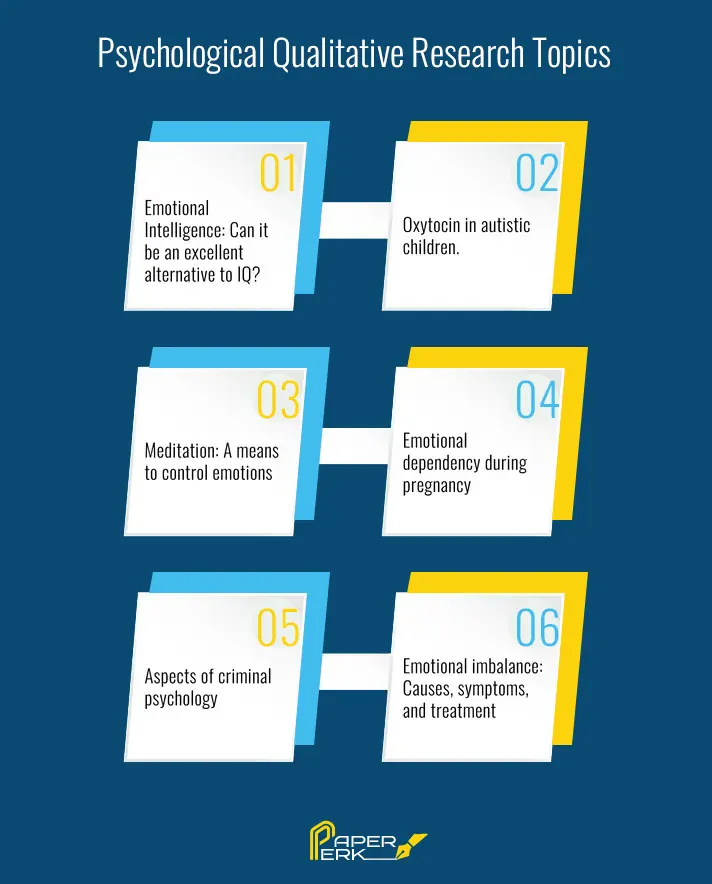
- Emotional Intelligence: Can it be an excellent alternative to IQ?
- Oxytocin in autistic children.
- Meditation: A means to control emotions
- Emotional dependency during pregnancy
- Schizophrenia: Causes and treatment
- Post-traumatic stress disorder: Causes, symptoms, diagnosis, treatment
- Psychology of physical attraction in opposite sexes
- What is a borderline personality disorder? Facts and myths
- Psychological elements in electronic media: Marketing, persuasion, and propaganda
- Psychology in public relations
- Psychology in international relations
- Causes of depression and what to do to avoid it?
- Detailed analysis of speech disorders
- Criminal psychology and the origin of serial killers
- Psychological aspects of the aging process
- The character of NGOs regarding awareness about mental health
- How to prevent child abuse with the help of psychology?
- Aspects of criminal psychology
- Emotional imbalance: Causes, symptoms, and treatment
- Memory loss? Is it a neural problem or a psychological problem?
- The secrets to well-being
- Mental disorders in teens
Read More: Psychology Research Paper Topics
Political Qualitative Research Topics
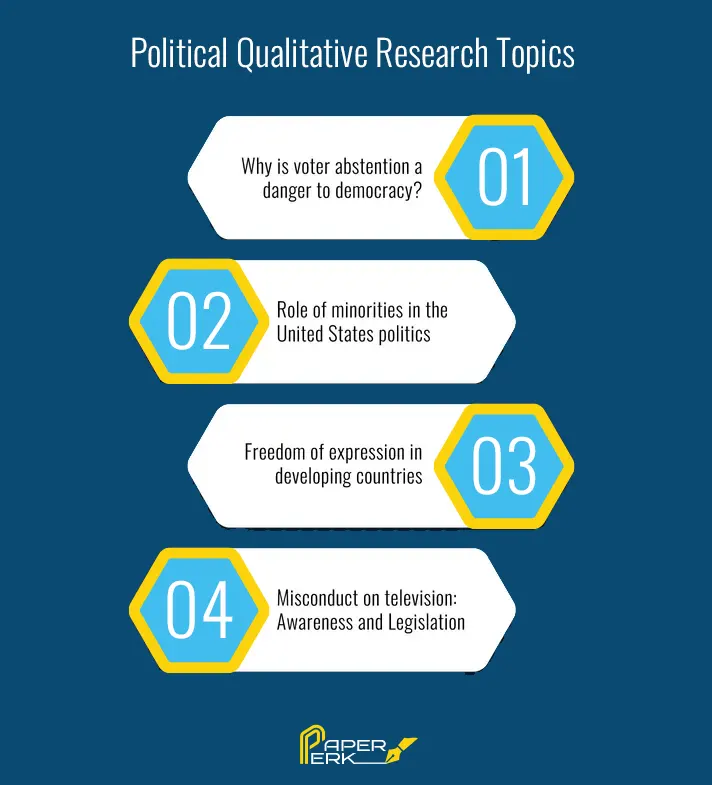
- What role did masons’ living conditions have in forming workers’ political movements ?
- How do presidential elections matter?
- Political compass: A critical analysis
- Is a representative democracy genuinely democratic?
- How has Europe evolved in terms of democracy?
- Democratic evolution in the United States in the last three centuries
- Is democracy a myth or a reality?
- Why is voter abstention a danger to democracy?
- Role of minorities in the United States politics
- Freedom of expression in developing countries
- Freedom of expression under Islamist regimes
- Misconduct on television: Awareness and Legislation
Read More: Political Science Research Topics
Qualitative Research Topics for Art and Culture
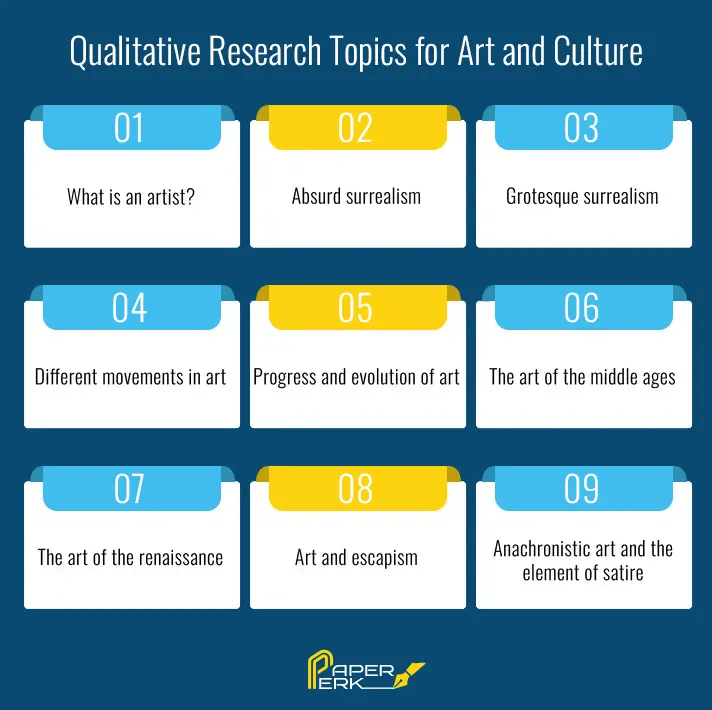
- Is history a universally shared concept?
- Can a man be indifferent to art?
- How do we articulate the link between science and technology?
- What is the purpose of art?
- What does the artist show us? Expression and symbolism
- What is an artist? What does an artist do?
- What is an artist?
- Is art always transgressive?
- Work of art: The proof of the freedom of the spirit
- Can art compete with nature?
- Does art only have the function of freeing us from our passions?
- Passion and emotion in art
- Absurd surrealism
- Grotesque surrealism
- Different movements in art
- Progress and evolution of art
- The art of the middle ages
- The art of the renaissance
- Is the work of art necessarily beautiful?
- Does art change our relationship with reality?
- Does the critic able to regard something as art or not?
- Does the experience of beauty necessarily pass through the work of art?
- Things that art teaches us, artists, as a technician
- Importance of meaning in a work of art
- Meaningless art and absurdist existentialism
- The need for a model in the production of art
- Can we conceive of a society without art?
- Different aspects of society are defined and differentiated by art
- The fear of industrial production among the artists
- Dystopian art: The ability to predict the future among artists
- Elements that distinguish the work of art from any object
- Why the artists deserve a special place in the world
- Rules and regulations in art
- Reproduction of art: Plagiarism in art and harm of repetition
- Art and escapism
- Anachronistic art and the element of satire
- Should the artist seek to please the audience
- Can we blame a work of art for not being worth anything?
- Does every human being understand and appreciate art?
- Do you think that, according to Aristotle’s formula, art is an “imitation of nature”?
- Why does what we dislike in life please us in a work of art?
- Does art seem to be a “revolt against the tyranny of desire”?
- Why do we apply the term “creation” to artistic activity?
- Sacrosanctity of art and human duty to uphold it
Read More: Music Research Topics
Qualitative Research Topics Involving Environment Issues
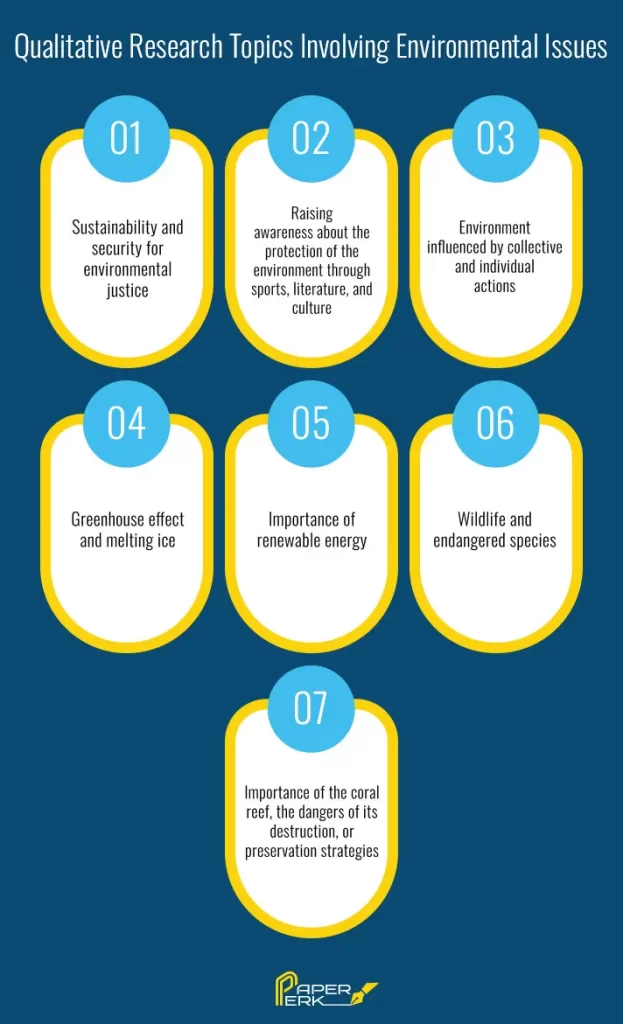
- Advantages and disadvantages of technology for the environment
- Benefits of environmental education in children
- Methods to make modern society aware of the environment
- Alternative energies
- Nuclear energy production: An alternative to the planet’s growing energy demand
- X degree care for the environment
- Analyze the advantages and disadvantages of the different types of renewable energy
- Need to develop environmentally friendly products
- Documentation of experience: Protection of nature
- Elements involved in environmental deterioration
- Environment and strategies for sustainability
- Environmental activism in adolescents and young people
- Sustainability and security for environmental justice
- Raising awareness about the protection of the environment through sports, literature, and culture
- Environment influenced by collective and individual actions
- Awareness of the advantages and disadvantages of the use of technologies
- Effects and causes of acid rain and groundwater
- Ways to live sustainably or focus on a specific aspect of sustainability
- Recent disasters caused by global warming
- Greenhouse effect and melting ice
- Importance of renewable energy
- Wildlife and endangered species
- Air quality and pollution
- Water quality in underdeveloped countries
- Famines caused by environmental changes
- Various recycling programs: Which one is the most effective
- Awareness to participate in the initiatives about the protection of the environment
- How deforestation has affected animals or how it is related to climate change
- Importance of the coral reef, the dangers of its destruction, or preservation strategies
Read More: Best Legal Research Paper Topics
Qualitative Research Topics on Public Relations
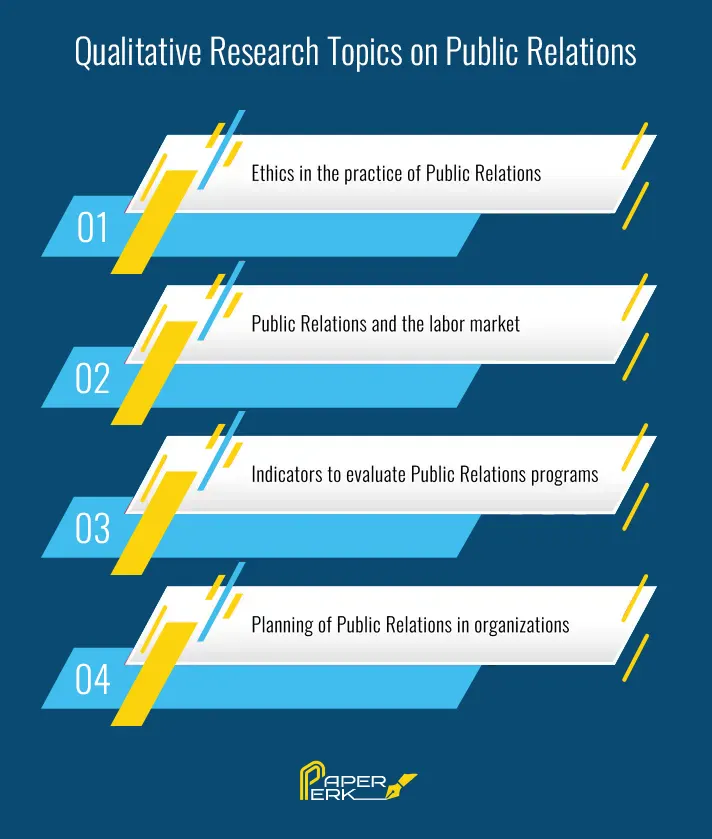
- Public Relations and socio-productive activity
- Organizational Communication and Public Relations
- Ethics in the practice of Public Relations
- Epistemological foundations of Public Relations.
- Factors that limit the practice of Public Relations.
- Public Relations is a strategic factor of the company.
- Relationship workers and professional practice in the United States
- Corporate image and Public Relations
- Corporate identity and Public Relations.
- Public Relations and social enterprise
- Public Relations as an integration factor.
- Profile of the teacher of Public Relations.
- Legislation of Public Relations in Europe
- The free exercise of Public Relations
- Public Relations and the labor market
- Public Relations and digital communication
- History of Public Relations in Europe
- History of Public Relations in the United States
- History of Public Relations in Canada
- Semiology and Public Relations
- Linguistics and Public Relations
- Indicators to evaluate Public Relations programs
- Planning of Public Relations in organizations
- Public Relations through radio and television
- University teaching in Public Relations
Read More: Criminal Justice Research Paper Topics
Qualitative Research Topics for High School Students
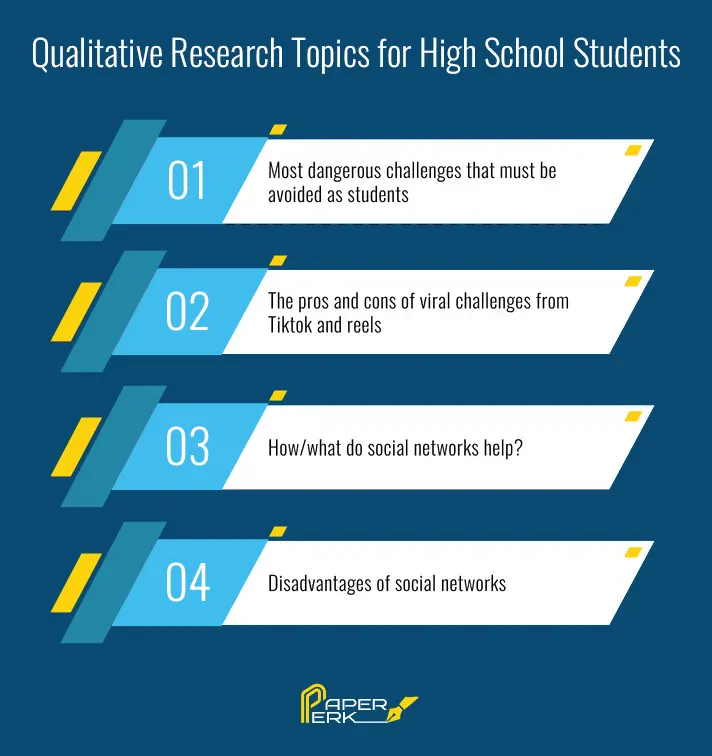
- How has technological development helped hospitals?
- Benefits of technological advances in the classroom
- Advantages and disadvantages of technology in children
- How and why are fun activities different during every stage of the educational period, Montessori, school, college, and university?
- Most dangerous challenges that must be avoided as students
- Challenges made by celebrities: How do future career choices and jobs look for you in the next decade?
- The pros and cons of viral challenges from Tiktok and reels
- How/what do social networks help?
- Disadvantages of social networks
- Problems of social network in adolescents
- What is the most suitable age for children to have a social media presence?
- Toxic behaviors accompanied by social media: Prevention and Solution
Read More: Chemistry Research Topics
Educational Qualitative Research Topics
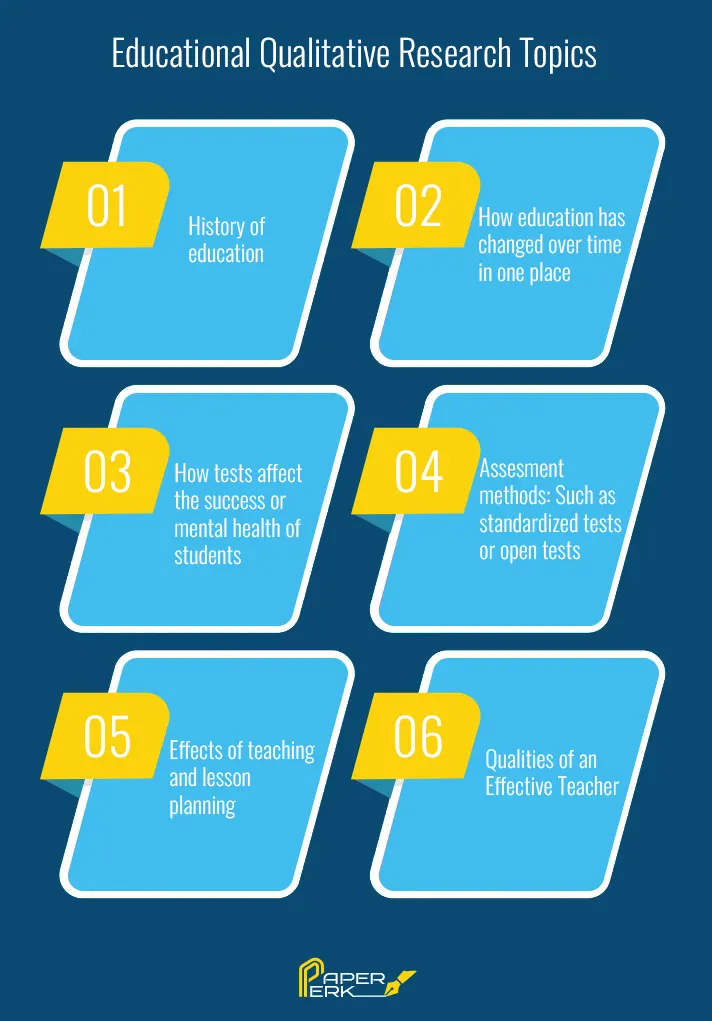
- History of education
- How education has changed over time in one place
- Importance of sports and games in early childhood education
- Possible results of adding playtime to education
- Pros and cons of a grading system
- Most effective grading methods
- How tests affect the success or mental health of students
- Assessment methods: Such as standardized tests or open tests
- Investigate how dress codes affect student performance
- Different schools of learning
- Qualities that effective teachers possess
- Effects of teaching and lesson planning
- Different approaches of public and private schools
- Pros or cons of a charter school systems
- How class size and number of students affect student performance
- Qualities of an Effective Teacher
- The length of the school day, or the length of breaks, and how the durations affect the progress of the students
- How the start time of school affects performance
Read More: Biology Research Paper Topics
Qualitative Research Topics for Business and Economy
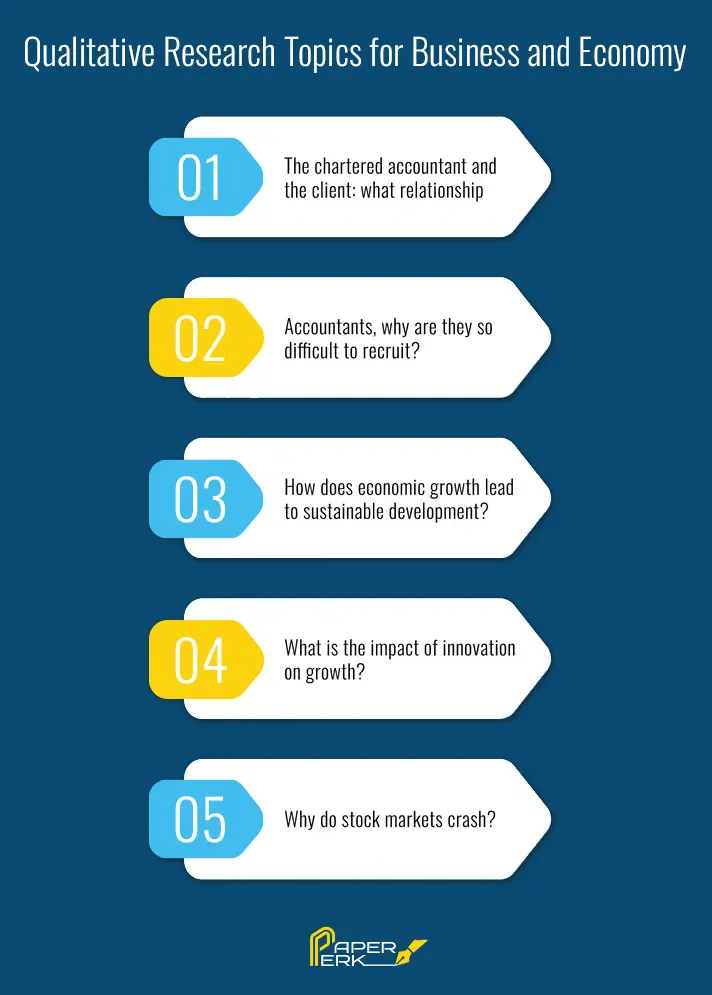
- The chartered accountant and the client: what relationship today?
- How does the arrival of the low-cost accountant change differentiation practices in accounting?
- Law and accounting: how do the new laws impact the profession of a chartered accountant?
- Accountants, why are they so difficult to recruit?
- How does accounting make it possible to assess the state of health of a company?
- Accounting and new technologies: the future or the end of the accountant?
- Can inequalities be reduced with new technologies?
- What distribution of wealth in France (or other)?
- Why do companies relocate?
- Protectionism or free trade?
- Has the organization of work changed after the pandemic?
- Do flexibility and home-working reduce unemployment?
- Should we be afraid of financial bubbles?
- Financial crises, similar cogs? Are we headed to a new recession?
- What is money, and who creates it?
- The stock market against growth?
- How does economic growth lead to sustainable development?
- What is the impact of innovation on growth?
- What role does investment play?
- What are the keys to productivity?
- Is it possible to measure economic growth?
- Why do stock markets crash?
Read More Law / Legal Research Paper Topics
Medical Qualitative Research Topics
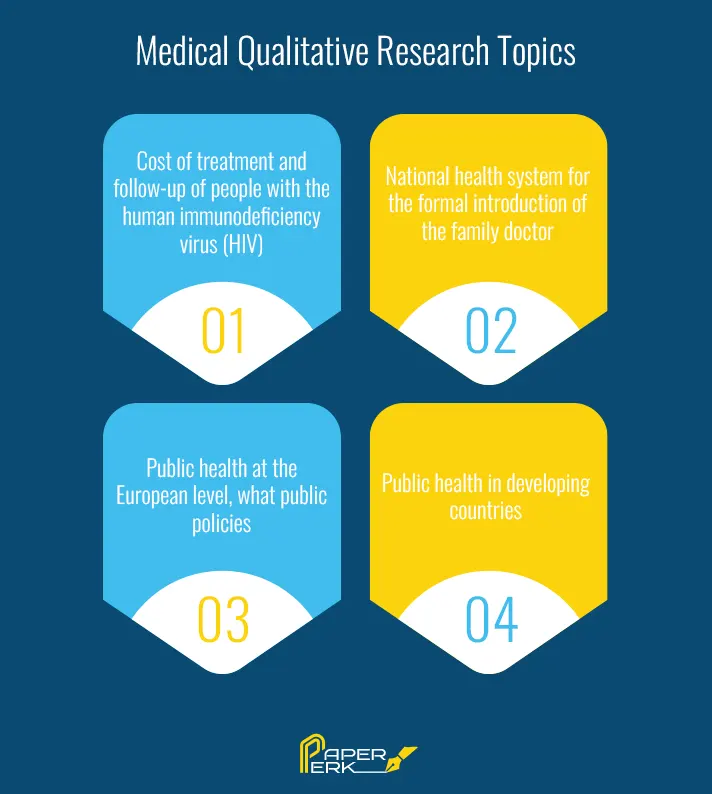
- Current situation of palliative care in health institutions in the United States
- Complications of acute diarrheal disease in children under five years of age
- Nutritional status of surgical oncology patients and its relationship with postoperative complications
- Cost-effectiveness of cervical cancer screening strategies in California
- Thyroid cancer and risk factors in patients treated at San Jose Hospital
- Communicative processes in American ancestral medicine
- Seronegative rheumatoid arthritis in a patient with a pulmonary septic complication
- Telemedicine and Tele-health of the inhabitants of Massachusetts
- Feasibility study and technical, infrastructure and human sustainability for the implementation of the care model
- Epidemiological profile of the general surgery outpatient service
- Physical activity and sport as determinants of health
- Cost of treatment and follow-up of people with the human immunodeficiency virus (HIV)
- National Health System for the formal introduction of the family doctor
- How is the social security system in France unsustainable?
- Comparative study of health systems in the United States and Europe?
- Allergies and intolerances, what are the differences for lactose?
- Is gluten intolerance an actual disease?
- Social inequalities in health in rural countries
- Public health policy or health policy
- Public health at the European level, what public policies
- Public health in developing countries
- Public health and environmental issues through the prism of red meat consumption
- Communication of medicines when advertising is prohibited
Related: Medical research paper writing services
Qualitative Research Topics for Law and Crime
- Consequences of the death penalty.
- Capital offenses: Law, persecution, and penalties
- Classic methods used in the death penalty
- Arguments for or against this punishment
- The stipulation for others and the promise of a stronghold
- Consumer protection in the American Law
- The social attributions of the captain of the ship
- Recent developments in the constitutional justice
- Reframing the civil code
- Critical analysis of the scope of the principle of free justice
- Institutions of the criminal records
- Equality of the creditors in collective proceedings
- Risk management in expertise
- The repressive jurisdiction of the court of peace in the event of insufficiency of the judges
- Labor law and the rights of workers
- Secularism and labor law: Question of religion in business
- The Management of transit migration
- The legal framework of bank credit
- Legal regime of intellectual rights
- Compensation for moral damage
- Family criminal law in the relation between parents and children
- Unilateral termination of the contract
- Role of the military in public prosecution
- Critical analysis of the pre-jurisdictional procedure regarding human rights
- The fault of the administration in land matters
- The subsequent attitude of the victim and compensation for the damages
- Action for retrocession in the event of excessive liberalities
- The exploitation of child labor under Labor Law
- Reflection on the introduction of the system of the dematerialization of bearer shares
- Study on the feasibility of a structure for the amicable settlement of consumer disputes
- The life insurance contract
- Legal liability of the community pharmacist
- The legal age of marriage: legislative, jurisprudential, and doctrinal approach
- Protection of the unpaid seller in the event of insolvency of the buyer
- The renewal of the employment contract
- The regulatory framework for outdoor advertising, signs, and pre-sign
- Extra-judicial resolution of land disputes
Read More: Research Paper Topics
Qualitative Research Topics Concerning Drug Abuse
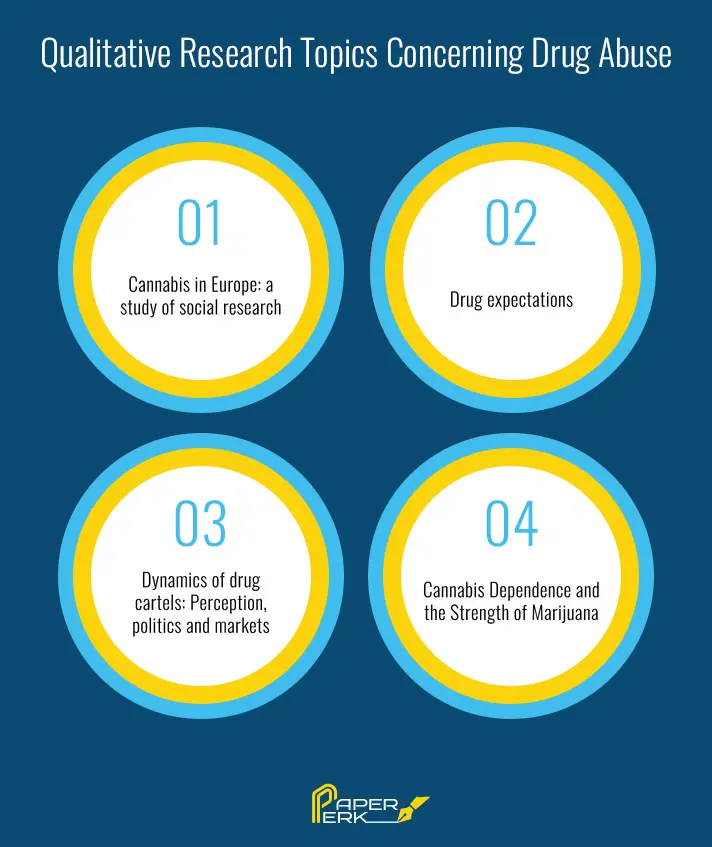
- Drug use in adolescents
- Consequences of excessive drug use
- Legal and illegal addictive substances
- Effects of drugs on the brain
- Effects of alcohol and tobacco
- Social science research on drugs
- Psychological research on drugs
- Biomedical research in the field of drugs
- Drug addiction treatment
- Cannabis in Europe: a study of social research
- Drug expectations
- Dynamics of drug cartels: Perception, politics, and markets
- Sources and uses of methamphetamine
- Sensation seeking
- Contribution of research in psychology on drugs
- Drug research: recent developments
- in the field of psychology
- Places of cannabis consumption
- Drug prevention for the most vulnerable young people
- Cannabis retail markets
- Cultivation of cannabis at home
- Cannabis Dependence and the Strength of Marijuana
- Cannabis and youth
- Cannabis and schizophrenia
Read More: Social Work Research Topics
Women Issues and Rights Qualitative Research Topics
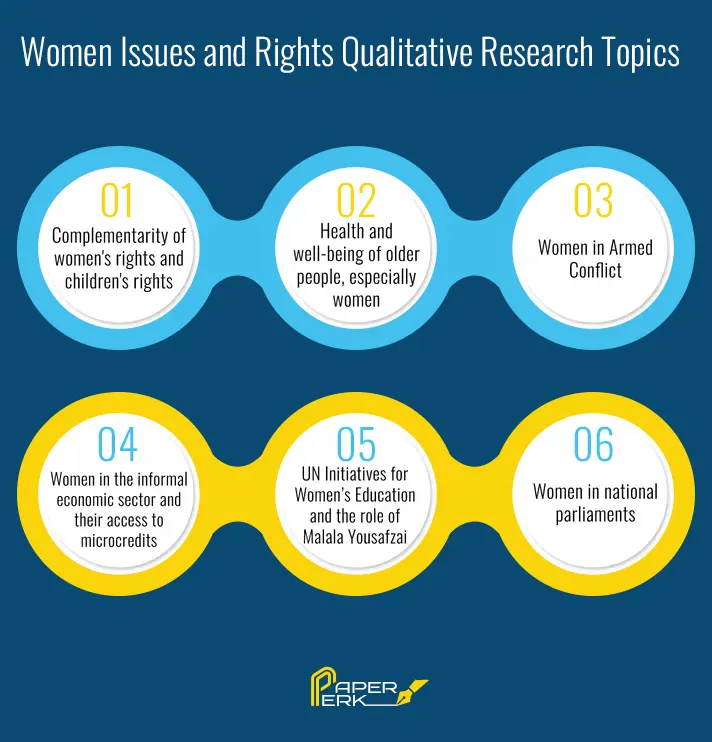
- How to educate teens about pregnancy
- Women’s rights violations in the middle east
- Forced-Hijab conflict in Iran
- How to live a healthy pregnancy period
- Access to health is a fundamental right: what role can parliaments play in ensuring health for women and children?
- The wave of feminist movements in the Middle East
- The situation of women and children in times of conflict
- The role of women parliamentarians in the prevention of national and international terrorism and in the promotion of peace
- Promoting women’s participation and gender equality in multilateral negotiations
- The contribution of women to the establishment of a new global financial and economic model
- Feminism in Egypt
- Impact of the media on the status of women and image of women politicians in the media
- Poverty and extreme poverty: women as victims of this phenomenon and as key actors in the fight to eradicate it
- Complementarity of women’s rights and children’s rights
- Health and well-being of older people, especially women
- Women in Armed Conflict
- Feminism in the South Asian Subcontinent
- Violence against women
- Role of women in ensuring environmental protection within the framework of development
- Women in the informal economic sector and their access to microcredits
- Women in economic life and the world of work
- Impact of women on the democratic process
- Women in the political process
- Women’s rights violations in Africa
- Financing women’s electoral campaigns
- Women’s political and electoral training
- Women in political parties
- United Nations Initiatives for Women’s Education and the role of Malala Yousafzai
- Women in national parliaments
- The partnership between men and women in politics
Still feel the need to know more? It is noble to be insatiable about knowledge, so here are 402 More Research Paper Topics for you.
As we said in the beginning, writing a qualitative research paper is not a piece of cake. But after reading all these topics above, you now know that it is not rocket science either. All you need is a little commitment and a pint of inspiration potion that we have above 300 research paper topics.
If you still need professional qualitative research writing services, you can get to know our writers or contact us. We are online 24/7 with immediate responses to offer you research paper help .
Order Original Papers & Essays
Your First Custom Paper Sample is on Us!
Timely Deliveries
No Plagiarism & AI
100% Refund
Try Our Free Paper Writing Service
Related blogs.

Connections with Writers and support
Privacy and Confidentiality Guarantee
Average Quality Score
Qualitative research in education : Background information
- Background information

- SAGE researchmethods SAGE Research Methods is a tool created to help researchers, faculty and students with their research projects. Users can explore methods concepts to help them design research projects, understand particular methods or identify a new method, conduct their research, and write up their findings. Since SAGE Research Methods focuses on methodology rather than disciplines, it can be used across the social sciences, health sciences, and other areas of research.
- Next: Recent e-books >>
- Recent e-books
- Recent print books
- Connect to Stanford e-resources

- Last Updated: Jan 23, 2024 12:45 PM
- URL: https://guides.library.stanford.edu/qualitative_research_in_ed
Have a language expert improve your writing
Run a free plagiarism check in 10 minutes, generate accurate citations for free.
- Knowledge Base
Methodology
- What Is Qualitative Research? | Methods & Examples
What Is Qualitative Research? | Methods & Examples
Published on June 19, 2020 by Pritha Bhandari . Revised on June 22, 2023.
Qualitative research involves collecting and analyzing non-numerical data (e.g., text, video, or audio) to understand concepts, opinions, or experiences. It can be used to gather in-depth insights into a problem or generate new ideas for research.
Qualitative research is the opposite of quantitative research , which involves collecting and analyzing numerical data for statistical analysis.
Qualitative research is commonly used in the humanities and social sciences, in subjects such as anthropology, sociology, education, health sciences, history, etc.
- How does social media shape body image in teenagers?
- How do children and adults interpret healthy eating in the UK?
- What factors influence employee retention in a large organization?
- How is anxiety experienced around the world?
- How can teachers integrate social issues into science curriculums?
Table of contents
Approaches to qualitative research, qualitative research methods, qualitative data analysis, advantages of qualitative research, disadvantages of qualitative research, other interesting articles, frequently asked questions about qualitative research.
Qualitative research is used to understand how people experience the world. While there are many approaches to qualitative research, they tend to be flexible and focus on retaining rich meaning when interpreting data.
Common approaches include grounded theory, ethnography , action research , phenomenological research, and narrative research. They share some similarities, but emphasize different aims and perspectives.
Note that qualitative research is at risk for certain research biases including the Hawthorne effect , observer bias , recall bias , and social desirability bias . While not always totally avoidable, awareness of potential biases as you collect and analyze your data can prevent them from impacting your work too much.
Prevent plagiarism. Run a free check.
Each of the research approaches involve using one or more data collection methods . These are some of the most common qualitative methods:
- Observations: recording what you have seen, heard, or encountered in detailed field notes.
- Interviews: personally asking people questions in one-on-one conversations.
- Focus groups: asking questions and generating discussion among a group of people.
- Surveys : distributing questionnaires with open-ended questions.
- Secondary research: collecting existing data in the form of texts, images, audio or video recordings, etc.
- You take field notes with observations and reflect on your own experiences of the company culture.
- You distribute open-ended surveys to employees across all the company’s offices by email to find out if the culture varies across locations.
- You conduct in-depth interviews with employees in your office to learn about their experiences and perspectives in greater detail.
Qualitative researchers often consider themselves “instruments” in research because all observations, interpretations and analyses are filtered through their own personal lens.
For this reason, when writing up your methodology for qualitative research, it’s important to reflect on your approach and to thoroughly explain the choices you made in collecting and analyzing the data.
Qualitative data can take the form of texts, photos, videos and audio. For example, you might be working with interview transcripts, survey responses, fieldnotes, or recordings from natural settings.
Most types of qualitative data analysis share the same five steps:
- Prepare and organize your data. This may mean transcribing interviews or typing up fieldnotes.
- Review and explore your data. Examine the data for patterns or repeated ideas that emerge.
- Develop a data coding system. Based on your initial ideas, establish a set of codes that you can apply to categorize your data.
- Assign codes to the data. For example, in qualitative survey analysis, this may mean going through each participant’s responses and tagging them with codes in a spreadsheet. As you go through your data, you can create new codes to add to your system if necessary.
- Identify recurring themes. Link codes together into cohesive, overarching themes.
There are several specific approaches to analyzing qualitative data. Although these methods share similar processes, they emphasize different concepts.
Qualitative research often tries to preserve the voice and perspective of participants and can be adjusted as new research questions arise. Qualitative research is good for:
- Flexibility
The data collection and analysis process can be adapted as new ideas or patterns emerge. They are not rigidly decided beforehand.
- Natural settings
Data collection occurs in real-world contexts or in naturalistic ways.
- Meaningful insights
Detailed descriptions of people’s experiences, feelings and perceptions can be used in designing, testing or improving systems or products.
- Generation of new ideas
Open-ended responses mean that researchers can uncover novel problems or opportunities that they wouldn’t have thought of otherwise.
Researchers must consider practical and theoretical limitations in analyzing and interpreting their data. Qualitative research suffers from:
- Unreliability
The real-world setting often makes qualitative research unreliable because of uncontrolled factors that affect the data.
- Subjectivity
Due to the researcher’s primary role in analyzing and interpreting data, qualitative research cannot be replicated . The researcher decides what is important and what is irrelevant in data analysis, so interpretations of the same data can vary greatly.
- Limited generalizability
Small samples are often used to gather detailed data about specific contexts. Despite rigorous analysis procedures, it is difficult to draw generalizable conclusions because the data may be biased and unrepresentative of the wider population .
- Labor-intensive
Although software can be used to manage and record large amounts of text, data analysis often has to be checked or performed manually.
If you want to know more about statistics , methodology , or research bias , make sure to check out some of our other articles with explanations and examples.
- Chi square goodness of fit test
- Degrees of freedom
- Null hypothesis
- Discourse analysis
- Control groups
- Mixed methods research
- Non-probability sampling
- Quantitative research
- Inclusion and exclusion criteria
Research bias
- Rosenthal effect
- Implicit bias
- Cognitive bias
- Selection bias
- Negativity bias
- Status quo bias
Quantitative research deals with numbers and statistics, while qualitative research deals with words and meanings.
Quantitative methods allow you to systematically measure variables and test hypotheses . Qualitative methods allow you to explore concepts and experiences in more detail.
There are five common approaches to qualitative research :
- Grounded theory involves collecting data in order to develop new theories.
- Ethnography involves immersing yourself in a group or organization to understand its culture.
- Narrative research involves interpreting stories to understand how people make sense of their experiences and perceptions.
- Phenomenological research involves investigating phenomena through people’s lived experiences.
- Action research links theory and practice in several cycles to drive innovative changes.
Data collection is the systematic process by which observations or measurements are gathered in research. It is used in many different contexts by academics, governments, businesses, and other organizations.
There are various approaches to qualitative data analysis , but they all share five steps in common:
- Prepare and organize your data.
- Review and explore your data.
- Develop a data coding system.
- Assign codes to the data.
- Identify recurring themes.
The specifics of each step depend on the focus of the analysis. Some common approaches include textual analysis , thematic analysis , and discourse analysis .
Cite this Scribbr article
If you want to cite this source, you can copy and paste the citation or click the “Cite this Scribbr article” button to automatically add the citation to our free Citation Generator.
Bhandari, P. (2023, June 22). What Is Qualitative Research? | Methods & Examples. Scribbr. Retrieved April 11, 2024, from https://www.scribbr.com/methodology/qualitative-research/
Is this article helpful?

Pritha Bhandari
Other students also liked, qualitative vs. quantitative research | differences, examples & methods, how to do thematic analysis | step-by-step guide & examples, unlimited academic ai-proofreading.
✔ Document error-free in 5minutes ✔ Unlimited document corrections ✔ Specialized in correcting academic texts
Thesis Helpers
Find the best tips and advice to improve your writing. Or, have a top expert write your paper.
202 Best Choice Qualitative Research Topics for Students 2023

As a college student, you’ll always encounter a series of essays to write while in school. These essays will always be of different types, and they’ll include research essays. There are two important things to know when embarking on research paper writing. First, you have to understand if your research work is to be quantitative or qualitative.
For qualitative research writing, you’ll be required to go through a fundamental research process which entails gathering raw and primary information through field research which can either be done through interviews, surveys, observations, or through any other way of harnessing raw data.
There are so many research topics to look into when preparing for your essay writing. Among these are some of the qualitative research topics ideas to look out for.
Examples of Qualitative Research Topics
There is a wide variety of what qualitative research can cover. Below you’ll find a qualitative research topics list with some initial ideas that can get you started.
- How Social media is affecting the physical social engagement of Teenagers in Urban areas
- Health benefits of treating depression with medication and some of them realize results
- The efficiency of Peer educators in creating social awareness on social and health issues
- Understanding the effects of Gender-Based Violence (GBV) in rural areas and how this negatively impacts women in such areas
- Challenges of the sexual reproductive health of child brides and how this can be controlled
- Social investigation into the cause of dropping out of the school of teenagers and young adults and some of the ways through which it can be addressed
- Academic pursuit: is it deteriorating in Third World countries
- Benefits of engaging in social activities to depressed people and those struggling with certain mental health challenges
- Understanding the learning challenges of dyslexic children and progressive ways to administer help to them
- A questioning of the stigma associated with cerebral palsy
- The social implications of living with disabilities
- How ableism affects disabled people in our society
- Understanding the benefits and promotion of feminist values in rural areas
- The need to promote free education across every learning environment
- Investigating the root causes of food insecurities in low-income neighborhoods
- Understanding the challenges of housing insecurity and food insecurity
- Displacement and its accompanying effects: a look into the mental health of homeless people
- How culture contributes to female harm in the society
- Socioeconomic benefits of free education in our society
- Understanding the intricacies of food banks in low-income neighborhoods
- How food insecurity causes children to perform poorly in school
- The effects of alcohol on college students
- Drugs & Substance: which do young adults abuse more
- The causes of child labor and how to mitigate against such practices
- Educational challenges on children in rural areas and ways to proffer help
- Benefits of Pro Bono services to the less privileged
- How Pro Bono legal aids improve the justice system
- Understanding the stigma of living with disabilities
- Causes of the stigma that surrounds certain health challenges
Qualitative Nursing Research Topics
Even while your area of specialization in college is in medicine or health care, you’ll still be required to carry out research writing. If your specialization is in nursing, there is still research to embark on. Because nursing itself as a field of study touches across a lot of medical and health care issues which requires research to be paid attention to and brought relevance to. Here are some qualitative research topics examples on nursing to look into.
- How to administer care to patients with Dyslexia
- How to help patients with mental disorders
- Signs and Symptoms of autism and how to extend help to these patients
- How to identify Alzheimer’s in older patients
- Understanding how to deal with pregnant women and emergencies
- Administering antenatal care to pregnant women
- Patient care in psychiatric units and a look into that
- Identifying and treating Alzheimer’s
- Basics of patient care
- Difference between workloads of ICU nurses and OR nurses
- Care for hypertensive patients with diabetes
- First aid treatments for gun victims
- Pros & cons of nurses’ drug prescription
- The role of nurses in rural healthcare services
- Understanding care in nursing homes
- Intensive care for visually and verbally impaired patients
- Benefits of immunization in rural areas
- Outlining and handling the side effects of the COVID-19 vaccine
- Why compassion and sensitivity is important for nurses
- The role of nurses and healthcare corporations
- How nurses can handle cardiovascular challenges
- Signs of Depression and anxiety in patients
- How to take care of people with special needs
- How to take care of elderly
- How to administer care to survivors of female genital mutilation
- How to assist rape survivors
- Bipolar symptoms in young adults
- How to curb drug abuse
- Effective ways to carry out health outreach programs
Qualitative Research Topics in Education
While there are other topics specific to different other specifications, they all mostly spring up from education. There are so many issues and topics that pertain to the education system which allows for more research to be embarked on this aspect of learning. The one realistic and easy way to evaluate and improve the quality of education is through the carrying out of the research. Here are some good qualitative research topics in education.
- Which learning style is efficient for autistic children
- Importance of mental health education in the school curriculum
- The importance of computer literacy
- Learning condition of children in third world countries
- Food insecurity and child education
- How virtual learning affects high school students
- Can students manipulate lockdown browsers?
- Effects of alcoholism on education
- Understanding adult learning
- The need to encourage adult education
- Impacts of computer literacy on education
- Disadvantages of homeschooling
- Importance of guidance and counseling in schools
- Significance of school uniform to learning
- How to improve oral learning in classrooms
- The negative impacts of student loans
- How to teach and improve the learning abilities of ADHD students
- The importance of sign language learning
- Impacts of the poor educational system
- The need to include technology into the education system
- How smartphones affect students academic performance in the academic system
- Psychological impacts of student bullying
- Developing connecting through virtual learning
- Importance of research writing in schools
- The need to improve educational learning for children in low-income neighborhoods
- The importance of reading to preschoolers
- Importance of social activities in schools
- Ways to help children with learning disabilities to improve their learning
- Easy ways to master foreign languages for students in high school.
Qualitative Research Topics in Political Science
Writing qualitative research also extends to the field of political sciences. Qualitative research is very important in the political field because it allows people to have a clearer understanding of the field as in most cases, it can easily become broad. Narrowing your research to specific topics will help you handle the research effectively. Here are some qualitative research topics lists in political science.
- How COVID-19 impacts low-income neighborhoods
- The need for the cancellation of student loans and not the suspension of student loans
- Racism as a dividing factor in America
- Segregation and racist laws
- Effects of capitalism on America’s health system
- Why healthcare in America should be free
- The abortion regulation bill and its effects
- What the return to office move says about American capitalism
- The distinction between Liberalism and Conservatism and places where they merge
- Understanding neoliberalism and how it impacts our activities in the society
- COVID-19: Vaccines and treatments
- The importance of independent judiciary and legislation to improve the American legal system
- Understanding the effects of American incarceration
- Carceral system in America and how it targets mostly people in minority groups
- Understanding American foreign policy
- The negative impacts of peace war in affected countries
- A look into the dimensions of the American democracy
- Classism, racism, colorism: understanding the different American ideologies
- The need for the cancellation of the American carceral system
- Dissecting the causes of the election crisis
- The need for a free polling system to encourage free and fair voting practices
- The challenges of Americans two-party system
- The role of mass media in promoting and scrutinizing politics
- Why America needs a multi-party system
- The inclusion of black women in American politics
- The need for representation in American politics
- The negative impacts of misrepresentation
- Addressing Police brutality in America
- The role of feminism in enhancing American politics
Topics for Ethnography Qualitative Research
Carrying out Ethnographic research requires paying attention and studying society from a descriptive perspective. This form of research writing is usually useful in cultural anthropology. Practically, when you are writing ethnographic research, you’ll be required to carry out a series of research writings. One of the most important researches you’ll be embarking on which in turn becomes primarily beneficial to the essay is qualitative research. With qualitative research writing in ethnography, every single collected raw data is useful information to you that will enable you to pull through with your essay. Listed below are some qualitative research paper topics.
- How does Sexual violence in rural areas affect the psychological well-being of the women and girls in such locality
- Evaluating the role of parental care and the lack of it thereof in the lives of some foster kids
- An insight into the primary causes of the swift migration happening from African to Europe
- Examining the distinction between the Sharia laws applicable to Muslims abroad and those in African countries
- Explain how political instability in certain countries is often the remote cause of the general instability that arises in any country.
- The relationship between political and instability and migration
- Exploring the link between violence against women and sex trafficking
- Analyzing the socioeconomic impacts of instability on a nation
- An overview of the rise of oral literature study in literature
- The social implications of American confinement systems on individuals
- What are the ways through which sororities impacts the lives of those within it
- A study into the ways through which government enables homelessness
- A study of the American society and how to reach it is in culture and history
- Outlining some of the challenges of Muslims in Africa
- Discussing the leniency of the practice of Islam in foreign spaces
- A study into the importance of fraternities and sororities
- How is the popular culture impacting the psyche of Americans
- The impacts of westernization in human perception
- How does literature contribute to change the world
- Discussing the challenges transgender people undergo within and outside the LGBTQ+ community
- How social media distorts the perception of reality
- The role of the smartphone in our deteriorating attention span
- Understanding culture and how it applies to different American groups
- The importance of books in the lives of children in rural areas
- How violence breeds housing and food insecurity
- The role of capitalism in generating food insecurity
- Understanding the effects of female genitalia mutilation in girls
- How popular culture serves as an agent of social change
- How male dominance breeds male violence
Qualitative Research Topics in Public Health
Even while within the public health sector, you’ll still be required to write qualitative research on your field of study. What this allows is that it gives you the much-needed insight into looking into relevant and crucial aspects of your field of specialty that might need the extra attention. Knowing this while writing research will enable you to broaden your understanding of the intricacies of your course of study as it allows you to gather information firsthand. Here are some research topics for qualitative research on public health.
- The benefits of immunization in rural areas
- Causes of water-borne diseases in such our society and how this can be mitigated against
- The simple signs and symptoms on how to indicate high blood pressure in young people
- The importance of antenatal care to every pregnant woman
- Ways to create awareness for breast cancer
- Barriers to clean hygiene in health centers
- Understanding the health challenges of lack of drinkable water in a community
- Prevalence of COVID and how to control its spread
- Importance of nose masks in the times of Covid-19
- Health insurance and how it benefits people
- Importance of safe menstrual care for girls
- How to control the widespread of Flu
- Benefits of exercise to obese people
- How to properly manage to live with Diabetes type II
- Causes of malnutrition in young children
- Control of the prevalence of drug and substance abuse
- Prevention methods for COVID-19
- The importance of contraceptives for sexually active teenagers
- Why do teenagers need sex education and not complete abstinence
- Poorly maintained public hospitals and their effects
- The need to properly manage the source of our waste products disposal
- Factors generating health issues in pregnant women
- The importance of post-natal to nursing mothers
- The need for the creation of health awareness in rural areas
- The growing impacts of COVID-19 on the healthcare system
- The health benefits of constant sanitation
- Role of social distancing in limiting the cases of COVID-19 in the society
- The difference between epidemic and pandemic
- The role of finance in propagating an inclusive and efficient healthcare system.
Qualitative Research Topics in Project Management
Project management entails making plans, structuring, controlling, and proffering reliable ways for the carrying out of such plans to achieve desirable results or goals. The main focus of every form of project management writing is that it focuses on ways through which goals or results can be achieved while basing it on a given process. There are so many topics that are in line with project management. Here is a look into some of the easy qualitative research topics within this particular field of study.
- The leading causes of underdevelopment in most sectors in the society and possible ways to mitigate against this.
- The assessment of the contributing factors that lead to failed healthcare systems in rural areas
- Understanding the challenges that often generate food insecurity and scarcity within a given locality
- Plausible ways through which food insecurity can be handled within a given society
- An investigation into the causes of increased child mortality cases in rural areas
- Impacts of financial management in a country and how it benefits citizens
- How to set up an operation pest control activity in a society
- Investigation into the current cost of living in the society and how this is propagated by capitalism
- The need to create a more inclusive healthcare system
- The root causes of lack of medical insurance and possible ways to curb it.
- The importance of health management in organizations and possible ways to ensure it
- Procedure to encourage the building of health centers in underdeveloped areas
- Promoting the growth and enhancement of management systems that ensure positive impacts on underserved areas
- Analysis of the cost-effectiveness of manufacturing learning centers in urban areas
- Evaluation of accommodation spaces in public nursing homes
- Enhancing the living situation of charity homes and ways to ensure it
- What is the benefit of building communication masts in rural areas
- Efficient ways of regulating revenue distribution
- Design system for building online regulated parking system
- Design process and management of geolocators
- How to ensure effective budget planning
- The importance of budgeting systems and revenue regulatory systems in government sectors
- Overview of budgeting and budget padding as a financial regulatory system.
- The problem with healthcare construction projects in Louisiana
- The role of strategy in enhancing business management
- Student loan challenges faced by academic students in America
- The importance of developing healthy customer-client relationships
- Foreign policy and its impact on developing industrial complexes
Are you writing your college research essay and wondering about how to go about it and, at the same time, if it will require expert writing help? Look no further, for you can rest assured that there are professional research writing experts here that will provide you with quality but cheap essays that will get you high grades! Don’t hesitate to try it out if you are struggling.

Make PhD experience your own
Leave a Reply Cancel reply
Your email address will not be published. Required fields are marked *
10 creative research topics for students (2024)
Last updated
25 November 2023
Reviewed by
Miroslav Damyanov
Research is a key part of student life, but deciding which topic to research can take time and effort. The right research topic typically aligns with your skills and interests, has current relevance, and can positively impact the world.
In this article, you’ll find some helpful examples to help you get started.
- What is a research topic, and what is it for?
Research topics enable students to drill down into a specific aspect of a subject to broaden their knowledge and share learnings with others. They are typically used to make discoveries or develop fresh viewpoints.
A research topic defines the specific theme that research will be conducted around. It’s essential for providing a key focus for the work to be completed. Ultimately, it defines a core problem or knowledge gap that needs to be solved.
A clear topic helps define what is being studied and how that information will be communicated to others.
- Research topic vs. research question
A research topic is a broad theme of focus that requires further investigation. It’s the project’s overall subject—an aspect of which will be studied.
A research topic example could be “The effects of meditation on stress reduction.”
A research question is a specific inquiry that researchers want to investigate and answer to broaden their knowledge and make new discoveries. Research questions are much more specific, focusing on a very small aspect of the overall topic.
The right research question will specifically set out what is being researched so there is no ambiguity.
Here’s an example of a research question within the topic: “How does meditation impact stress, anxiety, and burnout in the workplace?”
- What makes a good research paper topic?
Here are the characteristics that make some topics more favorable and useful than others:
Clarity: a helpful research topic should be clearly understood to ensure the integrity of the research. It should be clear to the student and mentor/professor what the topic is and how it will be explored.
Originality: answering questions that have already been researched and answered many times before could be a waste of resources. Answering original questions is key to getting the most out of research. This might involve researching topics that have already been covered from a different angle or exploring an entirely new topic.
Relevance: it’s helpful to ensure that a research topic is related to your expertise and your access to resources. This will ensure that the research topic is relevant to you.
Ethical : ethics should always be considered when conducting research. Your research shouldn’t cause physical or mental harm to any participants. You should also consider animal and environmental ethics.
- How can I choose a good topic for my research paper?
With so many topics to choose from, selecting a topic for your research paper can be overwhelming. That’s why it’s a good idea to consider these three points to make the best choice:
1. Lean into personal interest
Being interested and experienced in a particular field will make the research more interesting, relevant, and straightforward to conduct.
Your interest will mean you’re committed and motivated to discover the answer to your research question. Being personally engaged also makes the process more enjoyable.
One caveat to keep in mind is the potential for bias. If you are invested in the research having a particular result, you must ensure it’s accurate, double-checked, and reviewed by an impartial party.
2. Choose a topic with enough information
Your research project might fail if you don’t have access to sufficient information and resources. There needs to be enough information to gain deep insights into the research at hand.
Consider the resources you have within your project limits. If your research has funding, carefully work out what that funding could be used for. If not, you may need to consider research that you’ll be able to complete with access to public records and other free resources.
Timings, finances, access to participants, and publicly accessible information will all need to be considered before choosing the final topic to research.
3. Consider the guidelines
You’ll need to adhere to the specific guidelines that your school, mentor, or professor have laid out. They may request that the topic be related to public interest, a currently challenging topic for the environment, or another parameter.
When considering those guidelines, make ethical considerations. Your school or university is unlikely to permit unethical research.
- How to find research topics to write about
Even though there’s an endless range of topics to research, you might not know where to begin. Starting with background reading, mind mapping, and speaking with mentors can help mold general ideas into useful topics and questions.
Extensive reading: completing background reading of educational databases, journals, and scientific studies can help provide a good working knowledge of what is currently being researched and identify key gaps.
Social problems: current challenges on both a local and global scale can make excellent research questions. Whether it’s investigating climate change, human health, or the impact of pandemics, there’s likely to be large human interest if you research social problems and challenges. The research you conduct may even have a positive impact on the world around you.
Mind mapping: brainstorming different ideas inspired by your background reading and personal interests can lead to ideal research topics. Create a large mind map, whether in a notebook or on a whiteboard, to get all your ideas down on paper. You may be surprised at what unique ideas you come up with.
Speak to mentors: running topics over with your professor or mentor could prove very helpful. They may be able to help you refine your ideas, provide feedback on research questions, and offer useful suggestions to ensure the topic you pick is appropriate.
- The top 10 research topics for students
Here are some of the top 10 research topics and research areas for students. Whether in high school, senior high school, or college, these topics are important and relevant for students today.
You might use these ideas as starting points for your own original research topics and research questions.
1. High school research paper topic ideas
Research topics in high school can promote critical thinking , personal growth, and problem-solving skills.
Some of the most relevant research topics for high schoolers revolve around social and political issues, as those are often core topics within the school curriculum. Also, students are often interested in how they can positively impact the world around them, so topics within social change and social issues are particularly relevant.
The impacts of bullying
Bullying and its impacts are an interesting and relevant topic for high school students. Students may want to consider ways to mitigate bullying or explore whether bullying can affect people long-term.
Some specific research questions within the bullying topic are:
What is the evidence that parental support can alleviate the impact of bullying in schools?
What are the effects of bullying and victimization on short-term mental health?
How can we predict adolescents’ bullying participation and understand the participant roles of bullying in different grades?
Social media in high schools
With social media use prolific in the modern world, students may be particularly interested to learn about how it impacts humans. Students may want to research the effects of different social media types, ways to reduce social media use, or how social media is impacting people around the world.
Some topics within social media could be:
Is there a correlation between social media use and academic performance?
What are the effects of social media use on mental health in people aged 12–18?
How does social media use affect self-esteem in students?
2. Psychology research paper topics
Psychology is a broadly studied topic with many possible avenues for exploration. Whether you’d like to understand how the human brain works, ways to boost mental health, or treatment options in psychology, there are endless options.
Here are some of the top 10 research topics for college students in psychology:
Increasing happiness
Some specific research questions related to happiness include the following:
What are the factors driving the fear of leaning into happiness in American society?
How can practicing vulnerability reduce stress and boost happiness?
What impact does forest bathing have on overall mood scores?
Mitigating anxiety
With 37% of US adults more anxious in 2023 than in 2022, anxiety as a research topic is very relevant.
Below are some example research questions:
How does chronic anxiety impact people’s day-to-day lives?
What is the impact of meditation interventions on anxiety?
Is there data to support physical exercise interventions for anxiety disorders?
3. Science research paper topics
Scientific research covers many study fields. From biology and chemistry to physics and biochemistry, science helps researchers discover critical information about humans and our world.
Here are a few potential topics for exploration:
Reducing pandemic risk
Given the impact of COVID-19, mitigating the risk of a future pandemic is of significant human interest. A student may look at ways to improve pandemic responses, identify future pandemics, boost vaccine adoption, and reduce the spread of misinformation.
Specific research questions include the following:
How can AI help predict future pandemics?
How does animal breeding contribute to zoonotic disease risk?
What are the key ways to identify and control a potential future pandemic before it becomes widespread?
Renewable energy
With climate change and the planet’s health a major concern for many scientists, investigations into more environmentally friendly and renewable energy sources are of great social interest.
Here are some research questions about renewable energy to consider:
What is the economic feasibility of widespread renewable energy use across the US?
How could wind, water, and solar energy reduce global emissions?
What are the core factors preventing the widespread use of renewable energy?
4. Good environmental research topics
Climate change impacts every person on the planet, so it can make an excellent research topic. Particularly for the younger generation, climate change is an interesting and often concerning discussion topic. Gen Z, for example, speaks much more actively about climate change both on and offline.
Climate change on a global scale
Some specific research questions within the climate change topic are:
What is the impact of climate change on biodiversity in the Amazon rainforest?
What impact could the use of solar power have in the US in relation to carbon emissions?
How do carbon dioxide emissions affect ocean acidity levels?
5. Argumentative research paper topics
Setting out a specific argument and exploring the topic can make for interesting research. Argumentative research topics are typically related to human interest, issues that impact us on a global scale, or challenges that particular social groups face.
Affirmative action
With rising interest in equality, researching affirmative action—designed to prevent the impacts of discrimination—is a relevant research topic for high school and college students.
Some specific questions relating to affirmative action could be:
Does affirmative action promote equality in the workplace?
What is the evidence that affirmative action is helpful in university admissions?
How has the affirmative action ban impacted the tech industry?
The ethical use of AI
AI use is expanding rapidly across the globe, so there’s growing interest in its impacts and the need for ethical usage.
Some research questions relating to AI include the following:
Could AI lead to more global conflict?
Can ethical legislation reduce the risk of AI and its implementation?
How many jobs could be impacted by AI in 2025?
6. Human rights paper topics
Human rights impact everyone on the planet, so it’s a topic that’s of continual interest.
Research in this area could cover human rights in the workplace, privacy rights, gender equality, and much more.
International human rights
International human rights is a complex yet critical area of global interest. Human rights help protect people’s freedom and safety around the world.
What are ways to reduce human rights violations in conflict zones?
What is the impact of organizations such as Amnesty International on international human rights?
In what ways can governments enforce human rights globally?
LGBTQI+ rights
With LGBTQI+ issues gaining a brighter spotlight in mainstream media, research into this area can be very beneficial, not just for those impacted by discrimination but for society as a whole.
Here are some potential research questions:
How can gender dysphoria impact transgender and gender-diverse (TGD) adolescents’ mental health and quality of life?
What are ways to boost mental health for those who experience discrimination due to their sexual orientation or gender identity?
How could genderless bathrooms increase access and safety for LGBTQI+ people?
7. US history research paper topics
The US has a vast and interesting history, which forms part of the curriculum in many high schools and colleges. Different aspects of this history can make relevant fields of research, such as the following:
What factors that led to the abolishment of slavery in the US are relevant in politics today?
How did the Founding Fathers shape the US political system, and what can be learned?
Why did the Louisiana Purchase have such a significant impact on US history?
8. Law enforcement research topics
Maintaining law and order in society is highly complex. Exploring how law enforcement can benefit society as a whole can be a rewarding field of study.
Some possible law enforcement topics include the following:
How can data analysis and intelligence-led policing reduce crime?
What is the role of Crisis Intervention Training in policing?
How can data improve the enforcement of cybersecurity laws?
9. Business research paper topics
Business is a broad area of study with many possible directions for research papers. Business drives the economy, providing jobs and industry. It’s the cornerstone of society, so research in this area is always of social interest.
Here are some possible business research topics to consider:
How can data analysis impact consumer purchasing decisions?
What are some of the key dilemmas in ethical business practices?
How can diversity and inclusion be boosted in the workforce?
10. Economics research paper topics
Whether you choose to focus on microeconomics, macroeconomics, or applied fields, economics research can take you in many directions.
Below are some general economics paper topics:
What are the widespread impacts of the gig economy?
How can investing in female-founded businesses impact economies in developing countries?
How does progressive taxation impact income inequality?
It all starts with the right research question
Successful research starts with the right question, regardless of your chosen topic.
Taking time to pose a relevant and clear research question will help you discover new insights, learnings, and evidence.
Research is the very thing that drives human knowledge. Remember, your research might not just impact you but also the world and people around you.
How can I get research ideas?
To come up with research ideas, you might find it helpful to do some background reading, consider current social issues, lean into your skills and interests, and speak to a mentor or professor. Brainstorming and mind mapping can also help.
What is a good research question?
A good research question should be clear, relevant, original, and ethical. You should also have access to the necessary resources to perform the research thoroughly.
How do I create a title for my research topic?
The right title for a research topic is clear and relevant to your field of study. Ideally, it’s an original idea and refers to the specific question you’re posing.
What are some good qualitative research topics?
Qualitative research involves analyzing people’s attitudes, perceptions, and behaviors.
There are qualitative research topics across almost every field of study, including psychology, education, social sciences, human resources, technology, and healthcare.
What qualitative research topics can be good for STEM students?
For STEM (science, technology, engineering, and mathematics) students, qualitative research topics could revolve around social impacts and perceptions of science and technology.
Here are some examples:
How the general population views climate change
The potential social impacts of AI
How to use Big Data ethically
Get started today
Go from raw data to valuable insights with a flexible research platform
Editor’s picks
Last updated: 21 December 2023
Last updated: 16 December 2023
Last updated: 6 October 2023
Last updated: 5 March 2024
Last updated: 25 November 2023
Last updated: 15 February 2024
Last updated: 11 March 2024
Last updated: 12 December 2023
Last updated: 6 March 2024
Last updated: 10 April 2023
Last updated: 20 December 2023
Latest articles
Related topics.
- It all starts with the right research question
Log in or sign up
Get started for free

Exploring Qualitative Research Topics for High School Students
- Dulquer X Margin
- 15 March 2024

Looking for best Qualitative Research Topics For High School Students? The teenage years are a period of immense growth, change, and discovery. For high school students, this phase of life is characterized by a multitude of experiences, challenges, and aspirations. Qualitative research provides a unique opportunity to delve into the intricacies of adolescent life, offering valuable insights into the thoughts, feelings, and experiences of high school students. In this article, we explore a range of qualitative research topics that illuminate the rich tapestry of teenage experiences in today’s high school settings.
List of Best Qualitative Research Topics For High School Students
Here are teh Qualitative Research Topics For High School Students:
- Social Media and Self-Identity : With the rise of social media platforms, teenagers are navigating new realms of self-expression and connection. Qualitative research can explore how high school students use social media to construct and negotiate their identities, as well as the impact of online interactions on their sense of self-worth and belonging.
- Friendship Dynamics and Peer Influence : Adolescence is marked by the formation of close friendships and the influence of peers. Qualitative studies can delve into the complexities of teenage friendships, including issues of loyalty, conflict, and peer pressure, as well as the role of friendships in shaping attitudes and behaviors.
- Academic Pressure and Mental Health : High school students often face significant academic pressures, from standardized tests to college admissions. Qualitative research can investigate the psychological impact of academic stress on students’ mental health and well-being, as well as the coping strategies they employ to navigate these challenges.
- Family Relationships and Support Systems : The family environment plays a crucial role in shaping teenagers’ experiences and development. Qualitative studies can explore the dynamics of family relationships, including communication patterns, conflict resolution strategies, and the impact of parental involvement on students’ academic and emotional growth.
- Identity Exploration and Cultural Diversity : Adolescence is a time of exploration and self-discovery, particularly in terms of cultural identity. Qualitative research can examine how high school students navigate questions of cultural identity, including issues of ethnicity, race, religion, and heritage, as well as the influence of cultural diversity on interpersonal relationships and social interactions.
- Gender Roles and Expectations : Gender identity and societal expectations play a significant role in shaping teenagers’ experiences and perceptions. Qualitative studies can explore how high school students understand and negotiate gender roles, stereotypes, and expectations, as well as the impact of gender dynamics on their relationships and self-concept.
- Health and Well-being : Teenage years are a critical period for physical, emotional, and mental health. Qualitative research can investigate teenagers’ perceptions of health and well-being, including their attitudes towards exercise, nutrition, body image, and self-care practices, as well as the factors that influence their health-related behaviors and decision-making.
- Sexuality Education and Awareness : Adolescence is a time of sexual exploration and discovery, yet many teenagers lack comprehensive sexuality education and support. Qualitative studies can explore high school students’ experiences of sexuality education, including their knowledge, attitudes, and beliefs about sex, relationships, consent, and reproductive health, as well as the impact of cultural and societal factors on their sexual development and decision-making.
- Future Aspirations and Career Planning : As high school students prepare for the transition to adulthood, they grapple with questions of identity, purpose, and future aspirations. Qualitative research can investigate teenagers’ career aspirations, educational goals, and plans for the future, as well as the factors that shape their career decision-making process, including family influences, peer expectations, and socio-economic background.
- Community Engagement and Social Responsibility : Teenagers are increasingly engaged in issues of social justice, activism, and community service. Qualitative research can explore high school students’ experiences of community engagement, including their motivations, experiences, and perceptions of social responsibility , as well as the impact of community involvement on their personal development, sense of belonging, and civic identity.
In conclusion, qualitative research offers a powerful lens through which to explore the diverse and dynamic experiences of high school students . By delving into topics such as social media use, friendship dynamics, academic pressure, cultural identity, and community engagement, researchers can gain valuable insights into the lives, challenges, and aspirations of teenagers in today’s high school settings. Ultimately, qualitative research holds the potential to inform and inspire efforts to support and empower high school students as they navigate the complexities of adolescence and embark on their journey towards adulthood.

Mastering Power BI Your Complete Guide to Certification Success
- 8 April 2024

Selenium for Testing Single Sign-On (SSO) Implementations
- 3 April 2024

Journey of Transformation: Boarding Schools in Dehradun
- 29 March 2024

Physiotherapy Education for Career Success

Mastering IELTS Course Is Your Guide to Success

Cucumber Integration with Selenium: Interview Questions
- 27 March 2024
100 Best Qualitative Research Topics To Deal With
Table of Contents
If you are a college student, then you will be asked to prepare different types of essays including research essays. However, for research paper writing, it is necessary to determine whether your work is quantitative or qualitative. Usually, when handling qualitative research topics and preparing an academic paper on them, you should follow a fundamental research process that involves data collection through interviews, observations, surveys, or any other method of harnessing data.
For qualitative research paper writing, you should first choose a perfect topic. But, for various reasons, a lot of students experience difficulties with identifying a good qualitative research topic. Therefore, to help them all, in this blog, we have compiled a list of outstanding qualitative research questions, titles, and ideas. Additionally, we have also shared some effective qualitative research paper topic selection tips.
If you struggle to select a topic for your qualitative research paper, read this blog and get exclusive ideas.
What is Qualitative Research?
Qualitative research is the investigative and innovative study of abstract information that you can utilize to write a high-quality college paper.
The primary objective of qualitative research is to assist you in comprehending the subject matter of your project by highlighting the most significant features of your issue and obtaining sufficient data to enable an in-depth study of the subject matter and the resolution of any pertinent inquiries. During qualitative research, you may collect raw data through interviews, surveys, or observations. Aside from the conventional ways, you can also employ unique data collection techniques.
Generally, to offer solutions for a worldwide issue, this kind of research seeks to recognize and comprehend the general lifestyle, challenges, and problems. Qualitative research is conducted in several important domains including Anthropology, Psychology, Political science, Business Management, Social science, and History.
Tips for Choosing a Qualitative Research Topic

To make your qualitative research paper stand unique in the crowd, consider working on an unusual topic. If you are unsure how to select an ideal topic for qualitative research, follow these tips.
- Choose a research topic that aligns with your area of interest. Furthermore, the topic you pick should allow you to build your skills and learn new things.
- Before you select a topic, conduct a preliminary search and gather numerous qualitative research ideas. Next, brainstorm all those collected ideas and narrow down the list based on its research scope.
- Give preference to a topic that is researchable and contains enough sources to gather relevant information.
- If a topic is too broad to cover within the deadline, break it down into several subtopics. Each subtopic can become a distinct section in your paper.
- Always pick a topic that matches your needs and the university’s research paper writing guidelines.
- Finalize the topic you have chosen after discussing it with your instructor and obtaining approval for it.
Also Read: 100 Captivating Social Science Research Topics
List of Qualitative Research Topics and Ideas
Do you need original topic ideas for qualitative research? If yes, then take a look at the list published below. In the list, we have included some interesting qualitative research titles to work on.
Simple Qualitative Research Topics
- Discuss the advantages of online learning over traditional classroom learning.
- Explain the role of parents in shaping their children’s morals.
- Examine how businesses transmitted into online digital marketing.
- Analyze the effects of building introverted behavior.
- Explain the impact of alcohol on a person’s normal behavior.
- Suggest some possible solutions to reduce pain during childbirth.
- Evaluate the performance of co-ed schools over single-gender schools.
- Analyze the effect of unhealthy market competition on supply and demand.
- Examine the influence of pop music on erratic youth behavior.
- Write about the emerging trends in digital media.
- Explain how to solve the problem of cyberbullying.
- Analyze the efficacy of homeschooling.
- How to overcome alcohol addictions.
- Discuss the effectiveness of the latest newsgathering technologies.
- How to create a centralized community with the resources available.
Excellent Qualitative Research Paper Topics
- How to transform virtual ethnography into a modernized form
- Suggest the best methods to make eco-friendly facemasks.
- How to prevent flu during cold seasons
- Discuss why time management is important for goal setting.
- Discuss the opportunities for the development of management skills.
- Explain how to recover from a loss.
- Write about maternal health care in developing nations.
- Examine the science behind consumer motivation and appraisals.
- Explain how to plan a long-term project.
- Explain how to track the dynamics of real estate investments.
- Write about the trends followed by aging populations.
- Explain how to engage in sports activities.
- Examine the depletion rate of the ozone layer.
- Analyze the link between Microsoft and Apple products.
- Discuss the methods for mitigating communicable diseases.
Unique Qualitative Research Ideas
- Examine the secrets of global communication.
- Investigate the headlines of print media.
- Explain the role of capitalism in generating food insecurity.
- Analyze the letters of the English alphabet.
- Present a qualitative analysis of immersion of culture through travel.
- Explain the impact of Western culture on Indian youths.
- Analyze the effects of second-hand smoke inhalation in early life.
- Explain how literature contributes to changing the world.
- Analyze the link that is present between migration and political instability.
- Explain how to control the prevalence of substance abuse.
- Discuss the role of feminism in enhancing American politics.
- Present a qualitative analysis of restorative justice programs.
- Suggest some efficient ways to regulate revenue distribution.
- Analyze the effects of American incarceration.
- Explain how violence breeds housing and food insecurity.
Qualitative Research Topics on Education
- Examine the efficiency of various teaching methods.
- Prepare a research paper on self-education.
- Discuss how the world would benefit from the same education system.
- Write about education in the 21 st
- Explain how to improve the learning capabilities of ADHD students.
- Discuss the role of patriotic education in the life of youths.
- Examine the folk traditions in education.
- Explain how aesthetic education influences career opportunities.
- Discuss the features of creative imagination in primary school children.
- Analyze the effects of alcoholism in education.
- Describe the image of a teacher in the history of American education.
- Discuss the significance of books in the self-education of a person.
- Explore the inner world of a modern school child.
- Suggest the best ways to improve the education structure in the world.
- Examine the impact of computer literacy on education.
Nursing Qualitative Research Topics
- Examine the efficacy of a specific medication to a patient.
- Explain how social processes influence the behavior of patients.
- Analyze the environmental factors that are necessary for quick patient recovery.
- Discuss the pros and cons of drug prescription.
- Explain how to identify Alzheimer’s in older patients.
- Investigate the role of nurses in healthcare corporations.
- Examine the benefits of immunization in rural regions.
- Write about the nursing care for hypertensive patients with diabetes.
- Examine how to provide nursing care for mentally ill patients.
- Explain how nurses should deal with pregnant women.
Also Read: 300 Best Nursing Research Topics and Ideas
Qualitative Research Topics on Psychology
- Describe the psychological portrait of a young writer.
- Examine the causes and forms of deviant behavior among adolescents.
- Explain the meanings of different dreams.
- Analyze the effect of noise on the human body.
- Investigate the psychological impacts of student bullying.
- Examine the influence of colors on the human brain.
- Describe the psychological features of adolescence.
- Examine the causes and effects of stress on students’ lives.
- Explain how to develop thinking flexibility.
- Write about the aggressiveness in adolescence.
- Prepare a research paper on teenage delinquency.
- Examine how anxiety affects the quality of a person’s life.
- Discuss psychological applications besides handling depression.
- Write about the types and methods of conflict resolution.
- Examine what handwriting says about a person.
Also Read: 150+ Unique Psychology Research Topics and Ideas
Social Science Qualitative Research Ideas
- Explain how nations arise.
- Analyze the problems faced by youth in the modern world.
- Explain how to overcome the problems of the modern family.
- Examine the influence of computers on child development.
- Analyze the causes of juvenile delinquency.
- Prepare a research paper on the historical literacy of youth.
- Investigate the current problems of the USA’s economic security.
- Prepare a qualitative research paper on internet bullying.
- Explain how to resolve intergenerational conflicts.
- Write about the current in-demand jobs.
- Explain how advertising influences people.
- Discuss the pros and cons of the internet in the life of a teenager.
- Explain how social practices uplift a society.
- How to bring social equity to patriarchal societies.
- Explain how pop culture serves as an agent of social change.
Wrapping Up
From the list recommended above, select any topic of your interest and begin working on your qualitative research paper. In case, you need expert help with qualitative research paper topic selection, writing, or proofreading, approach us immediately.
At greatassignmenthelp.com, we have numerous well-qualified and experienced research paper helpers in different academic disciplines. On any qualitative research topic, as per your guidelines, they will assist you in composing a plagiarism-free academic paper worthy of an A+ grade. Most importantly, by getting research paper help from our scholarly writers, you can finish your projects before the submission date with high precision. Furthermore, you can widen your knowledge by availing of our assignment help services on any subject.
Related Post

80 Best Global Warming Essay Topics and Ideas

100 Funny Speech Topics To Entertain the Audience

90 Latest Global Issues Essay Topics and Ideas
About author.
Jacob Smith
Jacob Smith guides students with writing research paper topics and theses at greatassignmenthelp.com. Read about the author from this page
https://www.greatassignmenthelp.com/
Comments are closed.
- Featured Posts
200 Impressive Business Essay Topics
175 unique bioethics topics to consider for academic paper, apa vs. mla: know the major differences between the citation styles, top 155 java project ideas for beginners and experts, 22 common english techniques everyone should know, 104 interesting cognitive dissonance essay topics, what is honorlock and how does it work, 160 captivating neuroscience research topics, code vs. script: what are the major differences, get help instantly.
Raise Your Grades with Great Assignment Help
An official website of the United States government
The .gov means it’s official. Federal government websites often end in .gov or .mil. Before sharing sensitive information, make sure you’re on a federal government site.
The site is secure. The https:// ensures that you are connecting to the official website and that any information you provide is encrypted and transmitted securely.
- Publications
- Account settings
Preview improvements coming to the PMC website in October 2024. Learn More or Try it out now .
- Advanced Search
- Journal List
- J Grad Med Educ
- v.7(4); 2015 Dec
Choosing a Qualitative Research Approach
Associated data.
Editor's Note: The online version of this article contains a list of further reading resources and the authors' professional information .
The Challenge
Educators often pose questions about qualitative research. For example, a program director might say: “I collect data from my residents about their learning experiences in a new longitudinal clinical rotation. If I want to know about their learning experiences, should I use qualitative methods? I have been told that there are many approaches from which to choose. Someone suggested that I use grounded theory, but how do I know this is the best approach? Are there others?”
What Is Known
Qualitative research is the systematic inquiry into social phenomena in natural settings. These phenomena can include, but are not limited to, how people experience aspects of their lives, how individuals and/or groups behave, how organizations function, and how interactions shape relationships. In qualitative research, the researcher is the main data collection instrument. The researcher examines why events occur, what happens, and what those events mean to the participants studied. 1 , 2
Qualitative research starts from a fundamentally different set of beliefs—or paradigms—than those that underpin quantitative research. Quantitative research is based on positivist beliefs that there is a singular reality that can be discovered with the appropriate experimental methods. Post-positivist researchers agree with the positivist paradigm, but believe that environmental and individual differences, such as the learning culture or the learners' capacity to learn, influence this reality, and that these differences are important. Constructivist researchers believe that there is no single reality, but that the researcher elicits participants' views of reality. 3 Qualitative research generally draws on post-positivist or constructivist beliefs.
Qualitative scholars develop their work from these beliefs—usually post-positivist or constructivist—using different approaches to conduct their research. In this Rip Out, we describe 3 different qualitative research approaches commonly used in medical education: grounded theory, ethnography, and phenomenology. Each acts as a pivotal frame that shapes the research question(s), the method(s) of data collection, and how data are analyzed. 4 , 5
Choosing a Qualitative Approach
Before engaging in any qualitative study, consider how your views about what is possible to study will affect your approach. Then select an appropriate approach within which to work. Alignment between the belief system underpinning the research approach, the research question, and the research approach itself is a prerequisite for rigorous qualitative research. To enhance the understanding of how different approaches frame qualitative research, we use this introductory challenge as an illustrative example.
The clinic rotation in a program director's training program was recently redesigned as a longitudinal clinical experience. Resident satisfaction with this rotation improved significantly following implementation of the new longitudinal experience. The program director wants to understand how the changes made in the clinic rotation translated into changes in learning experiences for the residents.
Qualitative research can support this program director's efforts. Qualitative research focuses on the events that transpire and on outcomes of those events from the perspectives of those involved. In this case, the program director can use qualitative research to understand the impact of the new clinic rotation on the learning experiences of residents. The next step is to decide which approach to use as a frame for the study.
The table lists the purpose of 3 commonly used approaches to frame qualitative research. For each frame, we provide an example of a research question that could direct the study and delineate what outcomes might be gained by using that particular approach.
Methodology Overview

How You Can Start TODAY
- 1 Examine the foundations of the existing literature: As part of the literature review, make note of what is known about the topic and which approaches have been used in prior studies. A decision should be made to determine the extent to which the new study is exploratory and the extent to which findings will advance what is already known about the topic.
- 2 Find a qualitatively skilled collaborator: If you are interested in doing qualitative research, you should consult with a qualitative expert. Be prepared to talk to the qualitative scholar about what you would like to study and why . Furthermore, be ready to describe the literature to date on the topic (remember, you are asking for this person's expertise regarding qualitative approaches—he or she won't necessarily have content expertise). Qualitative research must be designed and conducted with rigor (rigor will be discussed in Rip Out No. 8 of this series). Input from a qualitative expert will ensure that rigor is employed from the study's inception.
- 3 Consider the approach: With a literature review completed and a qualitatively skilled collaborator secured, it is time to decide which approach would be best suited to answering the research question. Questions to consider when weighing approaches might include the following:
- • Will my findings contribute to the creation of a theoretical model to better understand the area of study? ( grounded theory )
- • Will I need to spend an extended amount of time trying to understand the culture and process of a particular group of learners in their natural context? ( ethnography )
- • Is there a particular phenomenon I want to better understand/describe? ( phenomenology )
What You Can Do LONG TERM
- 1 Develop your qualitative research knowledge and skills : A basic qualitative research textbook is a valuable investment to learn about qualitative research (further reading is provided as online supplemental material). A novice qualitative researcher will also benefit from participating in a massive online open course or a mini-course (often offered by professional organizations or conferences) that provides an introduction to qualitative research. Most of all, collaborating with a qualitative researcher can provide the support necessary to design, execute, and report on the study.
- 2 Undertake a pilot study: After learning about qualitative methodology, the next best way to gain expertise in qualitative research is to try it in a small scale pilot study with the support of a qualitative expert. Such application provides an appreciation for the thought processes that go into designing a study, analyzing the data, and reporting on the findings. Alternatively, if you have the opportunity to work on a study led by a qualitative expert, take it! The experience will provide invaluable opportunities for learning how to engage in qualitative research.
Supplementary Material
The views expressed in this article are those of the authors and do not necessarily reflect the official policy or position of the Uniformed Services University of the Health Sciences, the Department of the Navy, the Department of Defense, or the US government.
References and Resources for Further Reading
Frontiers | Science News
- Science News
Research Topics
Back to school: research topics on education during covid-19.

What does school look like in the second year of the pandemic? Explore our Research Topics spanning from the digital transformation of education and school feeding programs to children's development in the home learning environment and educational leadership during the Covid-19 crisis.
Research Topics:

Well-Being of School Teachers in Their Work Environment

Closure and Reopening of Schools and Universities During the COVID-19 Pandemic: Prevention and Control Measures, Support Strategies for Vulnerable Students and Psychosocial Needs

Learning in times of COVID-19: Students’, Families’, and Educators’ Perspectives

Covid-19 and Beyond: From (Forced) Remote Teaching and Learning to ‘The New Normal’ in Higher Education

Equitable School Resource Allocation Under a Pandemic and Economic Recession
Digital Transformation of Education in the Covid-19 Process and its Psychological Effects on Children

Children's Competencies Development in the Home Learning Environment

Cultural Changes in Instructional Practices Due to Covid-19

Covid-19: School and Community Feeding Programs for Children and Young People

Subjective Well-being in Online and Mixed Educational Settings

COVID-19 and the Educational Response: New Educational and Social Realities

Education Leadership and the COVID-19 Crisis

Higher Education Dropout After COVID-19: New Strategies to Optimize Success

Promoting Motor Development in Children in the COVID-19 era: Science and Applications

COVID-19: Mid- and Long-Term Educational and Psychological Consequences for Students and Educators
Post related info
September 21, 2021

Frontiers Communications
Post categories, related subjects, research topics, related content.

Back to school: article collections to get you ready for the new academic year

Rachel Parker – They are the answer

Top 10 Research Topics from 2021
Latest posts.

Kaveri Mayra - Unmasking the hidden violence around pregnancy and birth in obstetric settings

Pig hearts kept alive outside the body for more than 24 hours offers hope for many humans needing a transplant

Scientists call for urgent action to prevent immune-mediated illnesses caused by climate change and biodiversity loss

Frontiers ebook releases: March 2024

Opening health for all: 7 Research Topics shaping a healthier world
Read our research on: Gun Policy | International Conflict | Election 2024
Regions & Countries
What public k-12 teachers want americans to know about teaching.
Illustrations by Hokyoung Kim

At a time when most teachers are feeling stressed and overwhelmed in their jobs, we asked 2,531 public K-12 teachers this open-ended question:
If there’s one thing you’d want the public to know about teachers, what would it be?
We also asked Americans what they think about teachers to compare with teachers’ perceptions of how the public views them.
Related: What’s It Like To Be a Teacher in America Today?
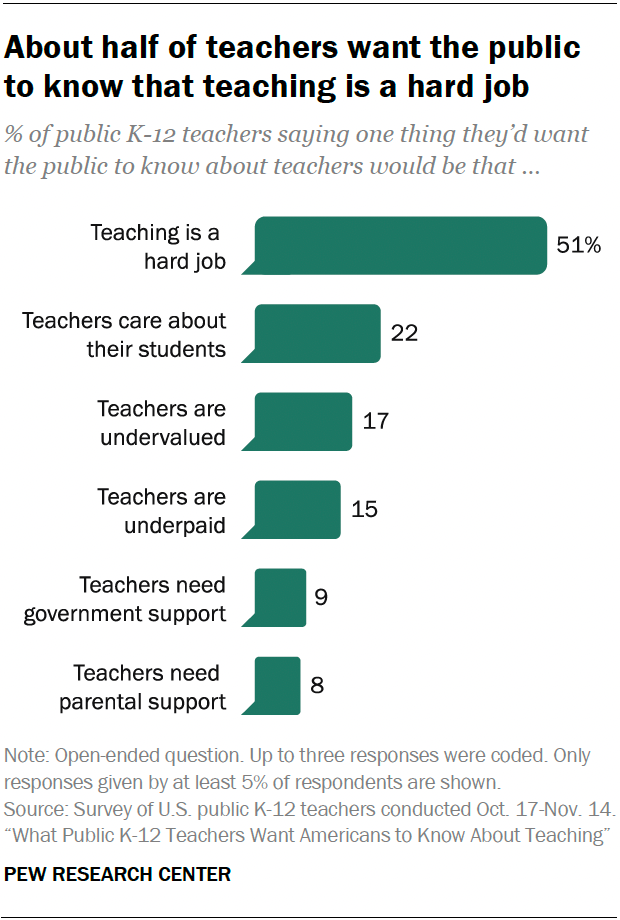
Pew Research Center conducted this analysis to better understand what public K-12 teachers would like Americans to know about their profession. We also wanted to learn how the public thinks about teachers.
For the open-end question, we surveyed 2,531 U.S. public K-12 teachers from Oct. 17 to Nov. 14, 2023. The teachers surveyed are members of RAND’s American Teacher Panel, a nationally representative panel of public K-12 school teachers recruited through MDR Education. Survey data is weighted to state and national teacher characteristics to account for differences in sampling and response to ensure they are representative of the target population.
Overall, 96% of surveyed teachers provided an answer to the open-ended question. Center researchers developed a coding scheme categorizing the responses, coded all responses, and then grouped them into the six themes explored in the data essay.
For the questions for the general public, we surveyed 5,029 U.S. adults from Nov. 9 to Nov. 16, 2023. The adults surveyed are members of the Ipsos KnowledgePanel, a nationally representative online survey panel. Panel members are randomly recruited through probability-based sampling, and households are provided with access to the Internet and hardware if needed. To ensure that the results of this survey reflect a balanced cross section of the nation, the data is weighted to match the U.S. adult population by gender, age, education, race and ethnicity and other categories.
Here are the questions used for this analysis , along with responses, the teacher survey methodology and the general public survey methodology .
Most of the responses to the open-ended question fell into one of these six themes:
Teaching is a hard job
About half of teachers (51%) said they want the public to know that teaching is a difficult job and that teachers are hardworking. Within this share, many mentioned that they have roles and responsibilities in the classroom besides teaching, which makes the job stressful. Many also talked about working long hours, beyond those they’re contracted for.
“Teachers serve multiple roles other than being responsible for teaching curriculum. We are counselors, behavioral specialists and parents for students who need us to fill those roles. We sacrifice a lot to give all of ourselves to the role as teacher.”
– Elementary school teacher
“The amount of extra hours that teachers have to put in beyond the contractual time is ridiculous. Arriving 30 minutes before and leaving an hour after is just the tip of the iceberg. … And as far as ‘having summers off,’ most of August is taken up with preparing materials for the upcoming school year or attending three, four, seven days’ worth of unpaid development training.”
– High school teacher
Teachers care about their students
The next most common theme: 22% of teachers brought up how fulfilling teaching is and how much teachers care about their students. Many gave examples of the hardships of teaching but reaffirmed that they do their job because they love the kids and helping them succeed.

“We are passionate about what we do. Every child we teach is important to us and we look out for them like they are our own.”
– Middle school teacher
“We are in it for the kids, and the most incredible moments are when children make connections with learning.”
Teachers are undervalued and disrespected
Some 17% of teachers want the public to know that they feel undervalued and disrespected, and that they need more public support. Some mentioned that they are well-educated professionals but are not treated as such. And many teachers in this category responded with a general plea for support from the public, which they don’t feel they’re getting now.
“We feel undervalued. The public and many parents of my students treat me and my peers as if we do not know as much as they do, as if we are uneducated.”
“The public attitudes toward teachers have been degrading, and it is making it impossible for well-qualified teachers to be found. People are simply not wanting to go into the profession because of public sentiments.”
Teachers are underpaid
A similar share of teachers (15%) want the public to know that teachers are underpaid. Many teachers said their salary doesn’t account for the effort and care they put into their students’ education and believe that their pay should reflect this.

“We are sorely underpaid for the amount of hours we work and the education level we have attained.”
Teachers need support and resources from government and administrators
About one-in-ten teachers (9%) said they need more support from the government, their administrators and other key stakeholders. Many mentioned working in understaffed schools, not having enough funding and paying for supplies out of pocket. Some teachers also expressed that they have little control over the curriculum that they teach.
“The world-class education we used to be proud of does not exist because of all the red tape we are constantly navigating. If you want to see real change in the classroom, advocate for smaller class sizes for your child, push your district to cap class sizes at a reasonable level and have real, authentic conversations with your child’s teacher about what is going on in the classroom if you’re curious.”
Teachers need more support from parents
Roughly the same share of teachers (8%) want the public to know that teachers need more support from parents, emphasizing that the parent-teacher relationship is strained. Many view parents as partners in their child’s education and believe that a strong relationship improves kids’ overall social and emotional development.

“Teachers help students to reach their potential. However, that job is near impossible if parents/guardians do not take an active part in their student’s education.”
How the U.S. public views teachers
While the top response from teachers in the open-ended question is that they want the public to know that teaching is a hard job, most Americans already see it that way. Two-thirds of U.S. adults say being a public K-12 teacher is harder than most other jobs, with 33% saying it’s a lot harder.
And about three-quarters of Americans (74%) say teachers should be paid more than they are now, including 39% who say teachers should be paid a lot more.
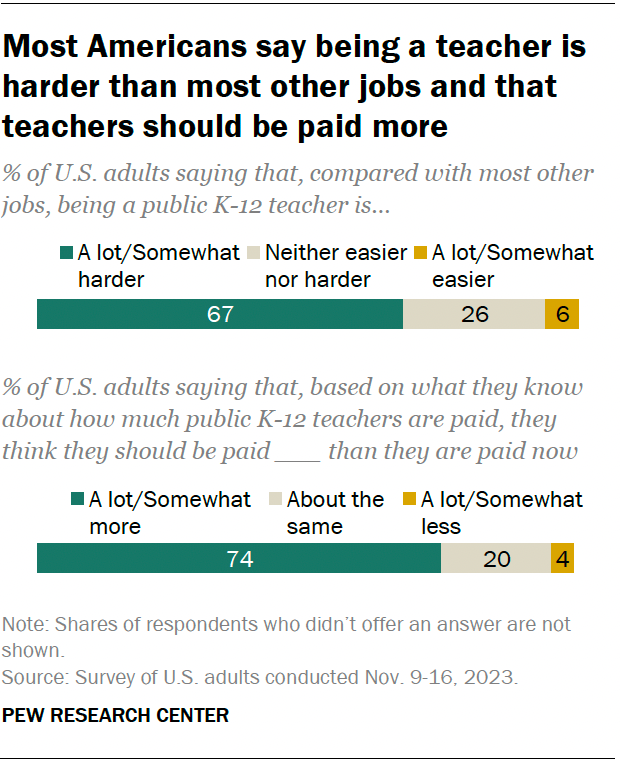
Americans are about evenly divided on whether the public generally looks up to (32%) or down on (30%) public K-12 teachers. Some 37% say Americans neither look up to or down on public K-12 teachers.
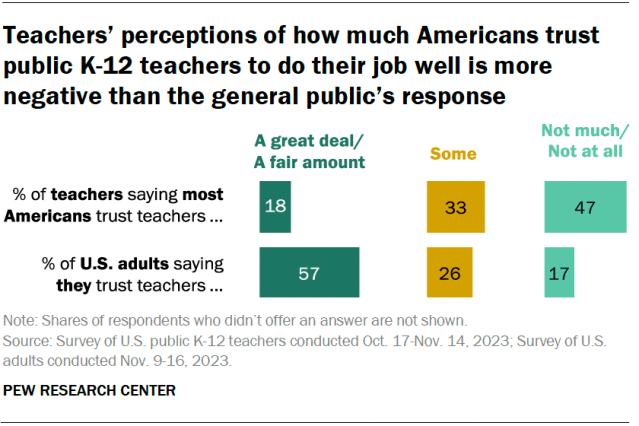
In addition to the open-ended question about what they want the public to know about them, we asked teachers how much they think most Americans trust public K-12 teachers to do their job well. We also asked the public how much they trust teachers. Answers differ considerably.
Nearly half of public K-12 teachers (47%) say most Americans don’t trust teachers much or at all. A third say most Americans trust teachers some, and 18% say the public trusts teachers a great deal or a fair amount.
In contrast, a majority of Americans (57%) say they do trust public K-12 teachers to do their job well a great deal or a fair amount. About a quarter (26%) say they trust teachers some, and 17% say they don’t trust teachers much or at all.
Related: About half of Americans say public K-12 education is going in the wrong direction
How the public’s views differ by party
There are sizable party differences in Americans’ views of teachers. In particular, Democrats and Democratic-leaning independents are more likely than Republicans and Republican leaners to say:
- They trust teachers to do their job well a great deal or a fair amount (70% vs. 44%)
- Teaching is a lot or somewhat harder when compared with most other jobs (77% vs. 59%)
- Teachers should be paid a lot or somewhat more than they are now (86% vs. 63%)
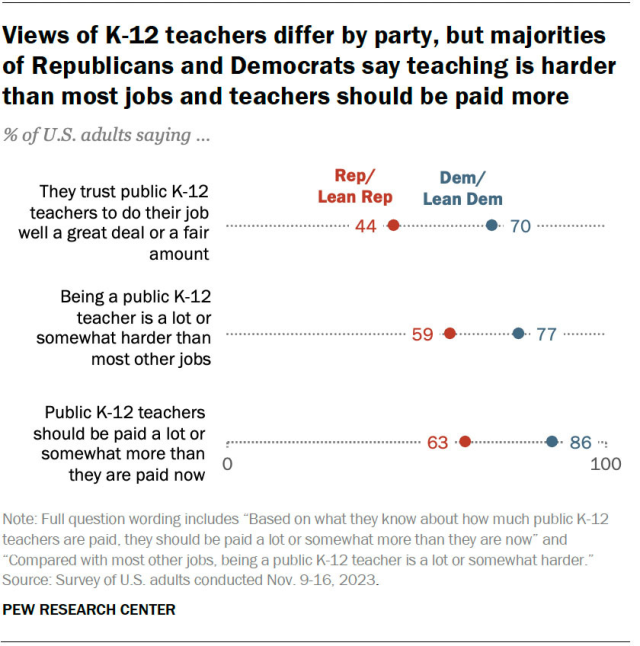
In their own words
Below, we have a selection of quotes that describe what teachers want the public to know about them and their profession.
Social Trends Monthly Newsletter
Sign up to to receive a monthly digest of the Center's latest research on the attitudes and behaviors of Americans in key realms of daily life
About Pew Research Center Pew Research Center is a nonpartisan fact tank that informs the public about the issues, attitudes and trends shaping the world. It conducts public opinion polling, demographic research, media content analysis and other empirical social science research. Pew Research Center does not take policy positions. It is a subsidiary of The Pew Charitable Trusts .
UCF Graduate Programs Reach New Heights in U.S. News Rankings Through Research Excellence, Impactful Community Engagement
UCF’s emergency management program ranks No. 1 in the nation, and programs in education and public affairs climbed in U.S. News & World Report ’s Best Graduate Schools rankings.
By Mark Schlueb ’93 ’21MA | April 9, 2024

UCF is a leading metropolitan research university known for helping students unleash their potential and advancing innovation in our community and state. Led by world-class faculty members with unrivaled industry experience, UCF’s graduate programs continue to earn top national recognitions for accomplishing those goals and more.
More than 9,000 UCF students enroll in UCF’s graduate programs to advance their careers or launch new ones. And many are thriving on campus and after graduation in programs ranked among the best in the nation.
U.S. News & World Report has recognized UCF’s exceptional faculty and graduate programs in its 2024 list of Best Graduate Schools. UCF’s emergency management program ranks No. 1 in the nation, and four programs rank in the top 25. Nine graduate programs placed in the top 50 nationally, including five in public affairs, three in education and one in health. U.S. News will release rankings for the engineering and medicine categories at a later date.
“UCF’s world-class faculty excel at providing our graduate students with the knowledge and skills they need to thrive as innovative leaders and creators,” says President Alexander N. Cartwright. “The U.S. News rankings demonstrate that our students graduate well-prepared to unleash their potential in individual, business, and government sectors that are growing in Florida and vital to our economy, health, and quality of life.”

UCF Grads Shape Emergency Responses Nationwide
UCF has a proven track record in emergency management. The university’s Master of Emergency and Crisis Management program — which is offered the College of Community Innovation and Education — has climbed the rankings over seven consecutive years. The homeland security program and its faculty researchers enable students to navigate increasingly complex manmade and natural disasters, while learning from past disasters to improve their preparedness and response in the future.
Graduates of the program go on to become leaders in directing and implementing emergency responses in Florida and throughout the country, including in Boston and Washington, D.C. They are saving lives, helping communities prepare as well as possible to navigate disasters, and putting into practice the lessons they learned from outstanding faculty who contribute to national research and regional solutions related to crises .
“Our students are equipped to assist communities and organizations in every phase of emergency management — from preparedness and mitigation to response and recovery,” says Claire Connolly Knox, professor in UCF’s School of Public Administration.
“We are thrilled to be ranked No. 1 and nationally recognized again as a leader in emergency and crisis management,” she adds. “This honor highlights the innovative and community-focused research by our faculty and continuous engagement with community partners invested in our outstanding students and alumni.”
Other highlights include:
- 12 in Education — Student Counseling and Personnel Services
- 15 in Public Affairs — Nonprofit Management, up three spots since last year
- 21 in Public Affairs — Public Management and Leadership, up five spots since last year
- 27 in Public Affairs — Public Finance and Budgeting
- 32 in Education — Curriculum and Instruction
- 41 in Health — Physical Therapy
- 42 in Best Education Schools, up four spots since last year
- 47 in Public Affairs
- 59 in Nursing — Doctor of Nursing Practice
UCF’s many strong rankings are a testament to the excellence of UCF’s faculty, who bring to the classroom extensive experience in academia, industry and research, as well as to the university’s commitment to help students unleash their potential in a culture focused on collaboration and finding solutions that benefit our society.
UCF students who have graduated from the nonprofit management program have gone on to make a big impact by helping communities in Florida and beyond. In one example, more than 12 years ago, program graduate Eric Camarillo ’16 ’19MNM launched faith-based nonprofit organization SALT Outreach Inc. in Central Florida to help provide services to the homeless, including mobile shower trailers, laundry, clothing, haircuts, mail services and help with employment. SALT has grown to more than 30 staff members who help hundreds of people every day.
“Throughout the School of Public Administration, our faculty, staff and advisory boards have worked hard to ensure we are offering students in Central Florida, across the country and around the globe a world-class, innovative education,” says Doug Goodman, professor and school director. “We are honored to be recognized as leaders in emergency management, nonprofit management, public leadership management and public finance and budgeting, fields that are critical to the health and well-being of our citizens and the success of our communities.”
The Best Graduate Education Schools category includes graduate-level educator preparation and advancement programs, such as teacher education, school counseling and psychology, educational leadership, and curriculum and instruction, all offered through the College of Community Innovation and Education. The college offers graduate students numerous opportunities to collaborate closely with expert faculty, from receiving mentorship and support in research and scholarship to engaging in robust internships and field experiences with school district, nonprofit and agency partners. Some faculty members also lead federally funded projects that offer tuition assistance and prepare students to work with students in high-need schools.
UCF’s continued rise has also drawn praise from other outlets:
- In February, U.S. News & World Report released its best online program national rankings, which placed UCF tied at No. 7 in the nation for best online bachelor’s programs. Of the 14 UCF national rankings from U.S. News , six online programs made the top 10, two made the top 15 and three were in the top 50. UCF has ranked in the top 20 overall Best Online Programs for the past seven years.
- In March, The Princeton Review and PC Gamer recognized UCF’s game design programs among the best in the world. The graduate Florida Interactive Entertainment Academy is ranked No. 1 in the world for the fourth time in five years. The undergraduate game design program, Games and Interactive Media (GaIM) in UCF’s Nicholson School of Communication and Media, achieved its highest ranking ever, advancing to No. 5 in the world.
- Sports Business Journal named Orlando the No. 1 Best Sports Business City for event hosting, including the NBA, Orlando City and Orlando Pride Soccer, the nation’s premier tennis center, college football bowl games, the NFL Pro Bowl, U.S. Olympic Marathon Trials, the Arnold Palmer Invitational — and, of course, the UCF Knights. With its inaugural season in the Big 12 Conference in 2023, UCF has skyrocketed to unprecedented success as the youngest Power Four program in the country. With one of the country’s top graduate sports business programs , UCF has also provided a pipeline of talented graduates to some of the nation’s biggest sports brands.
More Topics
Pegasus magazine.

Founded to help fuel talent for the nearby space industry , UCF continues to build its reputation as SpaceU. Here's a look at the early days of UCF's space ties and journey to new frontiers.


IMAGES
VIDEO
COMMENTS
Qualitative Research Topics in Education. Check out qualitative research topics in education:-Teaching Methods and Strategies. Learning Through Doing: How Inquiry-Based Lessons Boost Student Smarts Over Time. Math with a Twist: A Tech-Infused Adventure in High School Algebra. Level Up! Gamifying Science Class for Maximum Student Thrills.
Qualitative Research Topics. Qualitative Research Topics are as follows: Understanding the lived experiences of first-generation college students. Exploring the impact of social media on self-esteem among adolescents. Investigating the effects of mindfulness meditation on stress reduction. Analyzing the perceptions of employees regarding ...
2. Relevance: Ensure that your chosen topic is relevant to your field of study or the discipline you are working within.It should contribute to existing knowledge or address a meaningful research gap. 3. Research Gap Identification: Review relevant literature and research to identify gaps or areas where there is limited qualitative research. Look for unanswered questions or underexplored ...
Here are fantastic examples of qualitative research titles: Female harm: how it is influenced by culture. The socioeconomic impacts of free education. The link between food insecurity and poor performance in schools. Alcoholism among college students: a critical study. How to mitigate child labor in our society.
Educational Qualitative Research Topics. Food insecurity and child education. Understanding adult learning. The efficient learning style for autistic children. The importance of computer literacy. The importance of mental health education in the school curriculum. The effects of alcoholism on education. How does virtual learning affect high ...
Engineering Qualitative Research Topics For STEM Students. Ethics in Artificial Intelligence and Robotics. Human-Centered Design in Engineering. Innovation and Sustainability in Civil Engineering. Public Perception of Self-Driving Cars. Engineering Solutions for Climate Change Mitigation.
Qualitative research is a method of inquiry that explores and understands complex phenomena by examining the subjective experiences, perspectives, and behaviors of individuals and groups. It is a way to dive into the richness and depth of human experiences, providing insights that go beyond numbers and statistics.
Updated 11 Mar 2024. Qualitative research is a method of inquiry employed in various academic disciplines, traditionally in the social sciences, but also in market research and further contexts. This type of research is designed to provide a deep understanding of human behavior and the reasons that govern such behavior.
A comprehensive list of research topics and ideas in education, along with a list of existing dissertations & theses covering education. ... It is the best platform for research related items. Reply. Trishna Roy on March 15, ... I would like to request a topic based on school major in social studies. Reply. Mercedes Bunsie on July 5, 2023 at 8: ...
Here are research topics for qualitative research in project management. How effective communication strategies can impact the outcome of a project. How different leadership styles affect team productivity during a project. The role of conflict management in ensuring successful project outcomes. Gender differences in the perception and ...
Qualitative Research Topics: Psych, Education, Health, Medicine & More. Wandering around the internet looking for qualitative research topics can be exhausting. We are writing this article to make it a one-stop solution for you. There is enough inspiration to come up with the most suitable topic for you, no matter your academic area.
Handbook of qualitative research in education by Michael R. M. Ward (Ed.); Sara Delamont (Ed.) Publication Date: 2020. This updated second edition extends the discussions surrounding the key qualitative methods used in contemporary educational research. Featuring comprehensive coverage of research across all stages of education, it provides ...
Qualitative research involves collecting and analyzing non-numerical data (e.g., text, video, or audio) to understand concepts, opinions, or experiences. It can be used to gather in-depth insights into a problem or generate new ideas for research. Qualitative research is the opposite of quantitative research, which involves collecting and ...
contexts. Qualitative research methods play an important role in program evaluation, especially with a focus on research contextualization, but often they are considered "second class" when compared to quantitative evaluations. When researchers want to know 'what works', quantitative
Here are some qualitative research topics lists in political science. How COVID-19 impacts low-income neighborhoods. The need for the cancellation of student loans and not the suspension of student loans. Racism as a dividing factor in America. Segregation and racist laws.
Qualitative research draws from interpretivist and constructivist paradigms, seeking to deeply understand a research subject rather than predict outcomes, as in the positivist paradigm (Denzin & Lincoln, 2011).Interpretivism seeks to build knowledge from understanding individuals' unique viewpoints and the meaning attached to those viewpoints (Creswell & Poth, 2018).
Here are some of the top 10 research topics and research areas for students. Whether in high school, senior high school, or college, these topics are important and relevant for students today. You might use these ideas as starting points for your own original research topics and research questions. 1. High school research paper topic ideas
List of Best Qualitative Research Topics For High School Students. Here are teh Qualitative Research Topics For High School Students: Social Media and Self-Identity: With the rise of social media platforms, teenagers are navigating new realms of self-expression and connection. Qualitative research can explore how high school students use social ...
Prepare a research paper on self-education. Discuss how the world would benefit from the same education system. Write about education in the 21 st. Explain how to improve the learning capabilities of ADHD students. Discuss the role of patriotic education in the life of youths. Examine the folk traditions in education.
Qualitative research methodology is not a single method, but instead offers a variety of different choices to researchers, according to specific parameters of topic, research question, participants, and settings. The method is the way you carry out your research within the paradigm of quantitative or qualitative research.
In this Rip Out, we describe 3 different qualitative research approaches commonly used in medical education: grounded theory, ethnography, and phenomenology. Each acts as a pivotal frame that shapes the research question (s), the method (s) of data collection, and how data are analyzed. 4, 5. Go to:
Research Topics: Well-Being of School Teachers in Their Work Environment. Closure and Reopening of Schools and Universities During the COVID-19 Pandemic: Prevention and Control Measures, Support Strategies for Vulnerable Students and Psychosocial Needs. Learning in times of COVID-19: Students', Families', and Educators' Perspectives.
(SACRAMENTO) The Betty Irene Moore School of Nursing at UC Davis ranks among the top 25 best master's-degree nursing programs for the fourth year in a row, according to U.S. News & World Report's 2024 Best Graduate Schools.. The publication today released its annual report and ranked the school's Master's Entry Program in Nursing as No. 24, tied with one other school.
How the U.S. public views teachers. While the top response from teachers in the open-ended question is that they want the public to know that teaching is a hard job, most Americans already see it that way. Two-thirds of U.S. adults say being a public K-12 teacher is harder than most other jobs, with 33% saying it's a lot harder.
More than 9,000 UCF students enroll in UCF's graduate programs to advance their careers or launch new ones. And many are thriving on campus and after graduation in programs ranked among the best in the nation. U.S. News & World Report has recognized UCF's exceptional faculty and graduate programs in its 2024 list of Best Graduate Schools ...